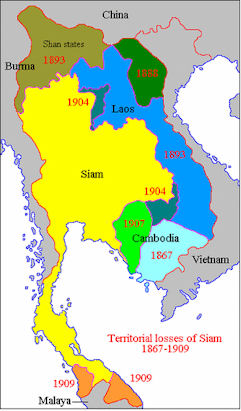
Chronik Thailands
กาลานุกรมสยามประเทศไทย
von
Alois Payer
Chronik 2006 / B. E. 2549
2. Januar bis Juni
Zitierweise / cite as:
Payer, Alois <1944 - >:
Chronik Thailands = กาลานุกรมสยามประเทศไทย. -- Chronik 2006 / B. E. 2549. --
2. Januar bis Juni. -- Fassung vom
2017-03-21. -- URL:
http://www.payer.de/thailandchronik/chronik2006b.htm
Erstmals publiziert: 2012-11-09
Überarbeitungen: 2017-03-21
[Ergänzungen] ; 2016-12-31 [Ergänzungen] ; 2016-11-12 [Ergänzungen] ; 2016-03-25 [Ergänzungen] ; 2016-03-16 [Ergänzungen] ; 2016-01-18 [Ergänzungen] ; 2015-10-02 [Ergänzungen] ; 2015-01-18 [Ergänzungen] ; 2014-11-03 [Ergänzungen] ; 2014-02-27 [Ergänzungen] ; 2014-02-19 [Ergänzungen] ; 2013-04-29 [Ergänzungen] ; 2013-04-25
[Teilung des Jahrgangs]; 2013-04-21 [Ergänzungen]; 2013-04-10 [Ergänzungen]; 2013-03-30 [Ergänzungen]; 2013-03-24 [Ergänzungen]; 2013-03-09 [Ergänzungen]; 2013-03-07 [Ergänzungen]; 2013-03-02 [Ergänzungen]; 2013-02-13 [Ergänzungen]; 2013-02-13 [Ergänzungen]; 2013-01-13 [Ergänzungen]; 2012-11-13 [Ergänzungen]
©opyright: Dieser Text steht der Allgemeinheit zur Verfügung. Eine Verwertung in Publikationen, die über übliche Zitate hinausgeht, bedarf der ausdrücklichen Genehmigung des Herausgebers.
Dieser Text ist Teil der Abteilung
Thailand von
Tüpfli's Global Village Library
ช้างตายทั้งตัวเอาใบบัวปิดไม่มิด
|

Gewidmet meiner lieben Frau
Margarete Payer
die seit unserem ersten Besuch in Thailand 1974
mit mir die Liebe zu den und die Sorge um die Bewohner Thailands teilt. |
 Vorsicht
bei den Statistikdiagrammen! Vorsicht
bei den Statistikdiagrammen!
Bei thailändischen Statistiken muss man mit allen Fehlerquellen rechnen, die in
folgendem Werk beschrieben sind:
Morgenstern, Oskar <1902 - 1977>: On the accuracy of
economic observations. -- 2. ed. -- Princeton : Princeton Univ.
Press, 1963. -- 322 S. ; 20 cm.
Die Statistikdiagramme geben also meistens eher qualitative als
korrekte quantitative Beziehungen wieder.
|
2549 / 2006 Januar bis Juni
2006-01-05
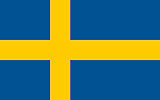
Schaffung der Website:
http://www.puloinfo.net/ der Patani
United Liberation Organisation (PULO / Pertubuhan Pembebasan Patani Bersatu).
Sitz der Website ist in Schweden.
2006-01-16 - 2006-01-20
Ministerpräsident Thaksin ist unterwegs bei den
Bauern in der Provinz Roi Et (ร้อยเอ็ด). Seine Tour wird im Fernsehen
in "Backstage Show: Prime Minister" übertragen.
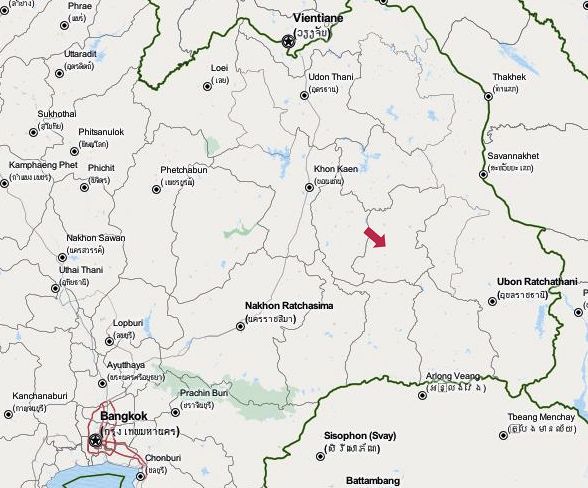
Abb.: Lage der Provinz Roi Et (ร้อยเอ็ด)
[Bildquelle: OpenStreetMap. --
Creative
Commons Lizenz (Namensnennung, share alike)]
2006-01-19
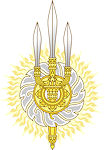
Die einzige objektive, gut recherchierte, wohlwollende Biographie König
Bhumibols wird in Thailand verboten:
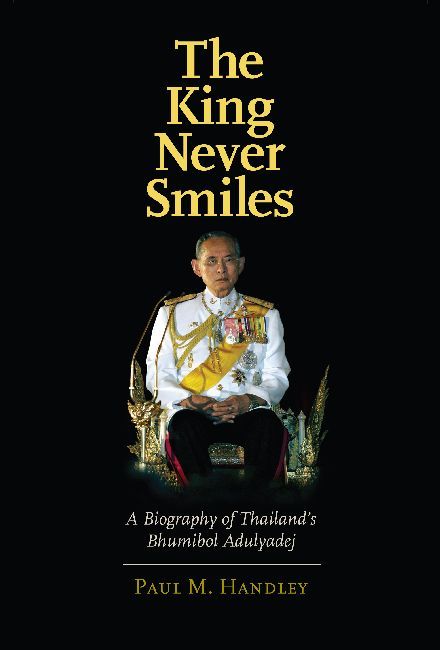
Abb.: Umschlagtitel
Handley, Paul M. <1955 - >: The king never smiles : a
biography of Thailand’s Bhumibol Adulyadej. -- New Haven : Yale
University Press, ©2006. -- 499 S. ; 24
cm. -- ISBN: 9780300106824
| "The King Never Smiles is an unauthorized
biography of Thailand's King Bhumibol Adulyadej (ภูมิพลอดุลยเดช) by Paul M. Handley, a
freelance journalist who lived and worked as a foreign correspondent in
Thailand. It is published by Yale University Press and was released in 2006.
The book was banned in Thailand before publication, and the Thai authorities
have blocked local access to websites advertising the book.
Book summary
The publicity materials at the Yale University Press
website originally described the book as telling "the unexpected story of
(King Bhumibol Adulyadej's) life and 60-year rule — how a Western-raised boy
came to be seen by his people as a living Buddha, and how a king widely seen
as beneficent and apolitical could in fact be so deeply political,
autocratic, and even brutal... Blasting apart the widely accepted image of
the king as egalitarian and virtuous, Handley convincingly portrays an
anti-democratic monarch who, together with allies in big business and the
murderous, corrupt Thai military, has protected a centuries-old, barely
modified feudal dynasty."
The New York Times noted the book "presents a
direct counterpoint to years of methodical royal image-making that projects
a king beyond politics, a man of peace, good works and Buddhist humility."
and, "The book describes [the King's only son], Vajiralongkorn (สมเด็จพระบรมโอรสาธิราช
เจ้าฟ้ามหาวชิราลงกรณฯ สยามมกุฎราชกุมาร), as a willful
man prone to violence, fast cars and dubious business deals."
Censorship
in ThailandWell before its release, in January 2006, the Thai
Information and Communications Ministry (กระทรวงเทคโนโลยีสารสนเทศและการสื่อสาร) banned access to the book and
blocked access from Thailand to the book's page on the Yale University Press
website and at Amazon.com.
In a statement dated 19 January 2006, Thai National Police Chief General
Kowit Wattana (โกวิท วัฒนะ,
1947 - ) said the book has "contents which could affect national
security and the good morality of the people."
On 19 July 2006, ThaiDay, an English-language
Thai paper, reported that the Thai government made great efforts to suppress
the book, even contacting former American president George H. Bush and the
president of Yale University, Richard C. Levin, to enlist their help.
In February 2007, the Chula Book Centre, the main
bookstore of state-run Chulalongkorn University, removed Chulalongkorn
University (จุฬาลงกรณ์มหาวิทยาลัย) professor Giles Ungphakorn's
(ใจ อึ๊งภากรณ์, 1953 - ) 2007 book A Coup for the Rich
from its shelves after a manager of the book store found that it listed
The King Never Smiles as a reference. State-run Thammasat University (มหาวิทยาลัยธรรมศาสตร์)
Bookstore quickly followed suit, refusing to sell the book on March 6.
However, Thammasat University's rector later reversed this decision and
ordered the university bookstore to sell the book.
In October 2011, Thai-born American Joe Gordon was
sentenced to two and a half years in prison by a Bangkok judge for defaming
the royal family by translating sections of the book into Thai and posting
them online. The judgement caused international concern as Gordon had
published the extracts several years previously while living in Colorado and
was detained only after returning to Thailand in May 2011 to seek medical
treatment.
Dueling
biographersThe Handley book was published
six years after the first biography of King Bhumibol, The Revolutionary
King by William Stevenson 1925- ).
Handley commented on Stevenson's book, pages 437-439 of The King Never
Smiles:
"Ten years earlier, Bhumibol had invited William
Stevenson, the author of the original Intrepid, to write the book.
Stevenson lodged in the princess mother's Srapathum Palace (วังสระปทุม) and was
provided research support and unprecedented interviews with court
staff and the king himself ... The result was a book that presents Bhumibol as truly inviolate, magical, and godly ... the book is
chock-full of the standard Ninth Reign mythology, matching the view
of the palace and royal family projected in Thai publications ...
When it came out, the book proved a misadventure. Stevenson was
liberal with style and careless with facts to the point of
embarrassing the palace. His errors were legion. The book opened
with a map that showed Thailand in possession of significant
portions of Laos and Burma, and put the king's Hua Hin palace 300
kilometers and a sea away from where it should be. It ended with a
genealogical chart naming Rama VII as the son of his brother Rama VI
... (But) Thousands of copies circulated in Thailand, and the
general reaction was to castigate the author's failings while not
questioning the essence of his story, the magical and sacral
monarchy of Bhumibol Adulyadej."
—Paul M. Handley
Stevenson reviewed the Handley book in the Asian
Wall Street Journal and the Wall Street Journal Online (June 16,
2006):
"Thais dislike seeing in print careless
references to their king, Bhumibol Adulyadej, the reigning Ninth
Rama of the Chakri dynasty. The king is venerated as a guardian of
ancient traditions that are believed to have saved the Thai people
from imperialists, communists and neocolonialists. They will
disapprove of Paul Handley's gossipy, unfair account of this
apotheosized man, the world's longest-reigning monarch. Mr. Handley
casts the king as an enemy of democracy who, to solidify his
once-shaky authority, allied himself with scheming generals and
crooked politicians. None of this can be supported by the facts ...
Mr. Handley focuses more upon the king's allegedly Machiavellian
virtues than his spiritual ones. He writes, 'Bhumibol's restoration
of the power and prestige of the throne was ... the fruit of a
plodding, determined, and sometimes ruthless effort by diehard
princes to reclaim their birthright, [and] Bhumibol's unquestioning
commitment to the restoration under their tutelage.' ... Mr. Handley
has largely turned King Bhumibol's story into a political screed to
suit the prejudices of those with a stake in sidelining the monarch."
—William Stevenson
Critical
reception
International
reception
The book has had a generally positive reception among
international critics and scholars. The New York Review of Books
called it, "one of the most important books on Thailand to appear in
English." It further noted that, "The originality of Handley's book lies in
his tough but I think fair-minded analysis of the revival of royal authority
under King Bhumibol."
In a review in the New Left Review, Duncan
McCargo (1963 - ), a lecturer from the University of Leeds who wrote several articles
on the "network monarchy" of Bhumibol and his proxies, called The King
Never Smiles an "important book," that was, "fluently written and
grounded in very considerable research." McCargo said that while Handley's
account, "draws on insights into the Thai monarchy from a range of scholars
and writers, including Christine Gray, Kobkua Suwannathat-Pian (1944 - ) and MR
Sukhumbhand Paripatra (สุขุมพันธุ์
บริพัตร, 1952 - )," his narrative, "moves far beyond the parameters of
these precursors. It has a salience and an urgency well beyond that of any
ordinary biography..." McCargo praised Handley's "understanding of Bhumibol
as a political actor, as the primary architect of a lifelong project to
transform an unpopular and marginalized monarchical institution—on the verge
of abolition more than once—into the single most powerful component of the
modern Thai state." McCargo also praised Handley's "brilliantly intuitive
grasp of the seedy interplay between money and power," regarding the
workings of the Crown Property Bureau (สำนักงานทรัพย์สินส่วนพระมหากษัตริย์). In addition, McCargo noted Handley's
"evident empathy with his subject."
Thai
receptionCritical reception in Thailand varied. Royalist Thai
media tycoon and talk-show host Sondhi Limthongkul (สนธิ
ลิ้มทองกุล /
林明達,
1947 - ) informally criticized the
book as "full of gossip" and called Paul Handley "aggressive", "highhanded",
"sassy", "derogatory to Asians", and "insolent even to his own parents".
Chris Baker (1948 - ), an independent academic residing in
Thailand who wrote a report praising Bhumibol's self-sufficient economy
theories for the United Nations, reviewed the book in the Asia Sentinel.
Baker praised the book, but said that in its later chapters, it ignored the
role of the Thai elite and middle class in reimagining Bhumibol as a symbol
of democracy.
Baker said that the middle class was key in "rewriting history to cast the
king as a peace-maker in 1973 and 1992, glossing over 1976 altogether, and
ignoring the 1932 revolution to make democracy seem to be a gift from the
throne."
Baker also said that the section of the book covering the 2005-2006
political crisis (which was still occurring at the time of the book's
publication) included unspecified errors and failed to explain why various
groups seized on the monarchy as the focus of opposition to the government
of Thaksin Shinawatra (ทักษิณ ชินวัตร).
Baker said that although the book introduced little that was new for experts,
it did bring everything together, including many obscure sources, in a way
that "connects the dots of a complex and important story with great
narrative skill and very elegant prose."
Furthermore, he said that the book did not "stray off to imagine what is
going on in the king's mind."
He noted that the book was "far from perfect," but was still "streets ahead
of the competition, especially the hilariously error-prone effort of William
Stevenson seven years ago."
Socialist activist and political scientist Giles
Ungphakorn (ใจลส์ ใจ อึ๊งภากรณ์) reviewed the book for Prachatai
(ประชาไท) online newspaper (his brother,
Jon Ungpakorn - จอน อึ๊งภากรณ์ - was the Secretary General of the foundation that ran the
online newspaper). In his review, he praised the book for its evidence-backed
analysis while disagreeing with some major points in the book. He stated
that Handley underestimated the historical importance of the popular
movement in Thailand, for instance by writing that the 1932 revolution was
led by a foreign educated elite that was not accompanied by a popular
uprising among the rural population. Giles noted that this view was
different from that of political scientist Nakharin Mekhtrairat (นครินทร์
เมฆไตรรัตน), who claimed
there was strong pressure within the mainstream Thai society of the time to
overthrow the absolute monarchy. Giles also said that the book's analysis of
the weakening of the Thai military dictatorship during the late 1970s
overemphasized the importance of Bhumibol, Army Commander Krit Srivara (, and
Richard Nixon's diplomacy with Communist China, while not placing enough
importance on the role of students and workers. Giles stated that Handley's
view that dictator Sarit Thanarat (สฤษดิ์ ธนะรัชต์) was a tool for King Bhumibol was not that
of political scientist Thak Chaloemtiarana (ทักษ์ เฉลิมเตียรณ), who felt the opposite was true:
Sarit used King Bhumibol as a tool to increase his own credibility.
Giles also disagreed regarding Bhumibol and the
royalists' intended role for the monarchy. According to Giles, the book said
that the royalists wanted to create a system whereby the state would be
ruled by a traditional dhammaraja (monarch who rules with dharma)
that would play a significant role in shaping policy. Giles said this view
differed from that of political scientist Thongchai Winichakul (ธงชัย
วินิจจะกูล). According to
Giles, Thongchai found that after the 1945, the royalists were completely
resigned to the loss of the absolute monarchy and focused on building a
constitutional framework for the monarchy. Giles also said that Handley's
view disagreed with Kullada Kesboonchoo-Mead's (กุลลดา
เกษบุญชู-มี๊ด). Kullada held that the
absolute monarchy had been completely discredited in Thailand as a viable
political philosophy.
According to Giles, the book claimed that Bhumibol
actively and consistently distrusted democracy and democratically elected
leaders. However, Giles said Bhumibol was never powerful enough or
independent enough to take a firm stand on the matter. Said Giles, the
monarchy was not sufficiently powerful as an institution to prevent its
interests from being sidelined by those of the military, the police, and the
bureaucracy.
Publication
historyThe book was commercially successful.
By October 2006, the book went through three printings. Although the book was banned in Thailand, samizdat
photocopies of the book were available for sale in the Tha Phrachan (ท่าพระจันทร์) area of
Bangkok. Unauthorized translations of sections of the book
appeared on several websites,
although some sites were blocked by censors."
[Quelle:
http://en.wikipedia.org/wiki/The_King_Never_Smiles. -- Zugriff
am 2012-01-08]
|
2006-01-23
Die Kinder von Ministerpräsident Thaksin verkaufen
ihren Anteil an Shin Corp (ชิน คอร์ปอเรชั่น) für
73 Milliarden Baht an Temasek Holdings (淡马锡控股) in
Singapur. Der Verkauf ist gemäß den geltenden Gesetzen steuerfrei.

Abb.: ®Logo
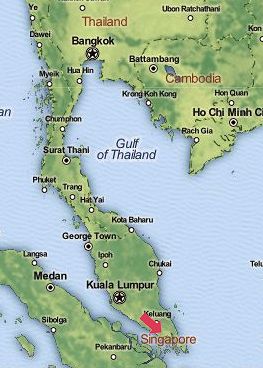
Abb.: Lage von Singapur
[Bildquelle: OpenStreetMap. --
Creative
Commons Lizenz (Namensnennung, share alike)]
| "The 2006 sale of the Shinawatra family's share of
Shin Corporation (ชิน คอร์ปอเรชั่น) to Temasek Holdings(淡马锡控股) caused great controversy in
Thailand. The sale was in response to long-standing criticisms that the
Shinawatra family's holdings created a conflict of interest for Thai Prime
Minister Thaksin Shinawatra (ทักษิณ ชินวัตร). Criticisms of the sale focused on the
allegations by Thaksin and a compliant government that the transaction was
exempt from capital gains tax (as per Revenue Department and Stock Exchange
of Thailand regulations - later determined by Thai courts not to be legal),
the fact that the Thai company was sold to a Singaporean company, and the
fact that the Thai law regarding foreign investments in the telecom sector
had been amended just prior to the sale (although the amendment had been
proposed since 2001). Thaksin's sale also impacted holdings, among other
parties, of the Crown Property Bureau (สำนักงานทรัพย์สินส่วนพระมหากษัตริย์) that has investment in the Siam
Commercial Bank (ธนาคารไทยพาณิชย์) that held ShinCorp stock.
The sale of Shin Corporation to Temasek Holdings
On 23 January 2006, the Thai Telecommunication Act (2006)
became effective, raising the limit on foreign holdings in telecom companies
to 49%. The Act replaced the Telecom Business Law, which took effect in
November 2001, and put the foreign investment cap at 25%. At the time, AIS
was the only company that actually complied with this provision. Competitors
DTAC and TA Orange were 40% owned by Norway’s Telenor and 49%-owned by
France's Orange. Although the law was not retroactive, DTAC and TA Orange
criticized the government for discriminating against foreign investors and
urged it to increase the cap.
On Monday January 23, 2006, the Shinawatra-family sold
its remaining 49.6% stake in Shin Corporation, a leading Thai
telecommunications company, to two nominees of Temasek Holdings (Cedar
Holdings and Aspen Holdings). The Shinawatra (ชินวัตร) and Damapong
(ดามาพงศ์) (Potjaman's maiden
name) families netted about 73 billion baht (about $1.88 billion). Following
Thai tax laws, they did not have to pay capital gains tax.
In an unrelated transaction, the two families had
earlier not paid taxes when Thaksin transferred shares to his sister
Yingluck Shinawatra (ยิ่งลักษณ์ ชินวัตร,
1967 - ) and his wife, Potjaman Shinawatra (พจมาน
ชินวัตร, 1956 - ), transferred shares to
her brother Bannapoj Damapong (บรรณพจน์ ดามาพงศ์). The tax exemption was granted on grounds that
the transfer, at a par value of 10 baht, took place through the stock market.
Although the tax exemption was legal, the sale drew
heavy criticism over Thaksin's ethics on the grounds that Shin Corp, a
dominant player in Thailand's information technology sector, would be sold
to an investment arm of the Government of Singapore.
The transaction was done via several holding companies,
including Cypress Holdings, Kularb Kaew (กุหลาบแก้ว), and Cedar Holdings. Cypress
Holdings, a unit of Temasek, owned 49% of the shares of Kularb Kaew, but had
90% of the voting rights. Kularb Kaew owned 41.1% of Cedar Holdings. Cedar
Holdings held a 54.54% stake in Shin Corp. Indirectly, Kularb Kaew also
directly owned another 22.4% of Shin Corp.
Legal
investigationThe Thailand Securities and
Exchange Commission (สำนักงานคณะกรรมการกำกับหลักทรัพย์และตลาดหลักทรัพย์) investigated the transaction. "The investigation
concluded that Prime Minister Thaksin Shinawatra and his daughter Pinthongta
are clear from all wrongdoing," said SEC secretary-general Thirachai
Phuvanatnaranubala (ธีระชัย
ภูวนาถนรานุบาล, 1951 - ) on February 23, 2006.
However, the SEC did find that Thaksin's son, Panthongtae (พานทองแท้
ชินวัตร, 1979 - ), violated rules
with regard to information disclosure and public tender offers in
transactions between 2000 and 2002.
He was fined 6 million THB (about 150,000US-$). "The case is not severe
because Panthongtae did inform the SEC but his report was not totally
correct" said the SEC's deputy chief Prasong Vinaiphat.
Allegations of insider trading by the Shinawatra
family, Shin Corporation Corp executives, and major shareholders were also
investigated. No irregularities were found.
Controversy
The transaction made the Prime Minister the target of
accusations that he was selling an asset of national importance to a foreign
entity, and hence selling out his nation. The Democrat party spokesman
called Thaksin worse than Saddam (صدام حسين عبد المجيد التكريتي ) for not protecting the Thai economy from
foreigners: "Dictator Saddam, though a brutal tyrant, still fought the
superpower for the Iraqi motherland."
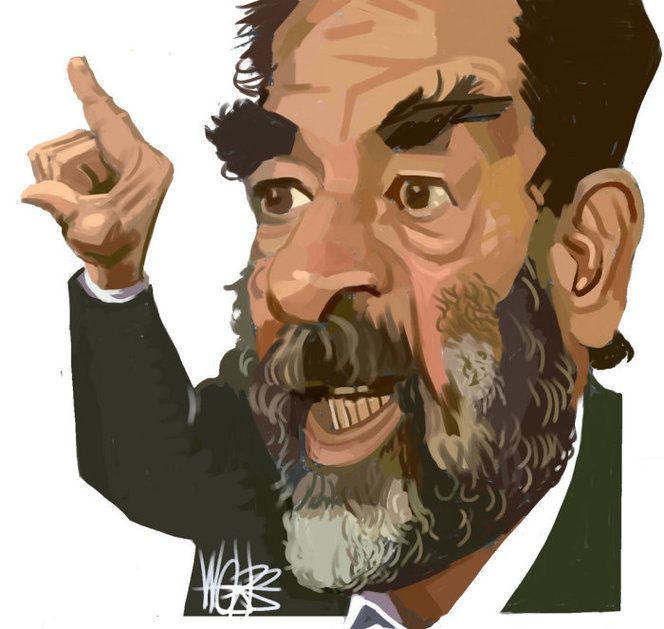
Abb.:
Saddam Hussein (صدام حسين عبد المجيد التكريتي )
(1937 - 2006)
[Bildquelle: Saddam Hussein. 22 October,
2005.. Webb, Murray, 1947- :[Digital caricatures published from 29
July 2005 onwards (2006, 2007, 2008). Includes a selection of
digital caricatures published from 2002 and up to July 2005.]. Ref:
DCDL-0000333. Alexander Turnbull Library, Wellington, New Zealand.
http://natlib.govt.nz/records/22299108.
-- Zugriff am 2013-03-09. -- "You can copy this item for personal
use, share it, and post it on a blog or website. It cannot be used
commercially without permission"]
Supporters, however, counter that Thailand's mobile phone industry is highly
competitive, and that little criticism was raised when the Norwegian firm
Telenor acquired Total Access Communications (โทเทิ่ล แอ็คเซ็ส
คอมมูนิเคชั่น), the country's second largest
operator. Democrat Party leader Abhisit Vejjajiva (อภิสิทธิ์
เวชชาชีวะ ) had criticized Thaksin
earlier for not sufficiently opening up the Thai telecom sector to
foreigners.
Supporters further counter that the complete sale of Shin Corporation by the Shinawatra-Damapong families had been a long-standing demand of some public
groups, as it would allow
Thaksin to undertake his duties as Prime Minister without accusation of
conflicts of interest.
The controversy surrounding the sale gave additional
momentum to an already-planned anti-Thaksin rally, which took place during
February 4-5th at the Royal Plaza (ลานพระราชวังดุสิต), near the parliament building and the
royal palace. At least 20,000 protesters, led by media figure Sondhi
Limthongkul (สนธิ ลิ้มทองกุล/林明達), gathered around demanding the resignation of the Prime
Minister, and submitted a petition to the Privy Council (สภาองคมนตรีไทย)
chairman General Prem Tinsulanonda (เปรม
ติณสูลานนท์) and the Office of His Majesty's Principal Private
Secretary, intended for His Majesty the King Bhumibol Adulyadej. Meanwhile,
rallies also took places in several southern provinces.
The resulting political turmoil forced Thaksin to
order the dissolution of the Lower House on February 24, 2006.
Use
of nomineesKularb Kaew and Cedar Holdings
were holding companies used to acquire Shin Corp. Kularb Kaew was, in turn
owned by a small group of Thai nominee shareholders, including Pong Sarasin
(พงส์สารสิน),
a son of the former Thai Prime Minister and the brother of Arsa Sarasin (อาสา
สารสิน),
King Bhumibol's principle private secretary. Other owners of Cedar are
Temasek and Siam Commercial Bank (ธนาคารไทยพาณิชย์), in which King Bhumibol's Crown Property
Bureau (สำนักงานทรัพย์สินส่วนพระมหากษัตริย์) has a controlling stake. SCB also played a crucial role advising and
providing financial support for the deal.
This use of local nominees of foreign owners was
attacked by some anti-Thaksin groups as a method to get around laws limiting
foreign ownership of Thai companies. Subsequent investigations found that
Thai nominees owned 24.1% of all shares on the Thai stock exchange, and up
to 36% of all shares in the technology sector. Efforts to clamp down on use
of Thai nominees could potentially cause a significant outflow of capital
from the Thailand. An official investigation of the use of nominees is
currently in progress.
After
the coupOn 16 October 2006, nearly a month
after a military junta overthrew the government of Thaksin Shinawatra in a
coup, Temasek issued a statement to signal the eventual reduction in its
holding in Shin Corp. However, the government said that it would continue
with its legal action to follow up on its investigation on whether Kularb
Kaew is a nominee of Temasek.
Chairman Pong Sarasin was later removed from the Board
of Directors, and replaced by Mom Rajawongse Tongnoi Tongyai, the private
secretary of Crown Prince Maha Vajiralongkorn (สมเด็จพระบรมโอรสาธิราช
เจ้าฟ้ามหาวชิราลงกรณฯ สยามมกุฎราชกุมาร). The Crown Prince Office,
later, declared that Mom Rajawongse Tongnoi Tongyai has never been the
secretary of the Crown Prince but was only a low ranking officer in the
office.
The junta's interpretation of the Foreign Business Act
of 1999, which defines nominees and limits foreign investment in Thai
companies, could have far reaching consequences for foreign investment in
Thailand.
5th
arrest warrantSupreme Court Criminal
Division for Holders of Political Positions judge Pongphet Vichitchonchai
(of a 9-judge panel, with the concurrence of Justice Pornpetch), on October
15, 2008, issued a 5th arrest warrant against Thaksin, for failure to appear
at the hearing of his "Sale of Shin Corporation to Temasek Holdings" case,
due to self-imposed exile in London since last month."
[Quelle:
http://en.wikipedia.org/wiki/Sale_of_Shin_Corporation_to_Temasek_Holdings.
-- Zugriff am 2012-01-08]
|
2006-01-26
Premiere des Films Chai Lai (ไฉไล)
von Poj Arnon (พจน์ อานนท์)
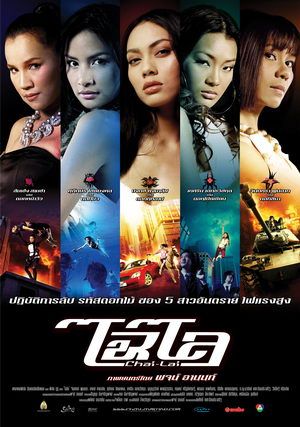
Abb.: Plakat
[Bildquelle: Wikipedia. -- Fair use]
|
"Chai Lai (Thai:
ไฉไล, English
title: Dangerous Flowers
and also known
as Chai Lai's Angels) is a 2006 Thai action film about five female
top-secret crimefighters, each with the codename of a flower, Lotus (ดอกบัว), Hibiscus
(ดอกชบา),
Rose (ดอกกุหลาบ), Spadix (ดอกหน้าวัว) and Crown of Thorns (ดอกโป๊ยเซียน). The premise is modelled after
Charlie's
Angels.
Plot
The films begins on a passenger plane, where a young girl
named Miki (มิกิ) and her step-mother are taken hostage by a man and a cross-dressing
woman. They call the father of Miki, but he has his own problems; another man is
menacing him and when he tries to take the gun a fight breaks out and the father
is shot. One of the Chai Lai (ไฉไล)
members, Rose
(ดอกกุหลาบ), enters the house and gets into a
fight with another henchman.
Miki gets upset that her father is shot via the mobile
phone and she stabs the man who has taken her hostage in the hand with a pipe,
which sets off a fight on the plane. The members of Chai Lai are fighting along
with a young police man named Chen (เฉิน). Meanwhile, Rose (Bongkoj Khongmalai) has
gutted the henchman at the house with a machete and chases the man, who shot the
father but crashes her car shortly after. When the man drives and misses her,
she shoots the gasoline pouring out of the vehicle and it explodes.
A crime boss named Dragon (มังกร) yells at his henchman at a
meeting for failing their mission to which the cross-dressing woman is named
King Kong, whom she blames Chai Lai for their failures. Miki's step-mother
barges in on the meeting, revealing that she works for them.
Chai Lai's boss tells the girls that it is alright that
they failed their mission despite that the father is dead and the men escaped.
The new plan is to protect Miki at school.
They fail to keep Miki safe at her school on the first day
and she gets kidnpped by the henchman. Chai Lai chase them but when member
Hibiscus ดอกชบา) (Jintara Poonlarp), after being freed from the van and saved by Rose,
gets out a rocket launcher and fires but remembers that Miki is still inside.
Luckily for Miki, the van swerves and the rocket hits the
tuk-tuk (ตุ๊กตุ๊ก)
that Spadix (ดอกหน้าวัว) was driving instead with her and Lotus
(ดอกบัว) (Supaksorn
Chaimongkol) narrowly escaping. The van escapes as the train goes by, stopping
them. Later, Miki attacks the henchman but is quickly stopped and tied. Miki's
Step-mother, Ms. Mei Ling, pretends to be beaten up by King Kong so that she can
reveal the secret location of the Andaman Pearl but it backfires.
The next day, the Chai Lai are getting a massage with Ms.
Mei Ling and King Kong. Soon, a fight quickly breaks out with them wearing
nothing but towels. Eventually, Ms. Mei Ling escapes and the henchman join in
the fight. During the fight, Ms. Mei Ling gets into her car and menaces Chen in
the car park until Hibiscus appears and tries to gun her but she quickly escapes.
Soon into the fight, a woman in a suit shows up and fights,
King Kong escapes and Rose is about to chase after until she is pursued by two
henchman outside. King-Kong runs into Spadix, who tries to gun her but fails.
After Lotus, Rose and Pouy-Sian (โป๊ยเซียน) (Kessarin Ektawatkul) finish they meet Spadix
outside just as she throws King Kong and she escapes.
King Kong hires the four-nation bounty hunters to finish
the Chai Lai off, Rosen goes on a date with her boyfriend, Gud, who proposes to
her. Dragon's henchman arrive with a beaten up Gud, the girls end up fighting
their way into the swimming pool, and they escape through hatch that is in there.
The exit is in a medieval castle, which is filled with weapons the girls stock
up on, because King Kong is outside with the four-nation assassins.
Kathleen, who is a goofy cross-eyed assassin girl, who
becomes King Kong’s sidekick. The girls are captured in a cage except Hibischus,
who arrives in a tank and attacks as the girls escape but unfortunately Gud is
still captured.
The Chai Lais have no clue how Dragon knew where their
house was and also they decide not to love anyone again because of Gud, new
orders are given to the girls from their boss by iPod. Dragon get the idea the
Andaman Pearl is on an island called Thai Baht due to Miki and they travel there.
The men find the Andaman Pearl and escape with it after being attacked by Lotus,
Rose and Pouy-Sian.
At a party to sell the Andaman Pearl, Miki’s father
arrives as a surprise bidder. The Chai Lais, soon enter the arena, where a fight
starts.
Ms. Mei Ling shoots Gud in the back in cold blood with
Rose upset and in her anger, she guns Ms. Mei Ling down and the SUV driver guy.
Dragon is chases by Lotus, Spadix and Pouy-Sian as he has the pearl and Miki
hostage, whom she escapes from. Dragon heads to the roof for a helicopter escape,
with Lotus chasing after. Miki is pursued by King Kong and Kathleen in a park
and the rest are with many henchman in another part of the park.
The henchman are all dead, Dragon shot in the head twice
by Lotus and Kathleen shoots King Kong many times. Chai Lai's boss reveals that
Kathleen was a spy and he has some kind of relationship with her. Miki is made
as a member of Chai Lai. Chai Lai (including Kathleen and Miki) goes to battle;
the members are dressed in white with machine guns fighting on the Afghan
beaches near the Afghan jungles
Cast
- Bongkoj Khongmalai (บงกช คงมาลัย, 1985 - ) as Kulap
(กุหลาบ) (Rose )
- Supaksorn Chaimongkol(ศุภักษร
ไชยมงคล, 1982 - )
as Bua
(บัว) (Lotus)
- Jintara Poonlarp (จินตหรา
พูนลาภ, 1971 - ) as Chaba
(ชบา) (Hibiscus)
- Kessarin Ektawatkul (เกศริน เอกธวัชกุล, 1981 - ) as Pouy-sian
(โป๊ยเซียน) (Crown of Thorns)
- Bunyawan Pongsuwan (บุญญาวัลย์ พงษ์สุวรรณ, 1967 - ) as Na-wua
(หน้าวัว) (Spadix)
- Krit Sripoomsed (กฤษณ์ ศรีภูมิเศรษฐ์, 1979 - ) as Chen
(เฉิน)
- Narawan Techaratanaprasert (นวรัตน์ เตชะรัตนประเสริฐ,
1996 - ) as Miki (มิกิ)
- Nithichai Yotamornsunthorn (นิธิชัย ยศอมรสุนทร, 1981
- ) Dragon (มังกร)
- Petchtai Wongkamlao (เพ็ชรทาย
วงษ์คำเหลา, 1965 - )
as the Chai Lais' handler
- Wanasak Srilar (วรรณศักดิ์ ศิริหล้า) as King Kong
(ป้อม)
[...]
Soundtrack
The closing-title song, "Chai Lai"
ไฉไล
, performed by Jintara
Poonlarp (จินตหรา พูนลาภ,
1971 - ), is featured on Jintara's 2006 album,
Mor lam sa on 12
(หมอลำสะออนชุดที่ 12)."
[Quelle:
http://en.wikipedia.org/wiki/Chai_Lai. -- Zugriff am 2013-03-23]
|
2006-02
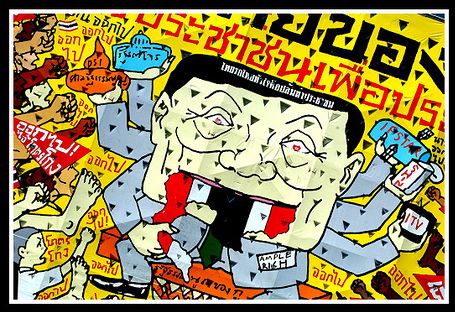
Abb.: ©Anti-Taksin-Poster, 2006-08
[Fair use]
2006-02-01

US-Präsident George W. Bush ernennt Ben Shalom Bernanke (1953 - ) zum
Vorsitzenden der Federal Reserve (Zentralbank der USA).
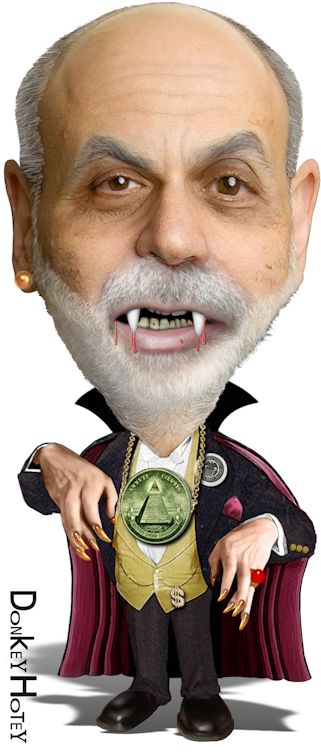
Abb.: Ben Shalom Bernanke
[Bildquelle: DonkeyHotey. --
http://www.flickr.com/photos/donkeyhotey/4607165643/. -- Zugriff am
2012-01-05. --
Creative
Commons Lizenz (Namensnennung, share alike)]
2006-02-02
Premiere des Films Dek hor (เด็กหอ)
von Songyos "Yong" Sugmakanan (ทรงยศ สุขมากอนันต์,
1973 - )
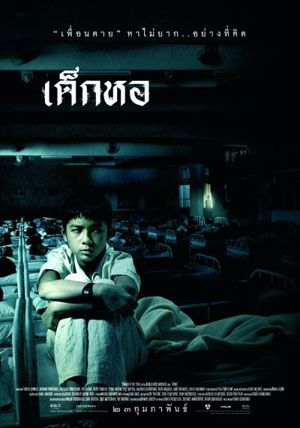
Abb.: Plakat
[Bildquelle: Wikipedia. -- Fair use]
|
Dek hor (Thai:
เด็กหอ, also
Dorm
or My School) is a 2006 Thai
horror-drama film.
Plot
In Thailand, young Ton Chatree (ต้น ชาตรี) (Trairat) is sent to a
boarding school by his father to get good grades and not tell his mother about
his father having an affair. Once in the school, Ton feels like an outcast and
misses his family and friends. His new schoolmates tell ghost stories about a
boy who died in the school swimming pool and a young pregnant woman who
committed suicide. The stories frighten him, thereby exacerbating Ton's
difficulties adjusting to the school. However, Ton becomes close friends with
another lonely boy, Vichien (วิเชียร) (Chienthaworn), who Ton later discovers is the boy
who drowned, and his death repeats every night. Ton finds a way to help his
friend rest in peace.
At the same time, Ms. Pranee (ครูปราณี) (Sukapatana), the school
administrator, is deeply troubled by Vichien's death because she believes
incorrectly that Vichien committed suicide and that it was partly her fault. At
the end of the movie, Ton tells Pranee the truth, that Vichien's death was an
accident and that Pranee should not blame herself.
Cast
- Charlie Trairat (ชาลี
ไตรรัตน์, 1993 - ) as Ton
(ต้น)
- Chintara Sukapatana (จินตหรา
สุขพัฒน์, 1965 - )
as Ms. Pranee
(ครูปราณี)
- Sirachuch Chienthaworn (ศิรชัช เจียรถาวร, 1992 - ) as Vichien
(วิเชียร)
- Suttipong Tudpitakkul (สุทธิพงษ์ ทัดพิทักษ์กุล) as Ton's father
(คุณพ่อต้น)
- Jirat Sukchaloen (จิรัฏฐ์ สุขเจริญ) as Peng (เพ้ง)
- Thanabodin Sukserisup (ธนบดินทร์ สุขเสรีทรัพย์) as Doc Nui
(หมอหนุ่ย)
- Pakasit Pantural (ปกาสิต พันธุรัตน์) as Pok (ป๊อก)
- Nipawan Taweepornsawan (นิภาวรรณ ทวีพรสวรรค์) as Ton's mother
(คุณแม่ต้น)
Reception
Box office,
critical reception
The film was screened at
the 2006 Bangkok International Film Festival. It opened in wide release in
Thailand on February 23, 2006, and was the No. 1 film that weekend, earning
nearly US$544,000.[1]
The film has had theatrical releases in Singapore and Malaysia and at other film
festivals, including the Pusan International Film Festival (부산국제영화제).
It received praise from critics for the performances of
the child actors and Chintara Sukapatana, as well as for its color-drained
photography and the production design of the old boarding school.[2][3]
Production
The film was co-written and directed by Songyos Sugmakanan (ทรงยศ
สุขมากอนันต์, 1973 - ),
one of the six directors of the 2003 hit Thai film
Fan Chan (แฟนฉัน), which also
starred Charlie Trairat. The film was critically acclaimed in Thailand, where it
won more honors than any other film, including best picture from the Bangkok
Critics Assembly."
[Quelle:
http://en.wikipedia.org/wiki/Dek_hor.
-- Zugriff am 2013-03-23]
|
2006-02-04
50.000 Demonstranten fordern in Bangkok den Rücktritt
von Ministerpräsident Thaksin. Der Rädelsführer, Medien-Mogul Sondhi
Limthongkul (สนธิ ลิ้มทองกุล /
林明達,
1947 - ) gründet die Peoples Alliance for
Democracy (PAD,
พันธมิตรประชาชนเพื่อประชาธิปไตย).
Eine der lautstärksten Unterstützerinnen der PAD ist
Prof. Chontira Satyawadhana (ชลธิรา สัตยาวัฒนา). Sie war einst Maoistische
Sprecherin der Radiostation der Communist Party of Thailand (พรรคคอมมิวนิสต์แห่งประเทศไทย),
Voice of the People -เสียงประชาชน, in Yunnan ( 云南,
China).
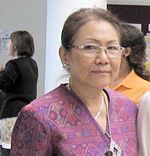
Abb.: Prof. Chontira Satyawadhana (ชลธิรา สัตยาวัฒนา)
[Fair use]
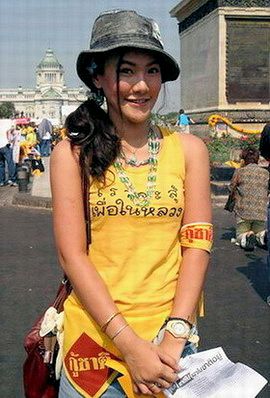
Abb.: "Gelbhemd" (เสื้อเหลือง), 2006
Slogans: "We will fight for the King" and "Liberate the nation"
[Bildquelle: Xkmasada / Wikimedia. -- GNU FDLicense]
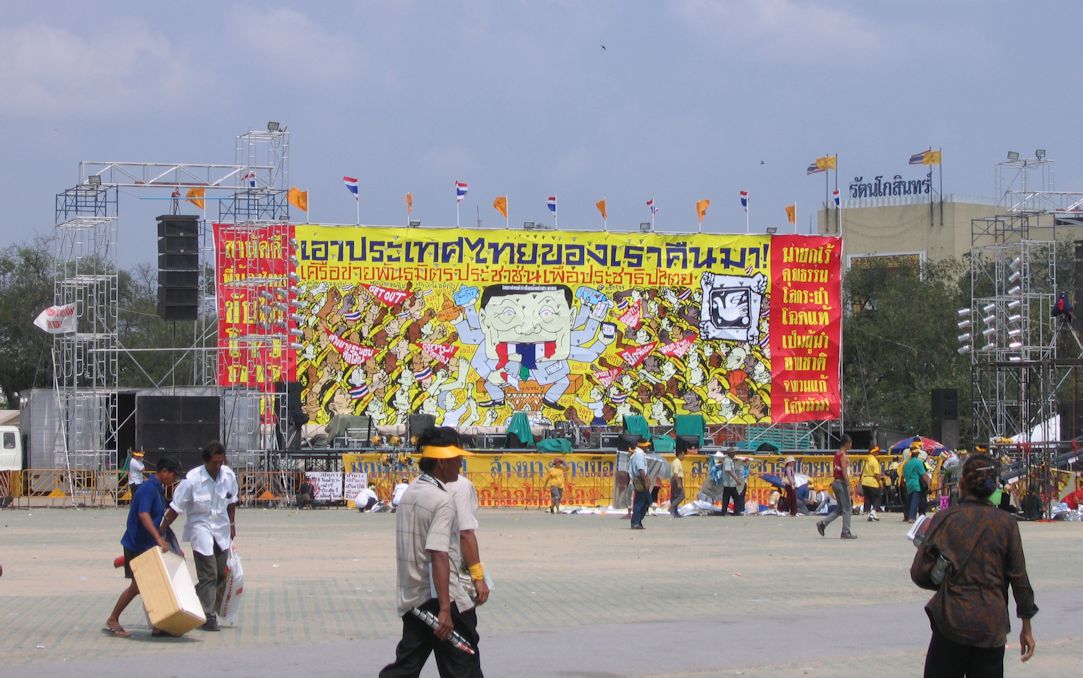
Abb.: Bühne für eine Anti-Thaksin-Veranstaltung, Bangkok, 2006-03-05
[Bildquelle: Lerdsuwa / Wikimedia. -- Public domain]
| "Die People’s Alliance for Democracy (Thai:
พันธมิตรประชาชนเพื่อประชาธิปไตย – „Volksallianz für
Demokratie“, kurz PAD, auch National Liberation Alliance
- กลุ่มพันธมิตรกู้ชาติ
oder einfach Gelbhemden -
เสื้อเหลือง) ist
eine thailändische Gruppe von Widerständlern, die 2005/2006 als
Protest gegen den damaligen Ministerpräsidenten von Thailand Thaksin Shinawatra (ทักษิณ
ชินวัตร) mit dem Ziel
gegründet worden war, den Ministerpräsidenten abzusetzen und unter
anderem wegen Korruption anzuklagen.[1
Die PAD rekrutierte vor allem Menschen aus der Ober- und
Mittelschicht. Sie bestand aus mehreren Gruppen von Menschenrechts-
und Polit-Aktivisten, die Thaksin vorwarfen, seine Regierung sei ein
undemokratisches Machtmonopol, das die Menschenrechte verletze, die
Pressefreiheit unterdrücke und im Krieg gegen Drogen („War on
Drugs“) vor „außergerichtlichen Tötungen“ (extrajudicial killing)
nicht zurückgeschreckt habe.
Treibende Kraft war anfangs unter anderem Sondhi Limthongkul (สนธิ
ลิ้มทองกุล / 林明達,
1947 - ), ein Medienmogul, der ursprünglich zu Thaksins
Unterstützern gehörte. Weiterhin zählen zur PAD bekannte
Wissenschaftler und auch Royalisten. Letztere gaben an, Thaksin habe
König Bhumibol Adulyadej mehrfach beleidigt. Außerdem schlossen sich
Bürgerrechtsgruppen der Bewegung an, die Thaksin vorwarfen, er habe
für den Verkauf seiner Shin Corporation (ชิน คอร์ปอเรชั่น) an
Temasek Holdings keine Steuern bezahlt. Insgesamt wurde die PAD sehr
kontrovers diskutiert.
Die Proteste gipfelten am Abend des 25. November 2008 mit der
Besetzung des Flughafens Bangkok-Suvarnabhumi (ท่าอากาศยานสุวรรณภูมิ).
Einen Tag später wurde auch das Domestic Terminal des Flughafens
Bangkok-Don Mueang
(ท่าอากาศยานดอนเมือง)
besetzt. Die Blockaden endeten erst, als im Parlament Abhisit
Vejjajiva (อภิสิทธิ์
เวชชาชีวะ) von der
Demokratischen Partei (พรรค
ประชาธิปัตย์) zum
Ministerpräsidenten gewählt wurde.
Die „Gelbhemden“ forderten eine Änderung des Wahlsystems. Wie
Sondhi Limthongkul in einem Interview bemerkte, sei Demokratie
nämlich „ein westlicher Exportartikel“ und „für Thailand nicht die
richtige Antwort“, es sollen 70 % der Abgeordneten ernannt werden.
Farbgebung
Gelb
als Farbe wählte die Bewegung und die in ihr zusammengeschlossenen
Parteien in Anlehnung an die Farbe des Wochentages, an dem der
thailändische König geboren wurde."
[Quelle:
http://de.wikipedia.org/wiki/People%E2%80%99s_Alliance_for_Democracy.
-- Zugriff am 2012-01-08] |
2006-02-06
Trotz Protesten von Tierschützern eröffnet Chiang Mai
Night Safari (เชียงใหม่ไนท์ซาฟารี).
Baukosten: 1,15 Milliarden Baht. Viele Tiere - vor allem afrikanische -
sterben wegen der ungeeigneten Lebensumstände. Der Zoo macht wochenlang
negative Schlagzeilen in der Thai-Presse. Manger ist Plodprasop Suraswadi (ปลอดประสพ
สุรัสวดี, 1945 - ), ein Parteigenosse von
Ministerpräsident Thaksin Shinawatra (ทักษิณ
ชินวัตร, 1949 - ).
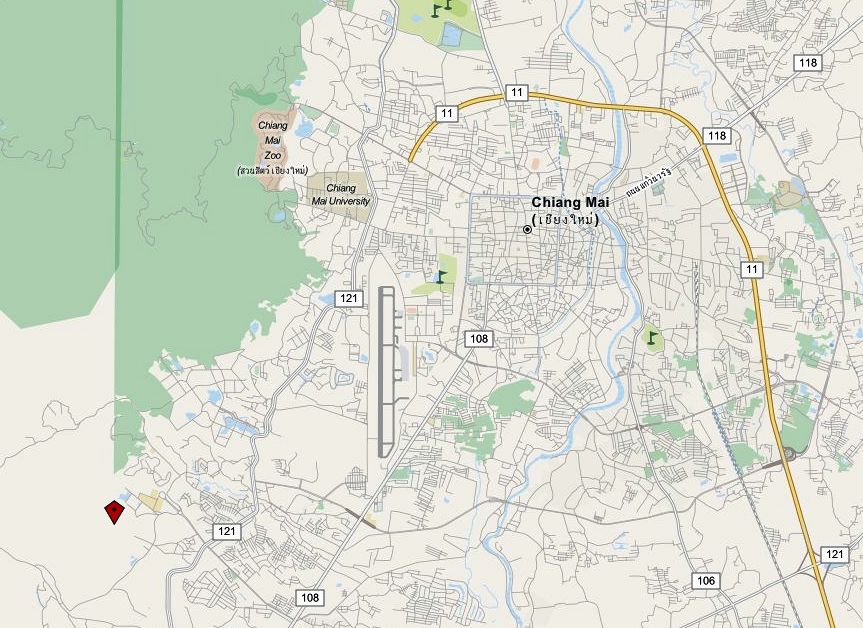
Abb.: Lage von Chiang Mai
Night Safari (เชียงใหม่ไนท์ซาฟารี)
[Bildquelle: OpenStreetMap. --
Creative
Commons Lizenz (Namensnennung, share alike)]
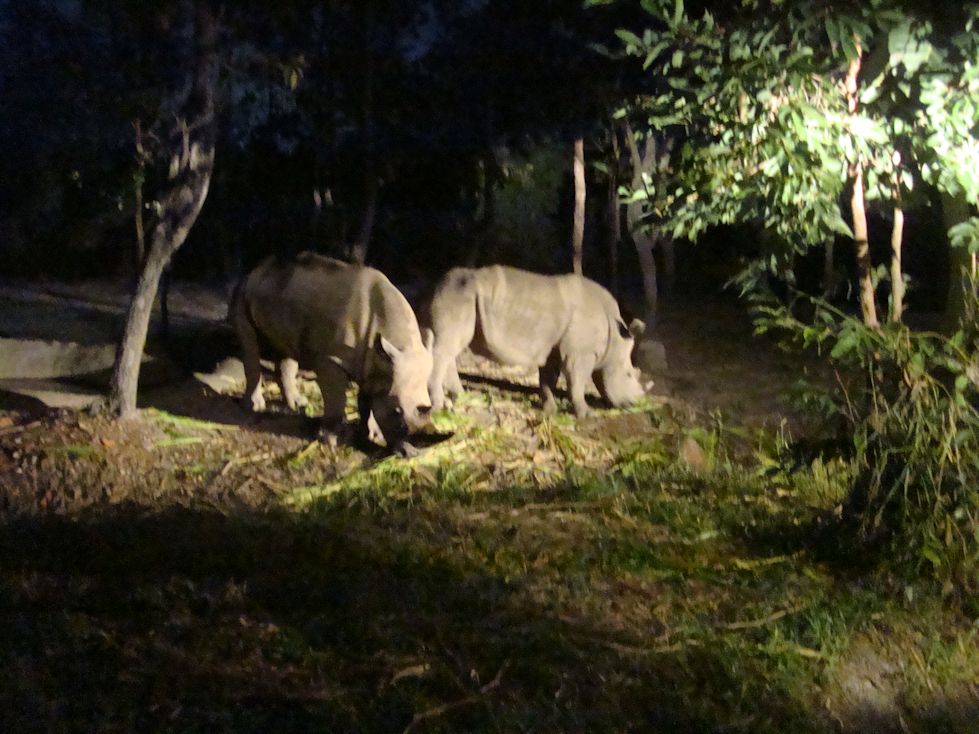
Abb.: Chiang Mai Night Safari (เชียงใหม่ไนท์ซาฟารี),
2009
[Bildquelle: KungDekZa / Wikimedia. -- GNU FDLicense]
| "Chiang Mai Night Safari (Thai:
เชียงใหม่ไนท์ซาฟารี)
is the world's third nocturnal zoo and is a government nature theme park
which is built to promote Chiang Mai (เชียงใหม่) tourism regarding to the government's
policy apart from arts, cultures, traditions, and the beauty of nature which
are the main fascinating tourist attractions.
Chiang Mai Night Safari was established after Night
Safari in Singapore and China Night Safari in Guangzhou (广州). Chiang Mai Night
Safari is 2 times larger than Singapore's Night Safari.
History
Chiang Mai Night Safari was unofficially opened on
November 18, 2005 and it was officially opened on February 6, 2006.
Zones
- Savanna Safari Zone is the exhibit zone mostly
for animals whose habitat is in African savanna. This zone includes
about 34 species and over 320 animals such as wildebeests, giraffes,
white rhinoceroses, zebras etc.
- Predator Prowl Zone is the carnivorous animal
zone which has approximately 27 species and over 200 animals such as
tigers, lions, asiatic black bears, crocodiles etc.
- Jaguar Trail Zone is a walking trail around the
1.2 km Swan Lake. This zone has over 400 animals of beautiful and
rare 50 species of smaller animals in an environment of enchanting
flower gardens. Animals in this zone include white tigers, jaguars,
capybaras, clouded leopards, fishing cats, Brazilian tapirs, squirrel
monkeys, miniature horses, crowned cranes etc."
[Quelle:
http://en.wikipedia.org/wiki/Chiang_Mai_Night_Safari. -- Zugriff
am 2012-01-08] |
2006-02-09
Premiere des Films Krasue Valentine (กระสือวาเลนไทน์)
von Yuthlert Sippapak (ยุทธเลิศ สิปปภาค,
1966 - )
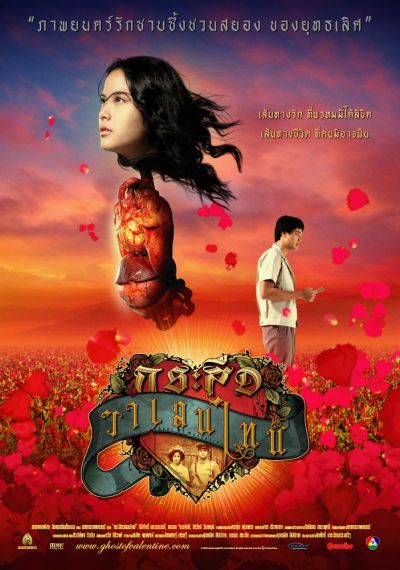
Abb.: Plakat
[Bildquelle: Wikipedia. -- Fair use]
|
Krasue Valentine (Thai:
กระสือวาเลนไทน์, also
Ghost of Valentine) is a 2006 Thai romance-horror film written and
directed by Yuthlert Sippapak (ยุทธเลิศ
สิปปภาค, 1966 - ). The film concerns the krasue
(กระสือ) ghost legend that is
common in Southeast Asian countries.
Plot
Sao (สาว) is a nurse who comes to work at an older, rundown
hospital in Bangkok. Witnessing her arrival is Num (หนุ่ม), a disabled orderly. Num is
shy, but a little girl selling roses convinces him to buy one. He gives her
money and the girl in turn gives the rose to Sao, forming a bond between the two.
Sao takes room in an old house behind the hospital, near a disused gymnasium and
the old morgue. She is getting over a breakup with an old boyfriend who left her
because she turns into a ghost. And, indeed, unbeknownst to her, she does turn
into the krasue กระสือ)
ghost that very night, scaring the hospital's security guard.
Cast
- Pitisak Yaowananon (ปิติศักดิ์
เยาวนานนท์, 1982 - ) as Num (หนุ่ม)
- Ploy Jindachote (พลอย จินดาโชติ,
1982 - ) as Sao (สาว)
- Kowit Wattanakul (โกวิท วัฒนกุล,
1954 - ) as Doctor (หมอใหญ่)
- Viyada Umarin (วิยะดา อุมารินทร์,
1955 - ) as Paoun (ผอูญ)
[Quelle:
http://en.wikipedia.org/wiki/Krasue_Valentine.
-- Zugriff am 2013-03-24]
|
2006-02-17
Thailand-Premiere des Films Invisible Waves (คำพิพากษาของมหาสมุทร)
von Pen-Ek Ratanaruang (เป็นเอก รัตนเรือง,
1962 - )
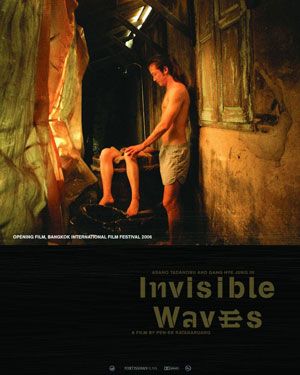
Abb.: Plakat
[Bildquelle: Wikipedia. -- Fair use]
|
"Invisible Waves
(Thai: คำพิพากษาของมหาสมุทร)
is a 2006 crime film by Thai director Pen-Ek Ratanaruang (เป็นเอก
รัตนเรือง, 1962 - ), with screenplay by
Prabda Yoon (ปราบดา หยุ่น, 1973 - ), cinematography by Christopher Doyle ( 1952
- ), and starring Tadanobu Asano
浅野 忠信,
1973 - ) –
all people that Pen-Ek had worked with on his previous film,
Last Life in the
Universe (เรื่องรัก น้อยนิด มหาศาล, 2003). It had its world premiere at the Berlin Film Festival and was also
shown at the 2006 Bangkok International Film Festival and the 2006 Toronto
International Film Festival.[1]
Plot
Kyoji (恭司) is a cook living in Macau (澳門). He works for a Thai
restaurant in Hong Kong and has been having an affair with Seiko (聖子), the wife of
his boss, Wiwat (วิวัฒน์), who orders Kyoji to poison her. After the deed is done, Kyoji
is ordered to leave Hong Kong. He consults with the mysterious Monk, who gives
him money and advice to contact Lizard. Kyoji then boards a cruise ship, and is
given a small, dreary cabin belowdecks, where nothing seems to work properly. In
trying to find his way back topside, he gets lost. Finally, up on deck, he meets
Noi. Noi has a baby named Nid, whom Kyoji finds hanging on the deck rail in a
harness, where Noi left the child while she was swimming. Eventually, the ship
reaches its destination, Phuket (ภูเก็ต), Thailand, where real life-or-death adventures
begin for Kyoji as he starts to put the pieces together about what he's done.
Cast
- Tadanobu Asano
(浅野
忠信,
1973 - ) as Kyoji (恭司)
- Maria Cordero (肥媽瑪俐亞, 1954 - ) as Maria (มาเรีย)
- Toon Hiranyasap (ทูน หิรัญทรัพย์, 1954 - ) as Wiwat
(วิวัฒน์)
- Kang Hye-jung (강혜정,
1982 - ) as Noi (น้อย)
- Ken Mitsuishi
(光石
研,
1961 - ) as Lizard
- Eric Tsang (曾志偉, 1953 - ) as Monk (มั๊งค์)
- Tomono Kuga (久我朋乃) as Seiko (聖子)
Awards and nominations
- 2006 Berlin International Film Festival – world
premiere, nominated for Golden Bear.
- 2006 Bangkok International Film Festival – in
competition and opening film."
[Quelle: http://en.wikipedia.org/wiki/Invisible_Waves.
-- Zugriff am 2013-03-23]
|
2006-02-24
Angesichts der Proteste gegen seine Regierung löst
Ministerpräsident Thaksin das Parlament auf und schreibt Neuwahlen für den
2. April aus. Die Democrat Party (พรรคประชาธิปัตย์),
Chart Thai (พรรคชาติไทย)
und Mahachon Party (พรรคมหาชน)
beschließen, die Wahlen zu boykottieren.
2006-02-24
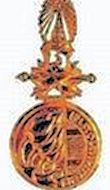
Zu National Artists (ศิลปินแห่งชาติ)
werden ernannt:
- Manee Payomyong (ศาสตราจารย์เกียรติคุณ มณี พยอมยงค์,
1930 - 2009) - Literature
- Rawee Pawilai (ศาสตราจารย์ ดร.ระวี ภาวิไล, 1925 - )
- Literature
- Kiettisak Chanonnart (ศ. เกียรติศักดิ์ ชานนนารถ,
1943 - ) -
Visual art, Maler
- Nonthiwan Chantanaphalin (นายนนทิวรรธน์ จันทนะผะลิน,
1946 - ) - Visual art, Bildhauer
- Decha Boonkham (ศ. กิตติคุณ เดชา บุญค้ำ, 1939 - )
- Applied art, Architekt
- Somthavil Urassayanan (รศ. สมถวิล อุรัสยะนันทน์,
1922 - 2009) -
Applied art, Keramikerin
- Kiettipong Kanchanaphee (นายเกียรติพงศ์ กาญจนภี
= สุนทรียา ณ เวียงกาญจน์,
1925 - ) - Performing art (international music)
- Kalong Peunghongkham (ร.ต.ต. กาหลง พึ่งทองคำ,
1929 - ) - Performing art (Thai music)
Künstlerlink auf Spotify:
URI:
spotify:artist:2oUW2DJyn2U8mbL12YCzJN
URL:
https://open.spotify.com/artist/2oUW2DJyn2U8mbL12YCzJN
- Suchart Subsin (นายสุชาติ ทรัพย์สิน,
1938 - ) - Performing
art (Thai dance), Schattenfigurenspieler
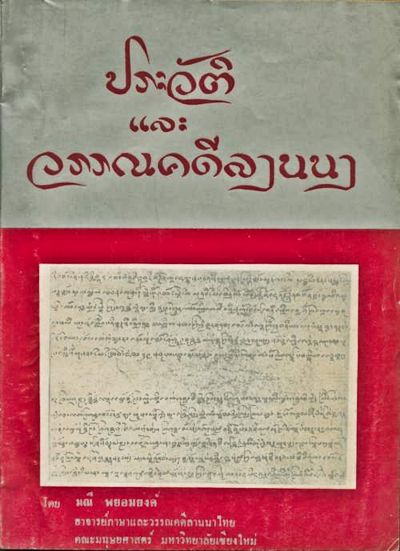
Abb.: Einbandtitel eines Buchs von Manee Payomyong
(ศาสตราจารย์เกียรติคุณ มณี พยอมยงค์)
[Fair use]
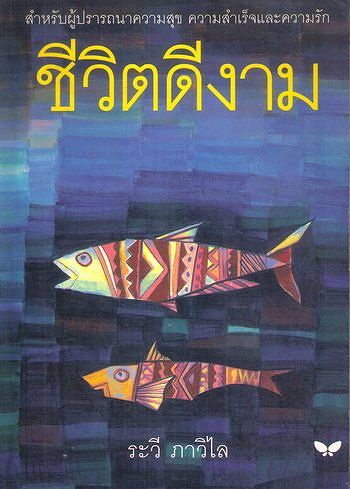
Abb.: Einbandtitel eines Buchs von Rawee Pawilai
(ศาสตราจารย์ ดร.ระวี ภาวิไล)
[Fair use]
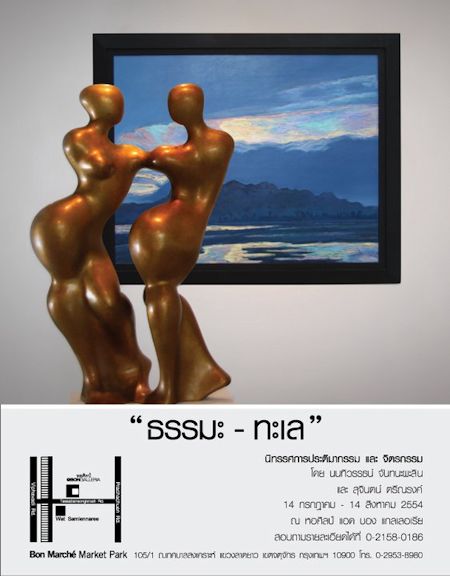
Abb.: Plakat zu einer Ausstellung von Kiettisak Chanonnart (ศ. เกียรติศักดิ์ ชานนนารถ),
2011
[Fair use]
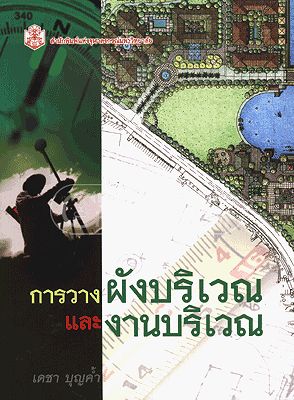
Abb.: Einbandtitel eines Buchs von Decha Boonkham (ศ.
กิตติคุณ เดชา บุญค้)
[Fair use]
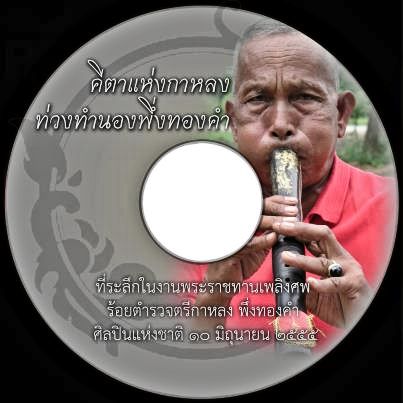
Abb.: CD-Titel von Kalong Peunghongkham (ร.ต.ต. กาหลง พึ่งทองคำ)
[Fair use]
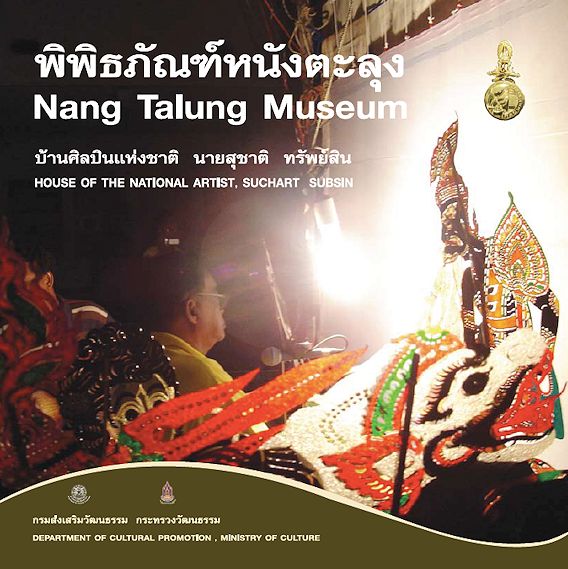
Abb.: Plakat für das Schattenfigurenmuseum von Suchart Subsin (นายสุชาติ ทรัพย์สิน)
[Fair use]
2006-02-27
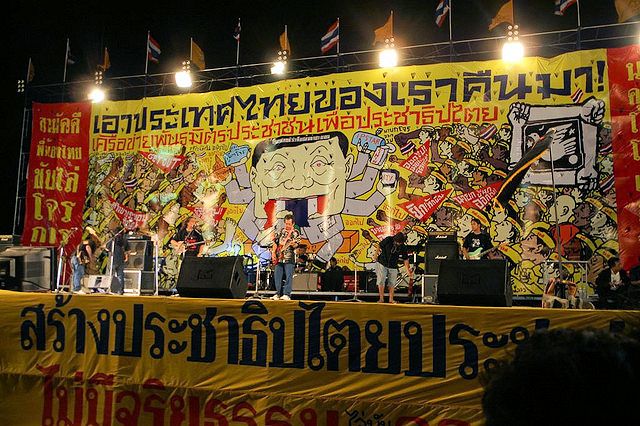
Abb.: Protestkonzert der Gruppe Caravan (คาราวาน)
gegen Ministerpräsident Thaksin, 2006-02-27
[Bildquelle: Don Sambandaraksa. --
http://www.flickr.com/photos/49353237@N00/105403533/. -- Zugriff am
2012-10-17. --
Creative
Commons Lizenz (Namensnennung, share alike)]
Die Gruppe auf Spotify:
URI:
spotify:artist:04jYFrScdfjeB9KtUuNSdb
URL:
https://open.spotify.com/artist/04jYFrScdfjeB9KtUuNSdb
2006-03-03ff.
Caravan of the Poor (คาราวานคนจน):
Bauern aus Nord- und Nordostthailand ziehen mit landwirtschaftlichen
Kleinfahrzeugen (rot e-tan - รถอีแต๋น)
nach Bangkok. Organisator: Kamtha Kanboonjan
(คำตา แคนบุญจันทร์) sowie das Netzwerk von Newin Chidchob (เนวิน
ชิดชอบ, 1958 - )
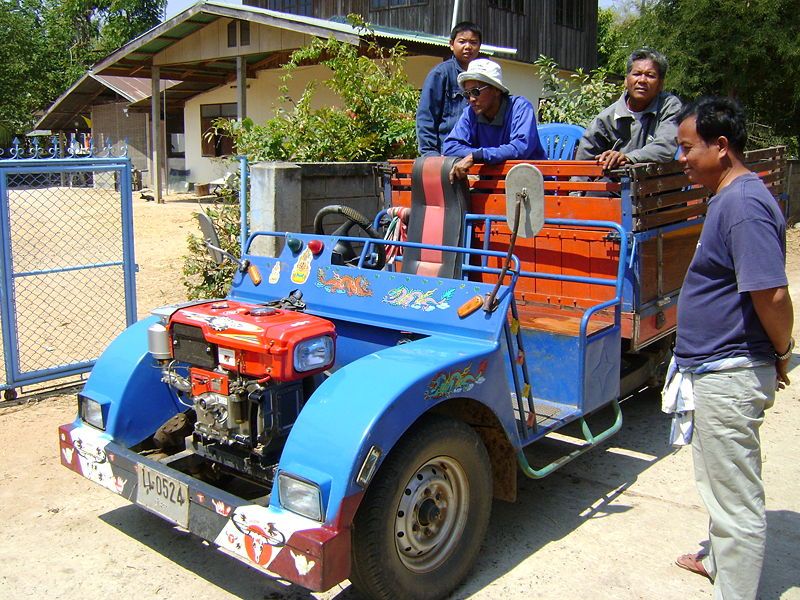
Abb.: rot e-tan - รถอีแต๋น, 2008
[Bildquelle: Pawyi Lee / Wikimedia. -- Public domain]
2006-03
Es erscheint der Anti-Thaksin Song
ไอ้หน้าเหลี่ยม [Mieses
Quadratgesicht]

Abb.: ไอ้หน้าเหลี่ยม [Mieses Quadratgesicht]
[Bildquelle:
https://thaipolitictionary.files.wordpress.com/2011/10/featurepics04.jpg.
-- Zugriff am 2016-01-18. -- Fair use]
Er wird ein Hit.
Text:
สี่เหลี่ยมก็มีสี่ด้าน ไอ้คนหน้าด้าน
คือไอ้หน้าเหลี่ยม
ไอ้ลิ่วล้อสิงคโปร์โตก ไอ้ลิ่วล้อสิงคโปร์โตก มันจะตกนรก
กะลาหัวไม่เจียม
ไอ้หน้าเหลี่ยม หน้าเหลี่ยม หน้าเหลี่ยม ไอ้ลูกกระจ๊อกหน้าเหลี่ยม
มันเลียแข้งเลียขา
ไอ้หน้าเหลี่ยมมันเป็นคนพันธุ์ทาง พูดไทยปนฝรั่งยังกับโก้ตายห่า(เฮ้ย)
ฝ่ายค้านก็รวมหัวบอยคอต ประชาชนก่อหวอดมันก็ยังตากหน้า
มันหน้าด้านไม่เป็นลูกผู้ชาย มันกลัวจะโดนลากไส้ มันเลยยุบสภา(หุย)
ไอ้หน้าเหลี่ยม หน้าเหลี่ยม หน้าเหลี่ยม
มันแจกแบงค์ใหม่เอี่ยมให้คนเข้าคูหา
เอาบัตรปลอมปนๆไปมั่ง มันก็ได้รับเลือกตั้งมาตั้ง 19 ล้านกว่า
โดนไล่มันก็ไม่ยอมลาออก ใครถามก็บอกว่าสายๆชาติหน้า
มันขายชินฯ ขายชาติเบ็ดเสร็จ มันฮุบประเทศให้โคตรอาเตี่ยโคตรอาม่า
โอ้ย เหลี่ยม เหลี่ยม เหลี่ยม เหลี่ยม เหลี่ยม
โอ้ย เหลี่ยม เหลี่ยม เหลี่ยม เหลี่ยม เหลี่ยม
ไอ้หน้าเหลี่ยม หน้าเหลี่ยม หน้าเหลี่ยม
อำนาจหน้าเหลี่ยมมันซื้อด้วยเงินตรา
มันรวมหัวลอยค่าเงินบาท ป่วนเศรษฐกิจชาติเพราะมันตุนดอลลาร์
กฏหมายถ้ามันมีช่องโหว่ มันก็เอาหัวโผล่ออกไปทำการค้า
พอเรื่องปูดมันก็จ้างทนาย แต่มันลืมมอบหมายให้พูดเรื่องจรรยา
มันซื้อที่ดินเก็งกำไร มันรู้ข้อมูลภายใน ว่าจะมีรถไฟฟ้า
นโยบายมันเอื้อประโยชน์ มันรวยกันทั้งโคตรไปจนถึงขี้ข้า
ของนอกมาตีตลาดในประเทศ เพราะมันเปิดฟรีเทรดแลกกับไอพีสตาร์
มันทำตัวเป็นมาเฟียร์ธุรกิจ รึดไถทุจริต แล้วมันยังสั่งอุ้มฆ่า(หุย)
สี่เหลี่ยมก็มีสี่ด้าน ไอ้คนหน้าด้าน คือไอ้หน้าเหลี่ยม
ไอ้ลิ่วล้อสิงคโปร์โตก ไอ้ลิ่วล้อสิงคโปร์โตก มันจะตกนรก
กะลาหัวไม่เจียม
ไอ้หน้าเหลี่ยม หน้าเหลี่ยม หน้าเหลี่ยม
มันคิดแต่หาเล่ห์เหลี่ยมไม่กินข้าวกินปลา
เวลาหิวกินคลื่นความถี่ ไม่ก็ไปรษณีย์ ไม่ก็การไฟฟ้า
ของว่างมันก็กินลำไย แกล้มกับทีพีไอ ไม่ก็กินต้นกล้า
มันเทคโฮมหุ้น ปตท. ไปฝากโอ้คฝากอ้อที่บ้านจ้นทร์ส่องหมา
ไอ้หน้าเหลี่ยม หน้าเหลี่ยม หน้าเหลี่ยม มันคิดแต่หาเล่ห์เหลี่ยม
นอนก็ไม่เต็มตา
มันหมกมุ่นเรื่อง CTX จนลืมเรื่องเซ็กซ์ ที่มันชอบนักหนา
มันกังวลเรื่องแอมเพิลริช จนมันลืมรูดซิปตอนไปเยี่ยวออกมา
มันเป็นห่วงกลัวดวงจะดับ กลัวโดนยึดทรัพย์ กลัวสหบาทา
โอ้ย เหลี่ยม เหลี่ยม เหลี่ยม เหลี่ยม เหลี่ยม
โอ้ย เหลี่ยม เหลี่ยม เหลี่ยม เหลี่ยม เหลี่ยม
ไอ้หน้าเหลี่ยม หน้าเหลี่ยม หน้าเหลี่ยม
ประชานิยมหน้าเหลี่ยมมันเป็นพระคุณตายห่า
มันให้กู้กองทุนหมู่บ้าน จนเป็นหนี้หัวบานจนไปถึงรากหญ้า (เฮ้ย)
พักชำระหนี้ ธกส. แต่เหลือเงินพอซื้อมือถือถ้วนหน้า
บ้านเอื้ออาทรหลอกแดก คุณภาพห่วยแตก ปลูกเองถูกกว่า (หุย)
ค้ายามันให้ฆ่าตัดตอน เพราะมันกลัวเดือดร้อนไปถึงตัวหัวหน้า
มันเอาหวยขึ้นมาไว้บนดิน 3 ส่วนโกงกิน อีก 1 ส่วนการศึกษา
30 บาทรักษาทุกโรค เบาหวานหวัดนก มันก็ให้แดกพารา
พอขาลงมันก็เล่นละครเป็นกะหรี่ กอดคนนู้นกอดคนนี้ มันทำเป็นบีบน้ำตา(หุย)
สี่เหลี่ยมก็มีสี่ด้าน ไอ้คนหน้าด้าน คือไอ้หน้าเหลี่ยม
ไอ้ลิ่วล้อสิงคโปร์โตก ไอ้ลิ่วล้อสิงคโปร์โตก มันจะตกนรก
กะลาหัวไม่เจียม
ไอ้หน้าเหลี่ยม หน้าเหลี่ยม หน้าเหลี่ยม
ไอ้อย่างหนาหน้าเหลี่ยมมันขี้โกงเป็นบ้า
เอาเงินยัดศาลรัฐธรรมนูญ สั่งคดีซุกหุ้นไม่ให้พิจารณา (เฮ้ย)
องค์กรอิสระอัปรีย์ มันให้พวกขันทีไปจัดซื้อจัดหา
มันติดสินบนข้าราชการ ใครที่ซูฮกมันได้เลื่อนขั้นทะเล่อทะล่า
ไอ้หน้าเหลี่ยม หน้าเหลี่ยม หน้าเหลี่ยม ไอ้ทรราชหน้าเหลี่ยม
มันทำตัวอหังการ์
มันอยากเป็นรัฐบุรุษ ไอ้หมาหัวเน่าหางกุด จะชูคอเทียบป๋า
มันไม่รู้ที่สูงที่ต่ำ มันพูดจา จาบจ้วงราชา
จาบจ้วงราชา
มันอวดดีแต่งตั้งสังฆราช ที่หน้าตาประหลาดเพราะมันเป็นมารศาสนา
โอ้ย เหลี่ยม เหลี่ยม เหลี่ยม เหลี่ยม เหลี่ยม
โอ้ย เหลี่ยม เหลี่ยม เหลี่ยม เหลี่ยม เหลี่ยม
ไอ้หน้าเหลี่ยม หน้าเหลี่ยม หน้าเหลี่ยม
ไอ้นาซีหน้าเหลี่ยมมันมีแต่คำมุสา
มันขี้ฮกว่ามันจับโจรใต้ คนดีๆต้องตาย ยังโดนยัดข้อหา (เฮ้ย)
มันบอกว่ามันเป็นคนดี แต่มันโกงภาษี มันให้ลูกรับหน้า
มันบอกว่าทำตามระเบียบ แต่ถ้ามันเสียเปรียบ มันก็แก้กติกา
มันจะซื้อลิเวอร์พูล ฟูแล่ม มันกุข่าวหน่อมแน้ม มากลบความชั่วช้า
มันดูถูกเรื่องสัตยาบัน แต่มันเขียนอีกอัน มันบอกว่ามันเตรียมมา
มันบอกจะปราบคอร์รัปชั่น ปราบภาษาพ่อ.แดกกันยิ่งกว่า
มันคุยว่ามันมีธรรมะ พอจับได้จะๆ มันบอก"ตถตา"
สี่เหลี่ยมก็มีสี่ด้าน ไอ้คนหน้าด้าน คือไอ้หน้าเหลี่ยม
ไอ้ลิ่วล้อสิงคโปร์โตก ไอ้ลิ่วล้อสิงคโปร์โตก มันจะตกนรก
กะลาหัวไม่เจียม
ไอ้หน้าเหลี่ยม หน้าเหลี่ยม หน้าเหลี่ยม
มันหน้าตาสี่เหลี่ยมยิ่งกว่าทรงเรขา
น้องมันก็พุงป่องสมองฝ่อ ปลอมวุฒิ ปวช.ไปเรียนต่อปริญญา
ลูกสาวมันก็โง่ฉิบหาย ขนาดโกงแทบตายยังได้แค่ 2กว่าๆ
ลูกชายมันก็ไอคิวต่ำ มันต้องใส่แว่นดำ ก็เพราะมันติดยา
เมียมันโกงแล้วก็ไม่เจียม เดินเอ็มโพเรียมก็เลยโดนเขาด่า
ความผิดมันอีกหลายกระทง ตั้งแต่ธรณีสงฆ์ ไปถึงโปรเจ็คเมกก้า (เฮ้ย)
กลางคืนคงเอาตีนกุมขมับ อยากจะนอนให้หลับ มันยังต้องฉีดยา
อีกหน่อยมันคงเป็นโรคประสาท ไปแก้ผ้าอาละวาดอยู่บนป้ายโฆษณา (หุย)
โอ้ย เหลี่ยม เหลี่ยม เหลี่ยม เหลี่ยม เหลี่ยม
โอ้ย เหลี่ยม เหลี่ยม เหลี่ยม เหลี่ยม เหลี่ยม
ไอ้หน้าเหลี่ยม หน้าเหลี่ยม หน้าเหลี่ยม
ถ้าขืนให้มันหน้าเหลี่ยมไปจนถึงสมัยหน้า
เมืองไทยคงกลายเป็นคุกลับๆ เป็นที่ตั้งฐานทัพพวกอเมริกา (เฮ้ย)
สิงคโปร์มันจะเข้านอกออกใน วางมาดเส้นใหญ่ ไม่ต้องปั๊มวีซ่า
หมอผีเขมรจะร่ำรวย ร่ายเวทย์ล้างซวยเวลาเหี้ยเข้าสภา (หุย)
มันคงจะแฮบเงินกองทุน ไปปล่อยกู้อุดหนุนเศรษฐกิจพม่า
ประเทศไทยมันคงเอาเข้าตลาด ขายหุ้นละ 1 บาท บอกว่าราคาพาร์ (เฮ้ย)
ให้อากู๋เปลี่ยนเนื้อเพลงชาติ ลิขสิทธิ์ผูกขาดทั้งชาตินี้ชาติหน้า
ฮิตเล่อร์กลับชาติมาเกิดใหม่ เป็นลูกคนสุดท้ายชื่อเด็กชายพวงทองทา
สี่เหลี่ยมก็มีสี่ด้าน ไอ้คนหน้าด้าน คือไอ้หน้าเหลี่ยม
ไอ้ลิ่วล้อสิงคโปร์โตก ไอ้ลิ่วล้อสิงคโปร์โตก มันจะตกนรก
กะลาหัวไม่เจียม
ไอ้หน้าเหลี่ยม หน้าเหลี่ยม หน้าเหลี่ยม
ไอ้คนที่รักหน้าเหลี่ยมมันมีแต่รวยอื้อซ่า
สุริยะ จึงรุ่งเรืองกิจ-สุรเกียรติ์-สมคิด-คงศักดิ์ วัฒนา(เฮ้ย) ชิดชัย
วรรณสถิตย์-ไอ้สมัคร-ดุสิต-วิษณุ-วาสนา-สุวรรณ วลัยสถุล-ธรรมรักษ์
อิศรางกูร ณ อยุธยา (หุย) สุนีย์ สินธุเดชะ-ทนง พิทยะ-ยงยุทธ-เยวภา-สุรนันท์-สุขวิช-สุนัย-สุภาพ
คลี่กระจาย-สุธรรม-ศิธา (เฮ้ย)
สุชาติ-สุวิทย์-สุวัจน์-เจ๊หน่อยสุดารัตน์-สุชน-สนธยา คุณปลื้ม
แต่ว่าผมไม่ปลื้ม เพราะว่าผมไม่ลืมว่า ฆ่าใครมา
ฆ่าใครมา
โอ้ย เหลี่ยม เหลี่ยม เหลี่ยม เหลี่ยม เหลี่ยม
โอ้ย เหลี่ยม เหลี่ยม เหลี่ยม เหลี่ยม เหลี่ยม
อดิสร-อดิสัย-อริสมันต์-เนวิน-ยุรนันท์-ลัดดาวัลย์-วัฒนา-ปองพล-จาตุรนต์
ฉายแสง-นายรุ่งแก้วแดง-สมชาย-สุชาดา (เฮ้ย) นายผดุง ลิ้มเจริญรัตน์-นาทยวันมูหะมัด
นอร์ มะทา-ภูมิธรรม-พงษ์ศักดิ์-พรหมินทร์-โภคิน-พงษ์เทพ เทพกาญจนา (หุย)
สุรพงษ์ สืบวงศ์ลี
( -ธงทอง-กันตธีร์-กุเทพ-กรรณิการ์-อรทัย ฐานะจาโร-บวรศักดิ์ อุวรรณโน-ประพัฒน์-ประชาเฮ้ย)ระเบียบรัตน์-เสริมศักดิ์-สมศักดิ์-เพรียว
พันธุ์-ชัยภักดิ์-จักรภพ-ปวีณา-พินิจ จารุสมบัติ-สรอรรธ-สรยุทธ
สุทัศนะจินดา
โอ้ย เหลี่ยม เหลี่ยม เหลี่ยม เหลี่ยม เหลี่ยม
โอ้ย เหลี่ยม เหลี่ยม เหลี่ยม เหลี่ยม เหลี่ยม
วราเทพ รัตนากร-วีระ-ดนุพร-ประยุทธ์-ปริญญา-มิ่งขวัญ
แสงสุบรรณ-พันศักดิ์-จักรพันธุ์-ศันสนีย์-ปรีชา-ปุระ ได้แต่หวังอ้อกลาง
โสภณ เพชรสว่าง-บุญคลี-ลลิตา-ปลอดประสพ สุรัสวดี-ที่เปิดไนท์ซาฟารี
เป็นสุสานสัตว์ป่า-ณหทัย-ชัยสิทธิ์-อิทธิพล-สุขุม-กมล-สุมิตา-สุจินดา-จำลอง
ครุฑขุนทด-สิริกร-บรรพต-วิชัย-วิทยา (เฮ้ย)
[Quelle:
http://my.dek-d.com/eweh11/writer/view.php?id=141036. -- Zugriff
am 2016-01-18. -- Fair use] |
2006-03-05
Petition an den König gegen Ministerpräsident Thaksin,
dem Korruption und Machtmissbrauch vorgeworfen wird.
Zu den Unterzeichnern gehören u.a. folgende Oktobristen (คนเดือนตุลา):
- Sangsidh Piriyarangsan (สังศิต
พิริยะรังสรรค์, 1951-),
Lektor an der Chulalongkorn University
- Nirun Phitakwatchara (นิรันดร์
พิทักษ์วัชระ ),
Senator
- Maleerat Kaewka (มาลีรัตน์ แก้วก่า,
1953 - ), Senator
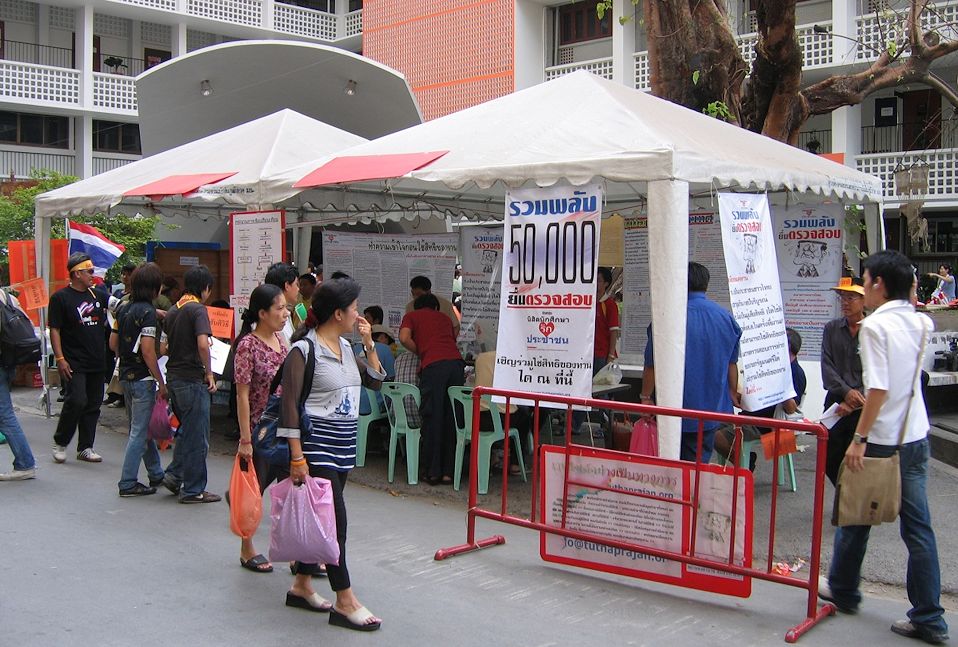
Abb.: Unterschriftensammlung für eine Petition gegen Ministerpräsident
Thaksin, Thammasat University (มหาวิทยาลัยธรรมศาสตร์),
Bangkok, 2006-03-05
[Bildquelle: Lerdsuwa / Wikimedia. -- Public domain]
2006-03-14

Der chinesische Volkskongress beschließt den neuen
Fünfjahresplan: das Wirtschaftswachstum wird auf 7,5% pro Jahr begrenzt, ein
Investitionsprogramm soll das Gefälle zwischen Stadt und Land verringern.
2006-03-14

Die US-Firma amazon startet amazon web services. Damit
beginnt das Zeitalter des Cloud-Computing im großen Stil.

Abb.: Konferenzankündigung 2013
[Fair use]
2006-03-15
Ein Strafgericht lehnt die Anklage der Shin Corp (ชิน
คอร์ปอเรชั่น) wegen Verleumdung gegen Supinya Klangnarong (สุภิญญา กลางณรงค์)
zurück. Supinya war in einer Zeitung mit der Aussage zitiert worden, dass
Ministerpräsident Shinawatra durch seine Gesetzgebung den Verkauf der Shin
Corp begünstigt habe. Das Gericht sagte, dass Supinyas Aussage durch die
Pressefreiheit geschützt sei.
2006-03-17
Kundgebung der Gelbhemden (เสื้อเหลือง).
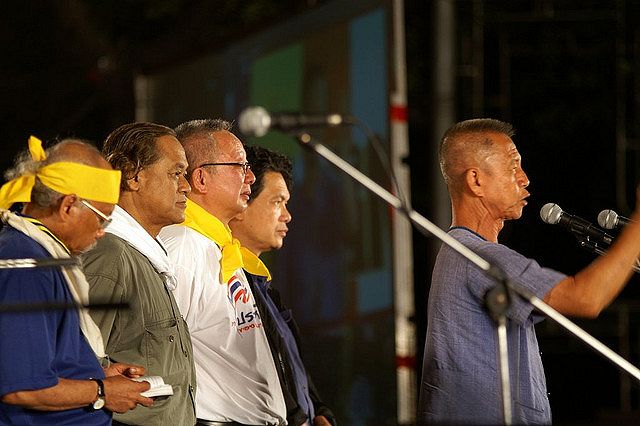
Abb.: Führer der Gelbhemden (เสื้อเหลือง):
von links: Somsak Kosaisuk
(สมศักดิ์ โกศัยสุข, 1945 - ),
Pipop Thongchai (พิภพ ธงชัย),
Sondhi Limthongkul (สนธิ ลิ้มทองกุล
/ 林明達,
1947 - ), Somkeit Phongpaibul (สมเกียรติ
พงษ์ไพบูลย์, 1950 - ), Chamlong Srimuang (จำลอง
ศรีเมือง, 1935 - )
[Bildquelle: Don Sambandaraksa. --
http://www.flickr.com/photos/49353237@N00/114148629/in/photostream/. --
Zugriff am 2012-10-18. --
Creative
Commons Lizenz (Namensnennung, share alike)]
2006-03-20
Banjerd Singkaneti (บรรเจิด สิงคะเนติ),
Assistant Professor of Law at Thammasat University (มหาวิทยาลัยธรรมศาสตร์),
Dr. jur. der Ruhr-Universität Bochum disqualifiziert sich mit folgender
Aussage:
"What makes Mr. Thaksin different from Adolf Hitler was that Hitler
did not do things for his own benefit. Hitler killed Jews, but he did
several things for his country. He was more useful for the country than
Mr Thaksin ever was." (Bangkok Post 2006-03-20)
Die Isralische Botschaft in Thailand protestiert zu Recht in einem
Leserbrief (Bangkok Post, 2006-03-23):
"Comparing Thaksin to Hitler shows ignorance or lack of knowledge of
history. After World War Two, it took years for many countries to
recover from the devastation caused by the Nazis. Several others have
not yet recovered. It is also to ignore the actual fact that millions of
people were murdered and suffered under the hands of the Nazi regime.
There is no similarity between Hitler’s dictatorship leading his country
to World War Two, and Thaksinomics."
2006-03-21
Ein wohl geistesgestörter, 27jähriger Mann zerstört
die Statue im Erawan-Schrein (ศาลพระพรหม)
Bangkoks. Zwei Straßenreiniger erschlagen ihn. Ministerpräsident Thaksin
ersetzt die Statue durch eine Metallstatue in einer feierlichen
Hindu-buddhistischen Zeremonie am 21. Mai.
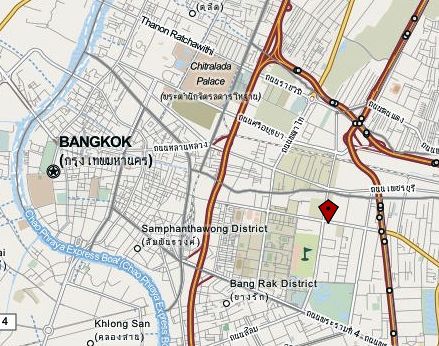
Abb.: Lage des Erawan-Schreins (ศาลพระพรหม)
[Bildquelle: OpenStreetMap. --
Creative
Commons Lizenz (Namensnennung, share alike)]
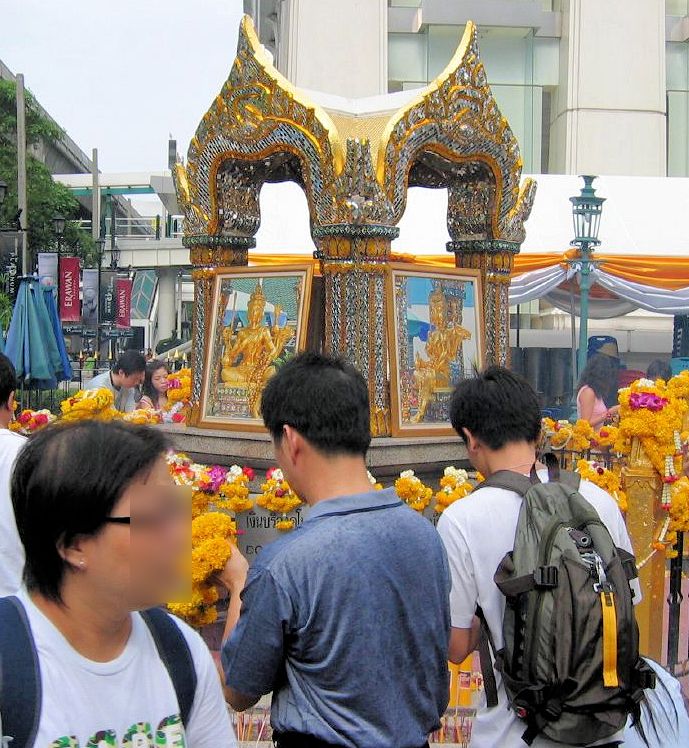
Abb.: Erawan-Schrein (ศาลพระพรหม):
die zerstörte Statue wird provisorisch durch Abbildungen ersetzt, 2006-05-20
[Bildquelle: Mica Monkey. --
http://www.flickr.com/photos/micamonkey/150896752/. -- Zugriff am
2012-01-08. --
Creative Commons Lizenz (Namensnennung, keine kommerzielle Nutzung,
share alike)]
| "Am frühen Morgen des 21. März 2006 gegen
halb zwei Uhr wurde die Statue des Erawan Brahma von einem angeblich
geistig gestörten thailändischen Moslem mit einem Hammer zerstört.
Der 27-jährige, dessen Name mit Thanakorn Phakdipon angegeben ist,
wurde nur Minuten später von zwei wütenden Passanten erschlagen. Die
Polizei stellte die beiden Passanten unter Mordanklage, sie wurden
am folgenden Tag auf Kaution aus dem Polizei-Gewahrsam entlassen.
Die Überreste der Statue wurden mit einem weißen
Tuch abgedeckt. Offizielle Stellen beklagten den zu erwartenden
Rückgang der Touristenzahlen, da doch viele Touristen hierher kämen,
um Phra Phrom (พระพรหม)
zu verehren. Premierminister Thaksin Shinawatra ordnete eine
Konferenz an, um das Vorgehen für die Restaurierung des beliebten
Schreins zu koordinieren. Angeblich soll spätestens in zwei Monaten
eine neue Statue hergestellt worden sein.
Am Sonntag, dem 21. Mai 2006 wurde dann die
restaurierte Statue in einer großen Feier wieder an ihrem
angestammten Platz aufgestellt. In einer festlich geschmückten
Parade wurde Thaomaha Phrom morgens um 7.29 Uhr von der Werkstatt
des Fine Arts Department abgeholt, und vorbei am Lak Mueang, dem Wat
Phra Kaeo und dem Bot Phram, dem Brahma Tempel an der Giant
Swing (gegenüber dem Wat Suthat), zur Ratchaprasong-Kreuzung
gebracht, wo sie gegen 11 Uhr ankam. Unterwegs wurde die Statue von
den zahlreichen Gläubigen am Straßenrand mit Girlanden aus gelben
Ringelblumenblüten (Calendula) und Jasmin behängt. Laut
Zeitungsberichten sollen mehr als 1.000 Menschen trotz strömenden
Regens der anschließenden Feier beigewohnt haben. Vier Brahmanen
vollführten zunächst eine Reinigungszeremonie, bevor zum vorher
kalkulierten Zeitpunkt um 11.39 Uhr die Statue in ihrem Schrein
enthüllt wurde.
Um zu verhindern, dass sich ein ähnlicher
Vorfall wiederholt, soll der Erawan-Schrein von einem 24-Stunden
Wachdienst bewacht werden."
[Bildquelle:
http://de.wikipedia.org/wiki/Erawan-Schrein. -- Zugriff am
2012-01-08] |
| "Political controversy
In the days following the
incident at Erawan Shrine, embattled Thai Prime Minister Thaksin
Shinawatra visited and paid his respects to the broken statue of the
deity.
At an anti-Thaksin rally
on 22 March, government critic Sondhi Limthongkul (สนธิ
ลิ้มทองกุล / 林明達)
charged that the destruction of the statue was a plot by a
superstitious Thaksin who was seeking to maintain power through
black magic.
The vandal's father
dismissed that notion, and was quoted by The Nation as saying
that Sondhi is "the biggest liar I have ever seen."
Thaksin, when asked to
comment on Sondhi's accusations, simply replied: "That's insane.""
[Quelle:
http://en.wikipedia.org/wiki/Erawan_Shrine. -- Zugriff am
2012-01-08] |
2006-03-21

Die US-Softwareentwickler Jack Dorsey (1976 - ),
Isaac "Biz" Stone (1974 - ), Evan Williams (1972 - ) und Noah Glass
gründen Twitter.

Abb.: ®Logo
2006-03-22
The Nation: "Thaksin era beset by evil omens"
"A man with a record of
mental disorder has just destroyed the sacred Phra Phrom statue of
the Erawan Shrine
[ศาลท้าวมหาพรหม โรงแรมเอราวัณ]
in downtown Bangkok. The famous four-headed statue of Brahma,
adjacent to the Grand Hyatt Erawan Hotel, has been hammered to
pieces.
It is a shock to thousands of worshippers who come to the shrine to
seek good fortune. Some people say the destruction of the statue is
just one of many evil omens hovering above the country.
The Thaksin Era,
characterised by unfettered capitalism and greedy economic growth,
has also been beset by bad omens. They manifest themselves in
different forms, symbols and natural disasters. If a leader does not
practise virtue and learning is absent among the populace, society
will head into a series of crises.
One of the natural
disasters in the Thaksin Era manifested itself as a plague
destroying the city, or "ha kin muang" [ห่ากินเมือง].
We witnessed SARS and subsequently bird flu. Then water started to
flood the world, or nam thuam lok [น้ำท่วมโลก].
This manifested itself in the tsunami which killed more than 100,000
people in Thailand and elsewhere around the Indian Ocean.
People are facing greater
hardship in their lives, a period characterised by skyrocketing
prices for basic necessities (khao yak mak phaeng [ข้าวยากมากแพง]).
Another bad omen is phan
din look pen phai [แผ่นดินลุกเป็นไฟ]
(land turns into fire), which has been happening to Thailand's three
southernmost provinces. There, murders take place every day. And
people are also suffering from phan din yaek [แผ่นดินแยก]
(cracks in the land),
as they take sides in fiercely opposed political opinions. The angel
has taken flight from the city. This is reflected in the destruction
of the Phra Phrom statue.
During the Ayutthaya [อยุธยา]
period, King Narai the Great [สมเด็จพระนารายณ์มหาราช]
(1656-1688) was believed to be the author of a poetic prophecy about
Ayutthaya's fall. The prophecy, which reflected his concern for the
Kingdom, recounted 16 bad omens that would foreshadow the fall of
the capital later in 1767.
The following is an
excerpt of King Narai's "Poetic Prophecy" (from Montri Umavijani's
[มนตรี อุมะวิชนี,
1941-2006]"Facets
of Thai Cultural Life", Bangkok: Kurusapa Business Organisation,
2000):
[...]
Samrit [สัมฤทธิ์]
Klomkliang, who claims he has been a long-time personal astrologer
for Thaksin's family, said the destruction of the statue was a sign
that there would be bloodshed in Thailand if the prime minister
doesn't quit before March 29.
But blood has already been
shed. A protester from Nakhon Si Thammarat [นครศรีธรรมราช],
Rerng Ketkaew [เก็จแก้ว],
slashed his finger to draw blood in front of Government House and
call for Prime Minister Thaksin Shinawatra's resignation.
Thanakorn Pakdeepol [ธนากร
ภักดีผล], the
27-year-old man who destroyed the Phra Phrom statue, was killed near
the Erawan Shrine after committing this most unnatural act. His
blood spread on the pavement. "
[Fair use] |
2006-03-23
Das Oberste Gericht verbietet Ministerpräsident
Thaksins Pläne, die staatliche Electricity Generating Authority of Thailand
(EGAT, การไฟฟ้าฝ่ายผลิตแห่งประเทศไทย)
zu privatisieren.
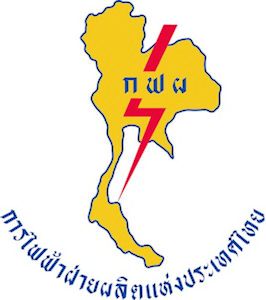
2006Abb.: ®Logo
2006-03-24
Affäre um eine Falschmeldung der Boulevard-Zeitung
Kom Chad Luek (คมชัดลึก)
| "Kom Chad Luek (Thai:
คมชัดลึก) is a
mass-circulation Thai-language daily newspaper launched in 2001 and published in
Bangkok, Thailand by the Nation Multimedia Group (บริษัท
เนชั่น มัลติมีเดีย กรุ๊ป จำกัด). Its circulation is in the
500,000-600,000 range. Kom Chad Luek became the target of mass protests
after it printed an article on March 24, 2006 that omitted part of a quote by
anti-government protest leader Sondhi Limthongkul (สนธิ
ลิ้มทองกุล / 林明達,
1947 - ), with the misquote suggesting
Sondhi wanted King Bhumibol Adulyadej to abdicate, which was viewed as an insult
to the king, or lèse majesté (ความผิดต่อองค์พระมหากษัตริย์ไทย), which is a crime in Thailand.
The paper published a front-page apology on March 30,
begging forgiveness from the king.
However, protests in front of the newspaper's offices
continued. The paper's editor Korkhet Chantalertlak (ก่อเขต
จันทเลิศลักษณ์) resigned in a show of
responsibility, the chief news editor was reassigned and the paper said it would
suspend publication for a total of five days, from March 31 to April 2 and on
April 8 and 9."
[Quelle:
http://en.wikipedia.org/wiki/Kom_Chad_Luek. -- Zugriff am
2012-06-08]
|
2006-03-28
Thirayuth Boonmee (ธีรยุทธ บุญมี, 1950 - )
in The Nation:
| "According to Thai
tradition, people can seek help from His Majesty. I have no
objection to that, and I don’t think those calling [for it] are
regressive ... [and,] theoretically speaking, [critics of royal
intervention] should step beyond the Western frame of thinking. His
Majesty the King can provide the final resolution or conclusion to
the conflict when all system of checks and balances have become
dysfunctional or the country faces grave crises such as the
uprisings of October 1973 or May 1992."
[Zitiert in: Kanokrat Lertchoosakul [กนกรัตน์
เลิศชูสกุล]: The rise of the Octobrists in
contemporary Thailand : power and conflict among former left-wing student
activists in Thai politics. -- New Haven : Yale University Southeast asia
Studies, 2016. -- 364 S. 23 cm. -- (Yale Southeast Asia studies ; monograph 65).
-- ISBN 9780985042943. -- Zugl. The London School of Economics and Political
Science, thesis 2012-09. -- S. 237. -- Fair use] |
2006-03-30
Premiere des Films Nong Theng Nakleng-pukhaothong (โหน่ง
เท่ง นักเลงภูเขาทอง) von Panich Sodsee (พาณิชย์ สดสี)
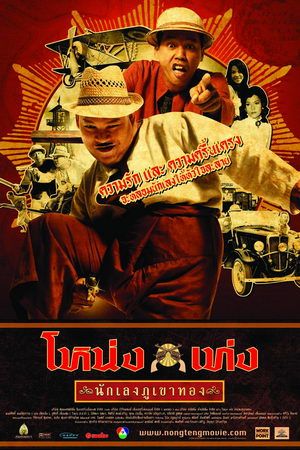
Abb.: Plakat
[Bildquelle: Wikipedia. -- Fair use]
|
"Nong Theng Nakleng-pukhaothong (Thai:
โหน่ง เท่ง นักเลงภูเขาทอง
or
Nong and Teng, the Gangsters of Golden Mount) is a
2006 Thai comedy film starring Pongsak Pongsuwan (พงศ์ศักดิ์
พงษ์สุวรรณ, 1966 -)
and Choosak Eamsuk (ชูศักดิ์ เอี่ยมสุข, 1973 - ).
Plot
In 1920s Siam, Bunteng (เท่ง), a member of a likay
(ลิเก) performing troupe,
is faced with the prospect of his art dying when he and his family are
threatened with eviction by a businessman who hopes to build a movie theater on
the site of their stage. At the same time, the first Hollywood film,
Miss
Suwanna of Siam (นางสาวสุวรรณ, 1923), is being made on location in the country. Seeing film as a
corruptive influence on traditional Siamese culture, Bunteng, with the help of
his gangster friend, Nong (โหน่ง), sets about to disrupt the filming and keep his family
from being evicted.
Cast
- Pongsak Pongsuwan (พงศ์ศักดิ์
พงษ์สุวรรณ, 1966 -) as Bunteng
(เท่ง)
- Choosak Eamsuk (ชูศักดิ์
เอี่ยมสุข, 1973 - ) as Nong (โหน่ง)
- Isaree Soungcharern (อิสรีย์
สงฆ์เจริญ) as Linchee (ลิ้นจี่)
- Nikalaya Dhunlaya (นิกัลยา ดุลยา,
1982 - ) as Nuenchan (นวลจันทร์)
- Nui Choenyeun (นุ้ย เชิญยิ้ม,
1974 -)
- Petchtai Wongkamlao (เพ็ชรทาย
วงษ์คำเหลา, 1965 - ) (cameo)"
[Quelle:
http://en.wikipedia.org/wiki/Nong_Teng_Nakleng-pukaotong.
-- Zugriff am 2013-03-24]
|
2006-04-01
Ca. 200 Motorrad-Taxi-Fahrer protestieren vor der
Manager-Media-Group (บริษัท แมเนเจอร์
มีเดีย กรุ๊ป
จำกัด) von Sondhi Limthongkul (สนธิ ลิ้มทอง กุล / 林明達, 1947 - ). Die
Protestierenden und Mitarbeiter der Group bewerfen sich gegenseitig mit
Flaschen.
2006-04-02

Wahlen.
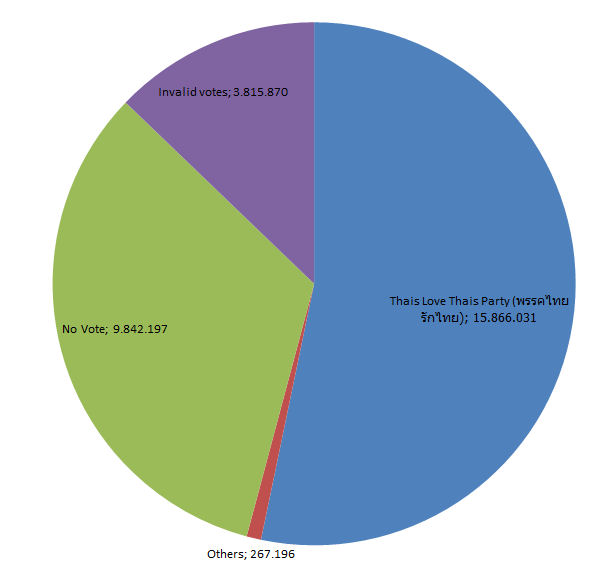
Abb.: Abstimmungsverhalten 2006
| Parties |
Votes |
% |
Seats |
| Thais Love Thais Party (พรรคไทยรักไทย) |
15.866.031 |
61.1 |
460 |
| Others |
267.196 |
1.1 |
- |
| No Vote |
9.842.197 |
37.9 |
- |
| Vacant |
|
|
40 |
| Democrat Party (พรรคประชาธิปัตย์) |
boycott |
| Thai Nation Party (พรรคชาติไทย) |
boycott |
| Great People's Party (พรรคมหาชน) |
boycott |
| Total valid votes (87.2 % of votes cast) |
25.975.424 |
100.0 |
500 |
| Invalid votes |
3.815.870 |
|
| Votes cast (turnout 65.2 %) |
29.791.294 |
|
| Registered voters |
45.663.089 |
|
| Source : Adam Carr using
MCOT website and other media websites. The TRT won
34.7 % of the registered voters. |
[Quelle:
http://en.wikipedia.org/wiki/Thai_general_election,_2006. --
Zugriff am 2011-11-04 |
| "General elections were held in Thailand on
April 2006. Elections for the lower house of the Thai National Assembly (รัฐสภาไทย), the
House of Representatives (สภาผู้แทนราษฎร), were held on 2 April 2006 and elections for the
upper house, the Senate (วุฒิสภาไทย), were held on 19 April 2006. The Constitutional
Court (ศาลรัฐธรรมนูญ) later invalidated the House of Representatives election results and
ordered a new round of voting. The ruling Thais Love Thais (TRT,
พรรคไทยรักไทย) party of Prime
Minister Thaksin Shinawatra (ทักษิณ ชินวัตร) won a majority seats in the House of
Representatives, partly as a result of the decision by the major opposition
parties to boycott the elections. Nearly complete results showed that TRT
won 61% of the valid vote and about 460 of the 500 seats. Despite this,
Thaksin announced his resignation two days after the election.
Although TRT easily won the election in terms of both
votes and seats, the results were seen by Thaksin's opponents and media
critics as a rejection of his call for an overwhelming mandate. In parts of
Bangkok and in southern Thailand, most TRT candidates were elected on
minority votes after the majority of voters used the "abstain" option on
their ballot papers. In a number of southern seats TRT candidates failed to
poll the required 20% of registered voters, rendering these southern seats
invalid and resulting in party dissolution charges against Thai Rak Thai and
Democrat Parties (พรรคประชาธิปัตย์). TRT won all the seats in the Northern and North-Eastern (Isan)
regions, and also in the Central region apart from Bangkok.
After Thailand's revered monarch His Majesty king
Bhumibol Adulyadej took an unusual but socially unifying step in declaring
the landslide elections undemocratic, the election was declared invalid by
the Constitutional Court, and new elections would have be held in October,
but were canceled by the military that led a coup against the Thai
government.
Background
The elections followed the decision by Prime Minister
Thaksin to dissolve the House of Representatives. King Bhumipol Adulyadej
granted Thaksin a dissolution even though the last election was held only in
February 2005, and even though Thaksin's party had a huge majority in the
House. At the February 2005 election, the TRT won 375 seats out of 500, with
its former coalition partner, the Thai Nation Party (พรรคชาติไทย) taking 26 seats. The
opposition Democratic Party of Thailand (พรรคประชาธิปัตย์) won 96 seats.
Thaksin's decision to call early elections followed a
mounting campaign of criticism of his personal financial dealings. In
January his family sold its stake in Shin Corporation (ชิน
คอร์ปอเรชั่น), a leading
communication company, for 73 billion baht (about $US1.88 billion), an
enormous profit on which the Shinawatras legally paid no tax. This sparked a
series of angry demonstrations in the capital. Nevertheless, Thaksin's
parliamentary position was under no threat.
The English-language newspaper the Bangkok Post
reported Thaksin as saying, "I cannot allow mob rule to supersede the law,"
and citing intelligence reports of "instigators of violence" seeking to
exploit the divisive situation as a reason for dissolving the House of
Representatives. The country could not suffer a new round of "bruises" when
it was still suffering from the violent events of May 1992, with relatives
of victims still to be healed, Thaksin said.
Thaksin also cited the impact on the economy of the
political situation, pointing to the questions it had raised about the
future of megaprojects and the ups and downs on the stock market. "I am
ready to accept the decisions of the people. But I will never accept those
outside the system who claim to be deciding for the people," he said.
Opposition
boycottOn 25 February the Post
reported Democrat party leader Abhisit Vejjajiva (อภิสิทธิ์
เวชชาชีวะ) as saying he was "ready to
become a prime minister who adheres to the principles of good governance and
ethics, not authoritarianism." The next day, however, it was announced that
the Democratic Party, along with other opposition parties, were considering
boycotting the elections. At a press conference Abhisit joined the Thai
Nation Party's Banharn Silpa-archa (บรรหาร
ศิลปอาชา) and the Mahachon Party's Sanan
Kachornprasart (สนั่น ขจรประศาสน์) and said that the three parties would consult with party
members before making a final decision.
Abhisit said that the elections "lacked legitimacy'
and were an attempt by Thaksin to "divert public attention." from the Shin
Corp scandal. "Boycotting the poll is one option but the parties still have
to explore other possibilities allowed by the constitution," he said. Thaksin's behaviour was "exposing the country to a new political system, the
Thaksin system, which bent the constitution,". Abhisit said. "The charter
was once the people's charter. Now it has been hijacked."
Banharn said the sudden dissolution left opposition
political parties "no time to prepare a list of constituency candidates and
list candidates." Only Thai Rak Thai was well-equipped with wealth, people
and power," he said.
On 27 February, the three opposition parties announced
a boycott of the election after Thaksin reportedly refused to sign a pledge
to implement constitutional reforms. The Bangkok Post reported
Abhisit as saying that "under the current circumstances" a fair general
election was unlikely. What was likely, he said, "was an election that would
yield the outcome Mr Thaksin was expecting."
"The prime minister does not respond to the intention
of the three political parties," Abhisit said. "He is diverting from the
heart of the solution and creating the process that sees only uncertainties
and complications. That does not assure us that there will be serious
political reform."
Deputy Thai Rak Thai leader Khunying Sudarat
Keyuraphan (สุดารัตน์ เกยุราพันธ์) said that the government was doing its best to find a way out of
the political crisis. "Dissolving the House to return power to the people is
the best way out under this constitution and democracy," she said. "But you
do not accept it. What better choice could Thai Rak Thai make?"
The decision by the Democratic Party and the Thai
Nation Party to boycott the elections meant that almost the whole of
southern Thailand lost its previous political representation, since at the
2005 election, Thaksin's party won only one seat in the south.
Results
Unofficial results published by Bangkok newspapers showed
that TRT polled over 61% of all valid votes (about 53% of all votes cast),
and won about 460 of the 500 seats. Voters in the Central, Northern and
North-Eastern regions voted overwhelmingly for TRT candidates, who were
unopposed in the great majority of seats in these regions. But the majority
of voters in Bangkok and in the Southern region rejected the government. In
many constituencies in these areas voters used the "abstain" option on their
ballot papers to reject TRT candidates, even when they were running
unopposed. TRT received fewer votes than the number of abstention votes in
28 of 36 Bangkok constituencies. In 2005, TRT won 30 of the Bangkok seats.
Disputing
the election resultOn 3 April 2006, the
People's Alliance for Democracy (PAD,
พันธมิตรประชาชนเพื่อประชาธิปไตย) petitioned the Administrative Court to
suspend the results of the election and accused the Election Commission (คณะกรรมการการเลือกตั้ง) of
violating voter privacy. The EC repositioned voting booths so that voters'
backs were to the public, whereas in previous elections, voters faced the
public, with a board one-half meter tall at the front of the booth
separating the voter from the public. The EC claimed the new arrangement was
designed to prevent various forms of poll fraud including the use of cameras
by voters to take photographs of their ballots. After the 2005 election,
cameras and cameraphones had been banned from voting stations due to fears
that canvassers would demand ballot photographs in return for money.
However, the PAD claimed that this allowed onlookers to peek over voters'
shoulders and see who they voted for.
After unofficial voting results became public, the PAD
declared that it would ignore the results of the election. He further said
that the "PAD will go on rallying until Thaksin resigns and Thailand gets a
royally-appointed prime minister".
The elections were finally declared invalid by
Thailand's Constitutional Court (ศาลรัฐธรรมนูญ), which found that the positioning of the
voting booths violated voter privacy. The Constitutional Court later
pressured the Election Commission to resign for its management of the April
elections. The Court was unsuccessful in pressuring the EC head to resign;
however, it did prevent the Senate from appointing a replacement for
commissioner Jaral Buranapansri who had died. This prevented the EC from
having a quorum. It later
found the remaining Commissioners guilty of malfeasance and jailed them.
On 30 May 2006, the Cabinet decided to hold new
elections on 15 October 2006."
[Quelle:
http://en.wikipedia.org/wiki/Thai_general_election,_2006. --
Zugriff am 2012-01-08]
|
2006-04-05 - 2006-05-23
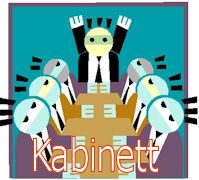
57. Kabinett: unter Geschäftsführung von Chitchai Wannasathit (ชิดชัย
วรรณสถิตย์ / 曹壁光,
1946 -).
| "Chitchai Wannasathit (* 13. August 1946 in Ubon
Ratchathani - อุบลราชธานี)
ist Politiker und war geschäftsführender Premierminister von
Thailand. Chitchai Wannasathit ist verheiratet mit Khunying
Archara Wannasathit.
Chitchai erhielt 1970 einen Bachelor in öffentlicher Verwaltung
an der Polizeikadetten-Akademie in Bangkok, 1973 einen Master in
Polizeiverwaltung an der Eastern Kentucky Administration University,
USA und 1976 eine Promotion in Justizverwaltung an der Justice
Administration University Louisville.
Zwischen 1970 und 1971 arbeitete Chitchai im Metropolitan Police
Bureau, Bangkok und war anschließend bis 1976 als Offizier dem Büro
des Polizeisekretärs beigegeben. Er arbeitete nach seiner Promotion
als ständiger Dozent an der Königlichen Polizeikadettenakademie.
Chitchai beschäftigte sich während seiner Arbeit insbesondere mit
der Drogenbekämpfung (Rauschmittel) und wurde 1983 Superintendent
bei der zentralen Untersuchungsbehörde.Schließlich wurde er
Beauftragter der Königlichen Polizei-Kadetten-Akademie und von 1997
bis 2000 Beauftragter bei der thailändischen Ausländerbehörde. Nach
mehreren Stellungen bei der Polizeibehörde wurde Chitchai am 2.
August 2005 zum stellvertretenden Premierminister und Justizminister
ernannt.
Während des Rückzuges Thaksin Shinawatras von den Tagesgeschäften
war Chitchai im April/Mai 2006 geschäftsführender Premierminister
von Thailand."
[Quelle:
http://de.wikipedia.org/wiki/Chitchai_Wannasathit. -- Zugriff am
2012-04-05] |
2006-04-07

Tod von Thawisan Ladawan (ทวีสันต์ ลดาวัลย์,
geb. 1923)
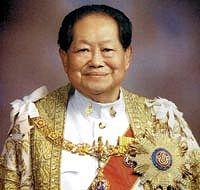
Abb.: Thawisan Ladawan (ทวีสันต์ ลดาวัลย์)
[Bildquelle: th.Wikipedia. -- Fair use]
| "Mom Luang Thawisan Ladawan (Thai:
ทวีสันต์ ลดาวัลย์)(1923-01-26
- 2006-04-07)
was husband of Busba Kitiyakara (บุษบา
กิติยากร สธนพงศ์, 1934 - , younger sister of Queen Sirikit), a member of
King Bhumibol Adulyadej's Privy Council (คณะองคมนตรีไทย), and for 26 years, principal private
secretary to the King. Thawisan attended Vajiravudh College (วชิราวุธวิทยาลัย) and graduated from
the inaugural class of Thammasat University (มหาวิทยาลัยธรรมศาสตร์)
in 1938. He worked in several
capitals, including Paris and Brussels, and earned a Diplome d'Etudes
Superieures de Droit International Public from Paris University (Université
de Paris) in 1954. He
became Deputy Director-General of the Protocol Department before departing in
1968 to serve as Deputy Principal Private Secretary to Bhumibol. A year later he
became Bhumibol's Principal Private Secretary, and was later appointed to the
Privy Council. He died at the age of 83 due to chronic liver disease.
Family
Thawisan was the son of Phraphum Phichai (Mom Ratchawong Bung
Ladawan) and Nuang Bunnag. His father (พระภูมิพิชัย) was the prince of Chaiyaphum, Lamphun, Mae
Hong Son, Pattani and Kamphaengphet (เจ้าเมืองชัยภูมิ ลำพูน แม่ฮ่องสอน
ปัตตานี และกำแพงเพชร ).
Thawisan married Busaba Kittiyakara in 1958. They had a
daughter, Suthawan Ladawan Sathirathai (ดร. ท่านผู้หญิง สุธาวัลย์
เสถียรไทย) in 24 September 1958. He divorced her
soon afterwards and never remarried. Suthawan married Surakiart Sathirathai (สุรเกียรติ์
เสถียรไทย, 1958 - )."
[Quelle:
http://en.wikipedia.org/wiki/Thawisan_Ladawan. -- Zugriff am
2012-06-15]
|
2006-04-10


Prinzessin Sirindhorn (มหาจักรีสิรินธร,
1955 - ) besucht zum 23. Mal die Volksrepublik China. Diesmal besucht
sie die Zhuang-Minorität (Bouxcuengh
/ 壮族)
in der Guangxi Zhuang Autonomous Region (广西壮族自治区
/ Gvangjsih Bouxcuengh Swcigih)
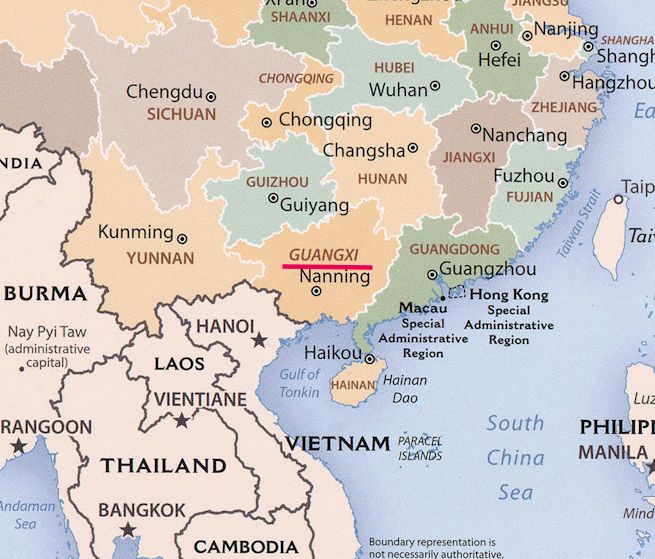
Abb.: Lage der Guangxi Zhuang Autonomous Region (广西壮族自治区
/ Gvangjsih Bouxcuengh Swcigih)
[Bildquelle: CIA. -- Public domain]
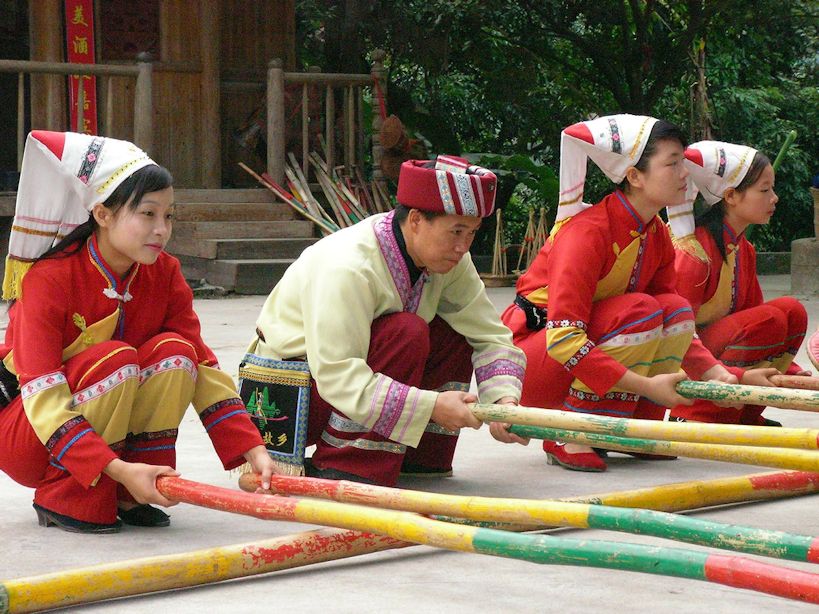
Abb.: Bambustanz der Zhuang (Bouxcuengh
/ 壮族),
2006
[Bildquelle: Rex Pe. --
http://www.flickr.com/photos/goldendragon613/298677919. -- Zugriff am
2014-10-30. --
Creative Commons Lizenz (Namensnennung)]
2006-04-12
Premiere des Films Thai Thief (ไทยถีบ)
von Pisut Praesangeam (พิสุทธิ์ แพร่แสงเอี่ยม)
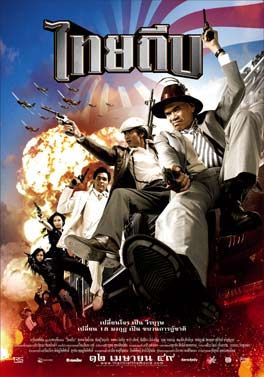
Abb.: Plakat
[Bildquelle: Wikipedia. -- Fair use]
|
"Thai Thief (Thai:
ไทยถีบ, also known as
Thai Theep) is a 2006 Thai action comedy film, directed by Pisut
Praesangeam (พิสุทธิ์
แพร่แสงเอี่ยม)
and starring Todsaporn Rottakij (ทศพร รถกิจ) and Sahatchai "Stop" Chumrum
(สหัสชัย ชุมรุม) . It was
distributed by RS Film and released on April 12, 2006. The film is set during
World War II in Thailand.
Plot
In World War II, Japanese troops occupied Southeast Asia with
the intention of making new colonies. Thailand was one country that allowed the
Japanese troops to transport their weapons and gold via train. For Kom, a well-known
Thai thief, this was the perfect opportunity to commit a crime. Meanwhile, Toe,
the leader of an anti-Japan movement has a plan to stop the train, but the
situation becomes more difficult when Kom and Toe (โต ) are forced to help a secret
agent from being captured by the troops.
Cast
- Sahatchai "Stop" Chumrum
(สหัสชัย ชุมรุม) as Laem 18 Uan (แหลม 18 อวน)
- Sara Leigh (1984 - ) as Seena
- Amthida Ngoencharoen (อัมธิดา
เงินเจริญ) as Patty (แพ๊ตตี้)
- Suthep Po-ngam (สุเทพ
โพธิ์งาม,
1949 - ) as Toe (โต )
- Todsaporn Rottakij (ทศพร รถกิจ) as Kom
- Somlek Sakdikul (สมเล็ก
ศักดิกุล, 1953 - )
as General Sant
- Than Thanakorn (ธัญญ์ ธนากร, 1980
- ) as Yai Thaareu"
[Quelle:
http://en.wikipedia.org/wiki/Thai_Thief. --
Zugriff am 2013-03-24]
|
2006-04-13

NZZ: Tourismus: Luxus und Lebensfreude im Land des Lächelns : Das
thailändische Gesundheitshotel Chiva-Som (ชีวาศรม) bietet "Holistic Wellness"
in tropischem Ambiente / von Friedemann Bartu
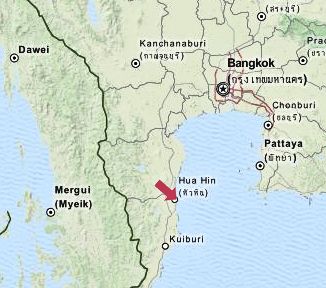
Abb.: Lage des Chiva-Som (ชีวาศรม)
[Bildquelle: OpenStreetMap. --
Creative
Commons Lizenz (Namensnennung, share alike)]
2006-04-17

Titelgeschichte des US-Nachrichtenmagazins TIME:
Thailand's silk revolution : Thaksin Shinawatra won the election, but it did
him not good. What does the Prime Minister's departure mean for Thai
democracy?
2006-04-18 - 2006-04-25
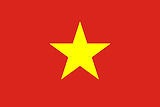
Parteitag der Kommunistischen Partei Vietnams.
- Nguyễn Minh Triết (1942 - ) wird Staatspräsident Vietnams
- Nguyễn Tấn Dũng (1949 - ) wird Ministerpräsident Vietnams,
- Nông Đức Mạnh (1940 - )
wird als
Generalsekretär der Kommunistischen Partei Vietnams bestätigt.
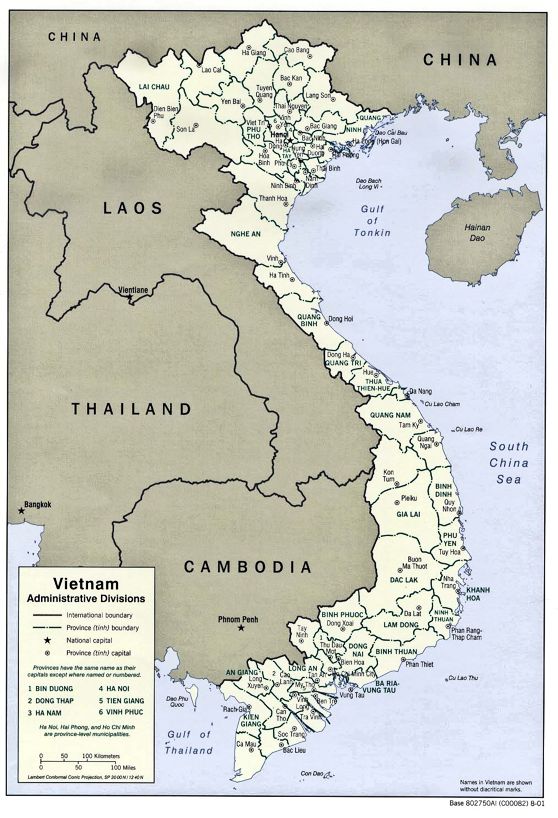
Abb.: Vietnam
[Bildquelle: CIA. -- Public domain]
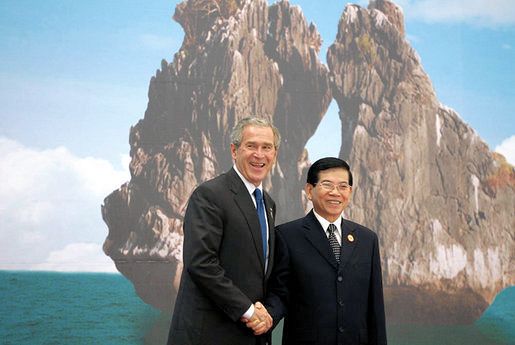
Abb.: Staatspräsident Nguyễn Minh Triết mit US-Präsident George W. Bush,
2006-11-18
[Bildquelle: White House photo by Paul Morse / Wikimedia. -- Public domain]
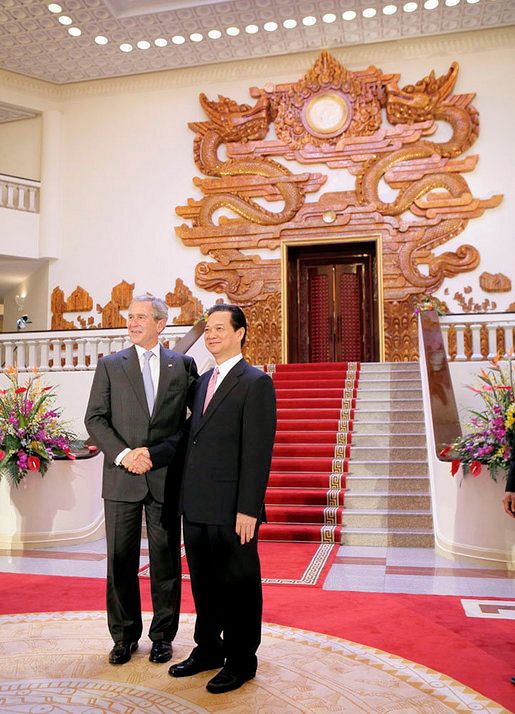
Abb.: Ministerpräsident Nguyễn Tấn Dũng mit US-Präsident George W. Bush,
2006-11-17
[Bildquelle: White House photo Eric Draper / Wikimedia. -- Public domain]
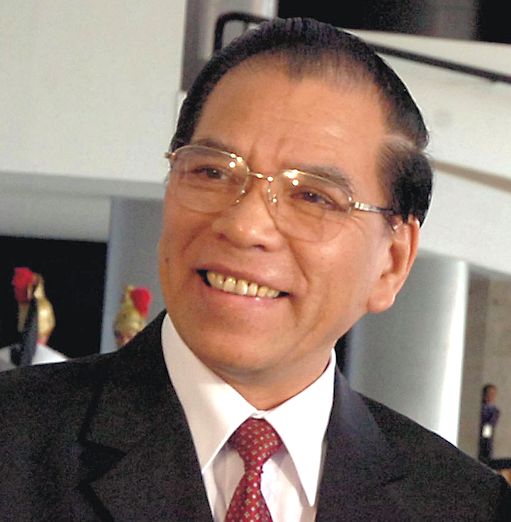
Abb.:
Partei-Generalsekretär Nông Đức Mạnh, 2007
[Bildquelle: Roosewelt Pinheiro / Agência Brasil / Wikipedia. --
Creative
Commons Lizenz (Namensnennung)]
2006-04-19
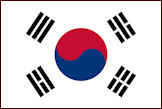
Frau Han Myung-sook (한명숙,
1944 - ) wird Ministerpräsidentin von Südkorea.
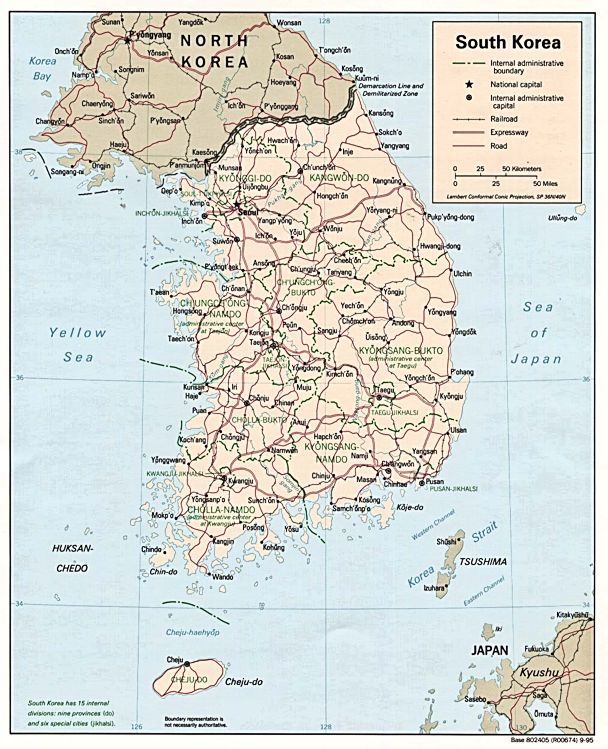
Abb.: Südkorea
[Bildquelle: CIA. -- Public domain]
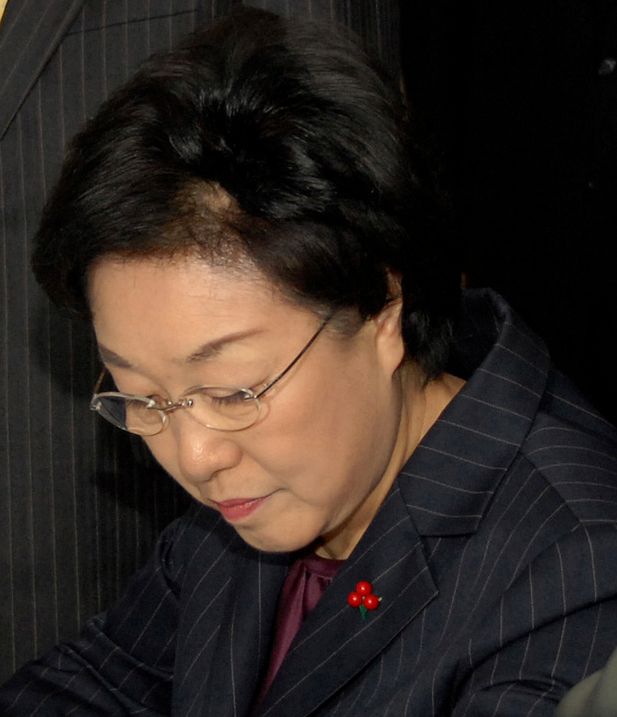
Abb.: Han Myung-sook (한명숙),
2006
[Bildquelle: U.S. Air Force photo by Airman 1st Class Chad Strohmeyer
/ Wikipedia. -- Public domain]
2006-04-21

Elizabeth the Second, by the Grace of God, of the United Kingdom of
Great Britain and Northern Ireland and of her other realms and territories
Queen, Head of the Commonwealth, Defender of the Faith wird 80 Jahre
alt.
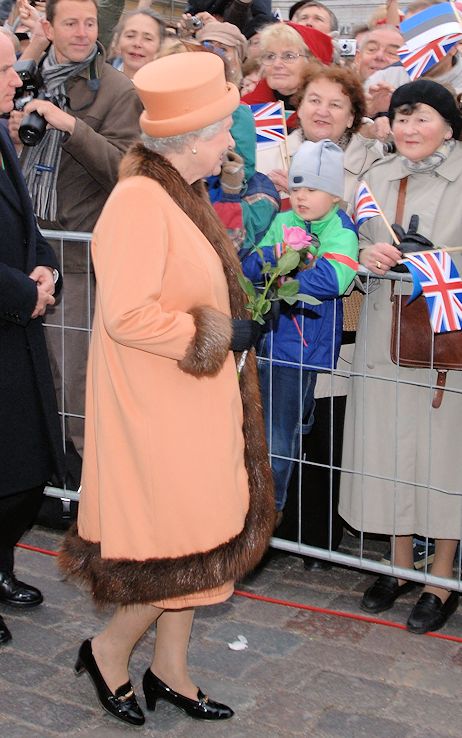
Abb.: Elizabeth the Second, by the Grace of God, of the United Kingdom of
Great Britain and Northern Ireland and of her other realms and territories
Queen, Head of the Commonwealth, Defender of the Faith, 2006
[Bildquelle: Estonian Foreign Ministry. --
http://www.flickr.com/photos/estonian-foreign-ministry/1808114928/. --
Zugriff am 2012-01-04. --
Creative
Commons Lizenz (Namensnennung)]
2006-05

Tod von Urairat Soimee (อุไรรัตน์ สร้อยมี, geb
1968).
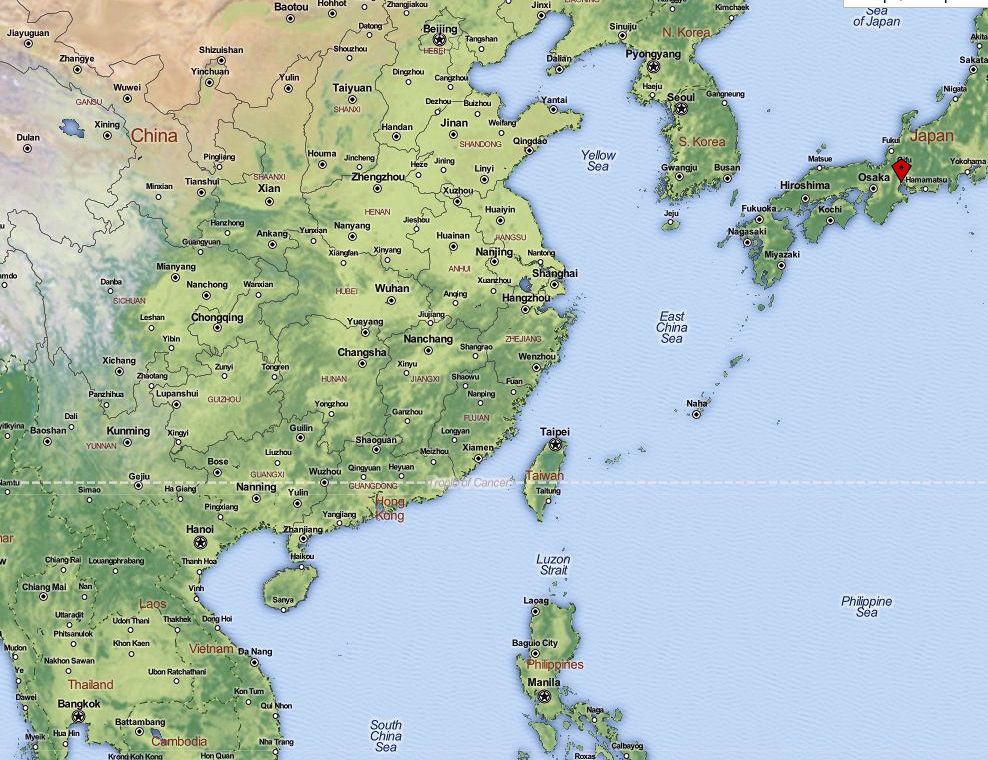
Abb.: Lage von Yokkaichi
(四日市市),
Japan
[Bildquelle: OpenStreetMap. --
Creative
Commons Lizenz (Namensnennung, share alike)]
|
"Urairat Soimee (อุไรรัตน์ สร้อยมี) (1968 - May
2006) was a victim of human trafficking in Japan. She was from Phetchabun's (เพชรบูรณ์) Lom
Sak (หล่มสัก) district in Thailand and had lived in Yokkaichi
((四日市市), a town in the Mie
Prefecture (三重県) of Japan, where she was forced into prostitution. She was
incarcerated for several years in a Japanese prison until she was released in
September 2005 due to the development of a terminal form of ovarian cancer. She
was allowed to return to her hometown in Thailand to spend her final days with
her family. Upon her return, she filed a civil lawsuit against her traffickers
in Thailand, reported to be the first suit of its kind in the country. However,
she died in May 2006 at the age of 38 before the case was adjudicated. Her
adoptive mother has said that she will continue her case in court.
Background
Urairat Soimee was born in the Lom Sak district of Phetchabun,
Thailand. She had three children and a husband, who became disabled due to a car
accident. Like many women in her village, she was poor and had little formal
education. She went by the nickname "Bua" (บัว), which means "lotus flower" in Thai.
Urairat was recruited to work in Japan by a wealthy
neighbor, Patama Kosaka, who was also a childhood friend of Urairat's mother.
Kosaka claimed that she was married to a Japanese man and that she owned a Thai
restaurant in Japan where she wanted Urairat to work as a waitress. Urairat had
no radio or television and little formal education, and therefore was not aware
of the many cases in which women from Thailand were tricked or coerced into
prostitution abroad.
Forced prostitution
in JapanUrairat arrived in Japan in 2000 and
was transported to Yokkaichi, Mie Prefecture by a Thai woman named Dao and her
husband, where she was told that she would have work as a prostitute. When she
attempted to protest, she was told that if she did not comply, she would be sold
to a brothel on an island and thrown into the sea if she tried to escape.
Urairat was told that she could leave after paying off her debt within five
months. During this time, she was locked in the apartment with other Thai sex
slaves, and taken out by Dao, her pimp, to hotel rooms to service customers,
ranging from three to six a day. She was forced to service customers while
menstruating, and even after having contracted a painful sexually transmitted
disease.
However, at the end of five months, Dao refused to release
her, saying that she had been sold to another yakuza
(ヤクザ) gang and that her debt had
increased. It was then that she contacted another Thai sex slave, Pranee, and
another Thai friend, Boon, to help her escape.
Escape and incarceration
The circumstances surrounding the killing of Dao and
Urairat's escape are unclear. In an interview with the Bangkok Post, Urairat
claimed that her Thai friend, Boon, came over to the apartment and helped her
escape, and that Boon eventually killed Dao to prevent her from going to the
yakuza. However, the Kyodo news service
(共同通信社) reported that Japanese prosecutors
accused Urairat of robbery and murder by smashing Dao's head with a bottle.
Despite pleas from human rights organizations, Boon was
sentenced to 10 years in prison for his role in the murder, and Urairat was
sentenced for seven years. While in prison, she developed a terminal form of
ovarian cancer and was released from custody to spend her remaining days with
her family in Thailand.
Court battle and
final daysPatama and her parents, the three
traffickers who deceived Urairat and Pranee into coming to Japan, were sentenced
to 13 years imprisonment in criminal court. Urairat also filed a 4.6 million
baht civil lawsuit against the three, reported to be the first of its kind in
Thailand. However, Urairat died in May 2006 before her case was adjudicated. Her
adoptive mother, Lamyai Kaewkerd, has vowed to continue her battle in court.
Upon her return to Thailand, Urairat became a strong voice
against human trafficking, leading a campaign that urged other victims to step
forward. She earned an award from Thailand's Social Development and Human
Security Ministry in March 2006 to celebrate International Women's Day for her
work in fighting human trafficking.
"My wish is for the government and all sides to get tough
with human trafficking rackets, the same way it suppresses drugs", she was
quoted as saying. "I want my last wish to be fulfilled. It is not only a gift
for me, but also for women in general because they shouldn't live through a
hellish experience like I have.""
[Quelle:
http://en.wikipedia.org/wiki/Urairat_Soimee. -- Zugriff am 2012-06-16]
|
2006-05-02
Skandal bei der Bewertung des Ordinary National
Education Test (O-NET) und des Advanced National Education Test (A-NET) in
Englisch und Mathematik: versehentlich wurde bei der Auswertung eine
Höchstpunktezahl von 125 statt von 100 vorausgesetzt. Entsprechend miserabel
fielen die angeblichen Ergebnisse aus. Es kam aber auch vor, dass eine
Schülerin statt der 100 möglichen Punkte 580 bekam.
"In general, Thailand uses the centralized admission
system. In this system, student hoping to finish secondary school or its
equivalent is expected to sit many examinations. The one required for nearly
all universities is the Ordinary National Education Test (O-NET) aiming to
test basic knowledge across the following subjects required under the Thai
law:
- Thai Language and Literature
- English Language
- Mathematics
- Comprehensive Sciences
- Social Studies
- Health Education
- Arts and Culture
Students then may use the O-NET test score to apply to
particular university through the direct admission system by taking tests
conducted by particular university. However, most students still use the
centralized admission system. In this system, they are expected to take
another two aptitude tests, aiming at testing their ability to succeed in
university. The first one is General Aptitude Test (GAT). GAT tests the
reasoning ability and English proficiency of the candidates. It asks
students to link and identity relationships between events. The English
section is comparable to the TOEFL test, but is completely objective in
nature. Both O-NET and GAT examinations are scored by computer.
The second examination is the Professional Aptitude
Test (PAT). Students may choose to take the tests that are required by the
program they are applying to. Therefore, they don't have to take all tests
like the O-NET. The subjects offerred are as follow:
- Advanced Mathematics, testing students ability in
discrete mathematics, pure mathematics, and discriptive mathematics,
including Calculus and Statistics. The test is completely objective,
consisting of multiple choices and student-produced response.
- Sciences. It is divided into three section,
Physics, Chemistry, and Biology. Students must take all sections. The
test is completely objective. It contains mostly multiple choices
question but sometimes student-produced response as well.
- Engineering Aptitude. It tests candidates'
ability in Physics and Chemistry as well as their ability to apply their
knowledge. The test is completely objective, consisting of multiple
choices and student-produced response.
- Architecture Aptitude. It tests candidates'
ability in non-numerical Physics and aptitude in basic arts and design.
There are questions that ask students to design a room with furniture
given. These questions are completely objective and are scored by
computer. The test contains a subjective section, testing candidates'
ability to sketch and draw
- Education-specific Professional Aptitude. It
tests students' moral standard and ability to work with students as
teacher.
- Fine and Applied Arts. It tests candidates'
knowledge in the visual art, music theory, performance arts. It
- Languages. As English is already tests in GAT,
PAT tests candidates' ability in other modern languages. Candidates can
choose from French, German, Japanese, Chinese, Arabic, and Pali.
The students are responsible to report all scores to
the central admission system. They are required to choose a program or
faculty that they want to study in. After that, different mathematical
formula is used to weighed students' scores for that program. For instance,
Pharmacology requires high scores on Sciences, while Economics requires high
score in Mathematics. After the score is weighed, students are offered
decision only according to their scores. Some exception might occur in
program, such fine and applied arts as students are required to submit
portfolio for consideration.
The only exception to centralized admission system and
direct admission system is Medicine and Dentistry, which have their own
admission system. Students will need to take the following tests to be
eligible for consideration:
- Mathematics
- Thai Language and Literature
- English
- Physics
- Chemistry
- Biology
- Social Studies
- Medicine and Dentistry-specfic Aptitude Test.
This tests include a hard form of reasoning tests as in first part of
GAT. It also includes tests of Ethics and reading analysis and synthesis.
In Ethics section, students are asked to choose 3 most "ethical"
decision based on the situation described. In reading synthesis section,
they are given time to read an article, then article is taken away. They
are asked to answer multiple choices question on the passage.
Students' scores are also weighed, and admission
decision is made accordingly."
[Quelle:
http://en.wikipedia.org/wiki/University_and_college_admissions#Thailand.
-- Zugriff am 2012-01-08]
|
2006-05-08

Das Verfassungsgericht erklärt die Wahl vom 2. April
für verfassungswidrig und nichtig. Das Urteil ist aufgrund einer
Intervention des Königs zustande gekommen.
2006-05-09
Tod von Punya Thitimajshima (ปัญญา ฐิติมัชฌิมา,
geb. 1955), Miterfinder der Turbo Codes.
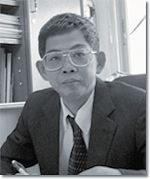
Abb.: Punya Thitimajshima (ปัญญา ฐิติมัชฌิมา)
[Bildquelle:
http://www.kmitl.ac.th/dslabs/TurboCodes/. -- Zugriff am 2012-06-11. --
Fair use]
|
"Punya Thitimajshima (9 November 1955 - 9 May 2006),
a Thai professor in the department of telecommunications engineering at King
Mongkut's Institute of Technology at Ladkrabang (สถาบันเทคโนโลยีพระจอมเกล้าเจ้าคุณทหารลาดกระบัง), is the co-inventor with Claude
Berrou and Alain Glavieux of a groundbreaking coding scheme called turbo codes.
Thitimajshima was educated at King Mongkut's Institute of
Technology at Ladkrabang, where he earned his Bachelor's degree in control
engineering and Master's degree in electrical engineering. Later he went to
École Nationale Supérieure des Télécommunications de Bretagne and Universite de
Bretagne Occidentale in France, where he studied telecommunications engineering
and received a doctoral degree in 1993 for a dissertation titled "Systematic
recursive convolutional codes and their application to parallel concatenation."
Thitimajshima joined the faculty of KMITL in 1995 as a lecturer, and became
associate professor.
He was the recipient of the 1998 Golden Jubilee Award for
Technological Innovation from the IEEE Information Theory Society together with
Berrou and Glavieux.[1] In 2003 he
received the Outstanding Technologist Award presented by the Foundation for
Promotion of Science and Technology under the Patronage of His Majesty the King
of Thailand. He died on 9 May 2006 at the age of 51 from illness."
[Quelle:
http://en.wikipedia.org/wiki/Punya_Thitimajshima. -- Zugriff am
2012-06-11]
|
2006-05-11


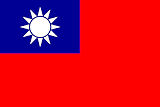
Telegramm der US-Generalkonsulin in Chiang Mai (เชียงใหม่),
Beatrice (Bea) Camp, an das US-Außenministerium:
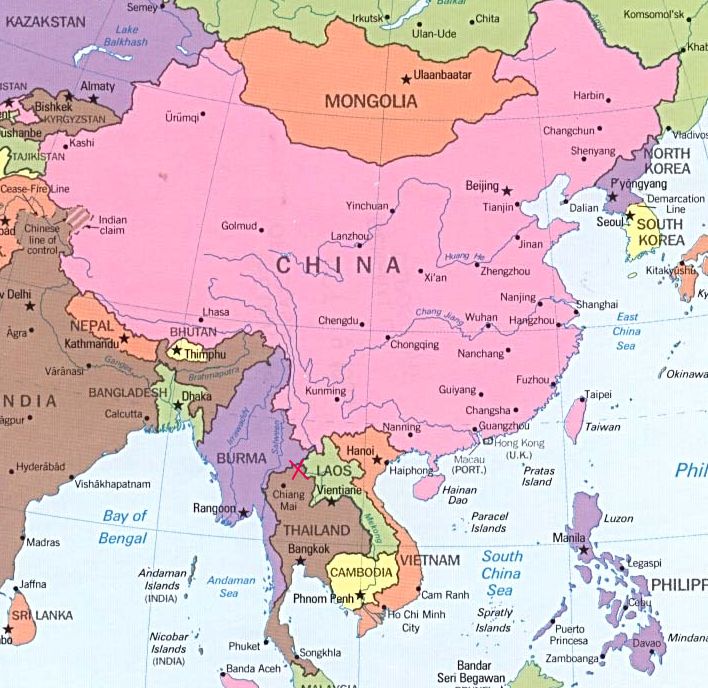
Abb.: Lage von Chiang Rai [เชียงราย
/ เจียงฮาย]
[Bildquelle: CIA. -- Public domain]
1. Summary. As the
Thai province closest to China and a historical center for
former Kuomintang forces, Chiang Rai [เชียงราย
/ เจียงฮาย]
has long had schools - often unofficial
ones - teaching Chinese language. Building on this heritage,
the province is striving to position itself as a center of
Chinese language learning, with support both from the
People's Republic of China (PRC) and Taiwan. More and more
schools and universities in the region are adding Chinese
programs to meet parent and student demand, although English
remains the most popular foreign language. End summary.
2. With business
and family ties to nearby China, Chiang Rai is actively
encouraging Chinese learning and use as part of its
"Provincial Economic Strategic Plan." Business people
trading with China are the biggest promoters behind this
development. According to prominent Chiang Rai businessman
Anan Laothammatas [อนันต์
เหล่าธรรมทัศน์],
Chinese traders want to communicate with Thai traders
directly, making Chinese language skills a crucial part of
doing business in the Mekong region.
3. Official
promotion, parental aspirations and actual practice are not
in complete accord, however, as Anan admitted that his own
children attend a prestigious Thai school in Bangkok. His
brother, former Mahachon party leader Anek Laothammatas
[เอนก
เหล่าธรรมทัศน์, 1954 - ],
sends his children to a tri-lingual Thai, English and
Chinese school in Bangkok but intends them to pursue higher
education in the U.S. Nevertheless, a growing number of
schools in northern Thailand are opening Chinese language
classes and scrambling to recruit scarce Chinese-qualified
teachers to meet parental demand.
KMT [Kuomintang
- 中國國民黨]
villages turn to tourism
4. Chiang Rai
municipality, a sister city of Yunnan's [云南]
Jinghong [景洪],
erected street signs in Chinese as well as Thai and English
in 2002; the leaders of the Chamber of Commerce, many from
southern Chinese roots, have learned Mandarin for business
purposes. Areas such as Mae Salong [แม่สลอง],
where Chinese Nationalist Kuomintang (KMT) communities
settled in 1961, are now "tourism villages"; bus loads of
tourists from Taiwan come to buy tea and visit the KMT
Martyrs Memorial while Thai tourists enjoy Yunnanese food
and mountain temperatures.
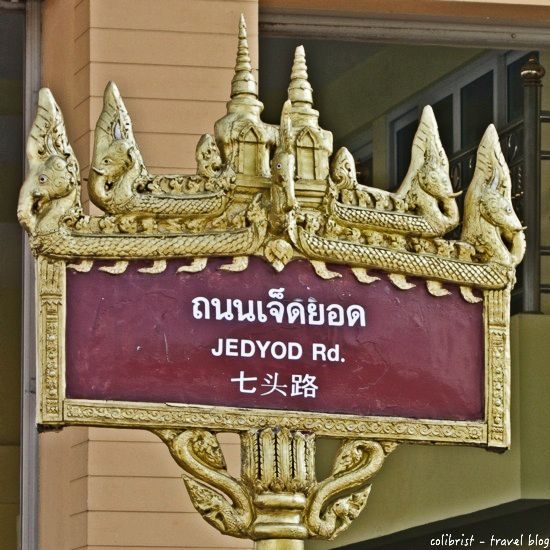
Abb.: Straßenschild, Chiang Rai
[Bildquelle. colibrist. --
https://colibrist.wordpress.com/2014/12/26/chaing-rai-white-temple-black-house/.
-- Zugriff am 2015-04-05. -- "All photos in this blog are
mine unless otherwise stated. You can use them but please
link back."]
5. The provincial
education office is completing a year-long effort to develop
Chinese language text books for schools in Chiang Rai. The
local office receives no support from the Thai Ministry of
Education (MOE), which, despite official pronouncements
promoting Chinese language learning, is just starting to
develop curricular materials. Until the end of the communist
insurgency in the early 1980s, the MOE monitored schools
teaching Chinese because of national security concerns.
Today the same ministry is promoting Chinese as the second
most important foreign language for Thai students.
6. Both Taiwan and
the PRC assist schools and curriculum in the province.
Schools in the Mae Sai [แม่สาย],
Mae Fah Luang [แม่ฟ้าหลวง],
Mae Chan [แม่จัน],
and Chiang Saen [เชียงแสน]
areas with traditional KMT connections receive support from
Taiwan while higher educational institutes such as Mae Fah
Luang University [มหาวิทยาลัยแม่ฟ้าหลวง]
(MFLU) and Chiang Rai Rajabhat University [มหาวิทยาลัยราชภัฏเชียงราย]
look to the PRC for assistance and partnership. MFLU
received US $1.5 million from the PRC several years ago to
build the Sirindhorn Chinese Language and Cultural Center [ศูนย์ภาษาจีนและวัฒนธรรมศิรินธร]on
campus.
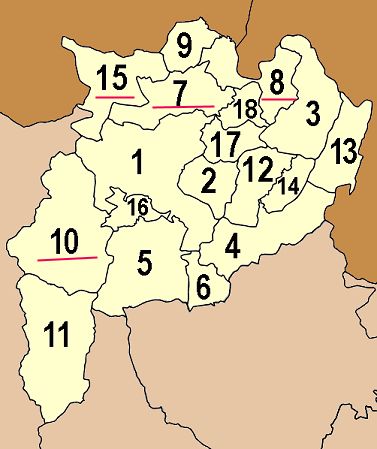
Abb.: Lage von
Mae Sai (9) [แม่สาย],
Mae Fah Luang (15) [แม่ฟ้าหลวง],
Mae Chan (7) [แม่จัน],
und Chiang Saen (8) [เชียงแสน]
[Bildquelle: Ahoerstemeier / Wikimedia. -- GNU FDLicense]
Using Confucius to
market Chinese language and culture
7. Chinese Consul
Jin Yilin told the Consul General that MFLU recently signed
an agreement with Xiamen University [厦门大学]
to establish a Confucius Institute [孔子学院],
one of approximately 50 worldwide and an expected three in
Thailand promoting Chinese language and culture. She
predicted that the MFLU institute will open before another
Confucius Institute planned at Chiang Mai University [มหาวิทยาลัยเชียงใหม่]
with Yunnan Normal University [云南师范大学]
because "we gave MFLU a lot of money when I was Thai desk
officer."
8. The growing
popularity of Chinese language has led to MOE efforts to
increase funding and exert greater control, although the
shortage of qualified teachers remains an obstacle. The Thai
government is particularly interested in remote schools
located in former KMT villages that were long neglected by
Thai authorities and still use textbooks and teachers from
Taiwan. In an effort to standardize the curriculum, the
Ministry is now developing 12 Chinese language texts in
cooperation with Yunnan Normal University.
9. Although
support from the PRC usually takes the form of
university-to-university agreements, the two governments are
also co-funding a program to send Thai teachers for
refresher training in China. However, a Chinese offer to
increase the number of training slots to1,000 per year has
highlighted the human resource shortage, as the MOE worries
where it will find this many Thai teachers of Chinese.
10. Comment.
Chiang Rai has
proclaimed itself a gateway to the Greater Mekong Subregion
[大湄公河次区域经济合作]
and made Chinese language teaching a priority for local
schools. Unregistered schools once considered illegal are
now being asked to prepare textbooks for teaching Chinese,
giving the program in Thailand's northernmost province a
reason to flaunt the Chinese connections that once made the
province suspect on national security grounds. Despite this
local boosterism, however, a lack of qualified teachers and
the still-greater appeal of English suggest Chinese will
remain the second most popular foreign language in the
foreseeable future.
CAMP"
[Quelle:
https://wikileaks.org/plusd/cables/06CHIANGMAI74_a.html. --
Zugriff am 2015-04-05] |
2006-05-15
Central Group kauft von der Britischen Botschaft in
der Wireless Road (ถนนวิทยุ, Witthayu Rd.) 8,8 Rai (ไร่,
14.080 m²) Land für angeblich 3,5 Milliarden Baht. Der
Quadratmeterpreis wäre fast 250.000 Baht. Es ist der höchste Grundstückpreis
Thailands.
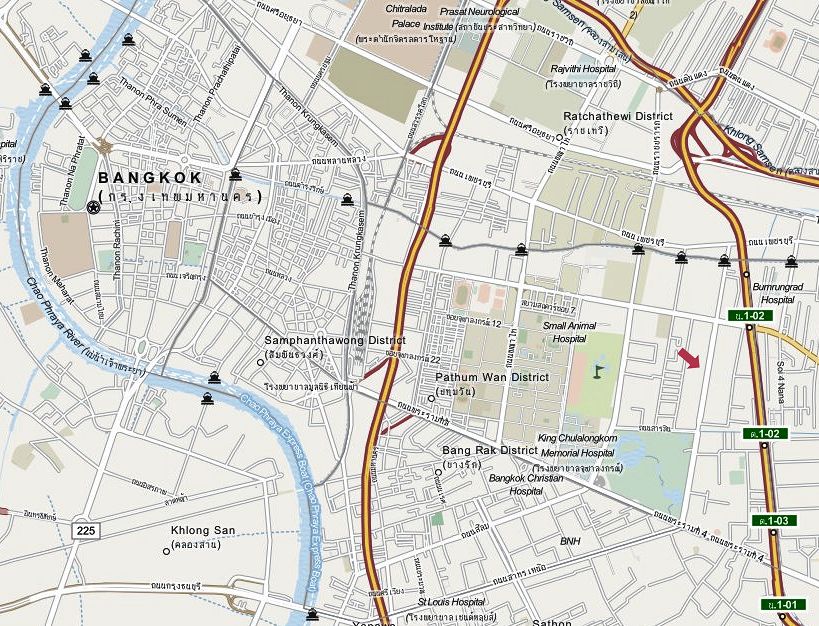
Abb.: Lage der Wireless Road (ถนนวิทยุ, Witthayu
Rd.)
[Bildquelle: OpenStreetMap. --
Creative
Commons Lizenz (Namensnennung, share alike)]
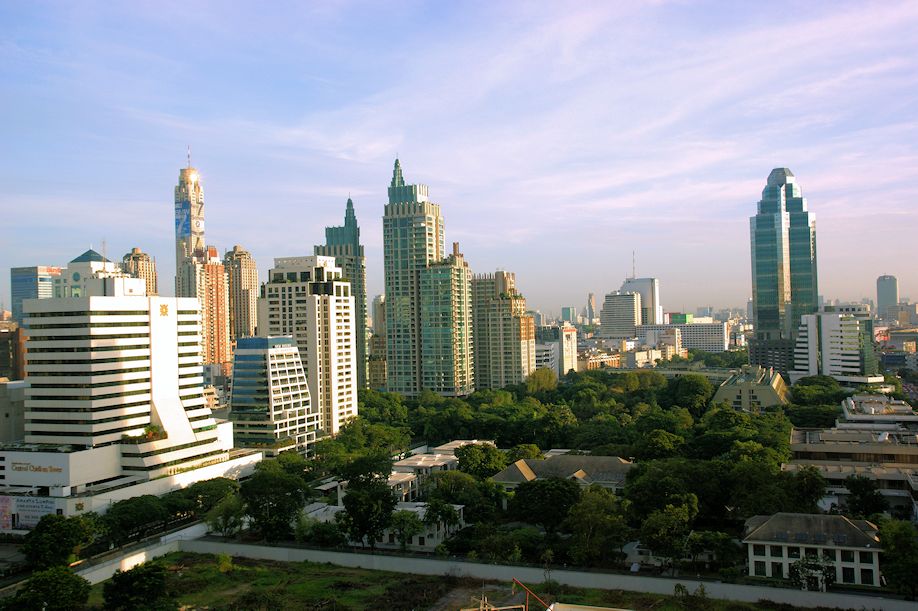
Abb.: Wireless Road (ถนนวิทยุ, Witthayu
Rd.), 2009
[Bildquelle: Allie_Caulfield. --
http://www.flickr.com/photos/wm_archiv/3938044243/. -- Zugriff am
2012-04-26. --
Creative Commons Lizenz (Namensnennung)]
2006-05-16
Es erscheint:
รายงานคณะกรรมการอิสระเพื่อความสมานฉันท์แห่งชาต์
เอาชนะความรุนแรงด้วยพลังสมานฉันท์ =
Overcoming violence through the power of reconciliation : Report of
the National Reconciliation Commission (NRC). -- Inoffizielle
Übersetzung:
http://thailand.ahrchk.net/docs/nrc_report_en.pdf. -- Zugriff am
2016-03-16
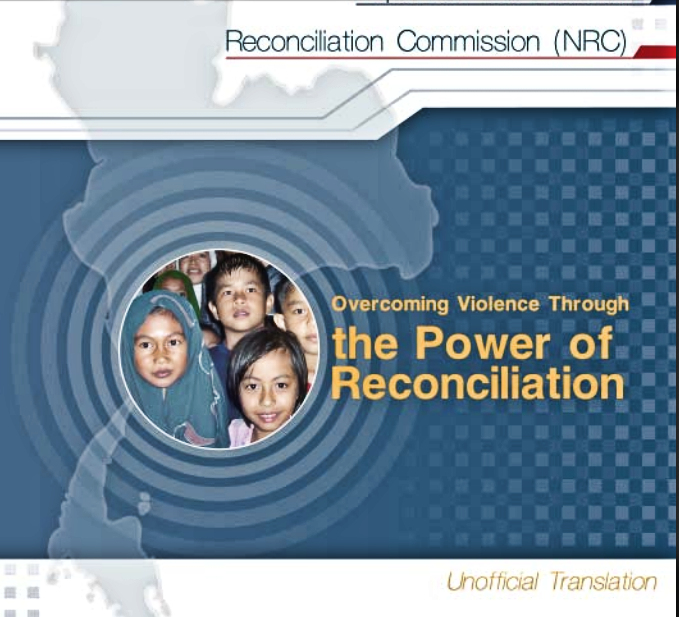
Abb.: Titelblatt
| "Content
Chapter 1: The Story of
Yosathorn and Ammana
Chapter 2: Explaining
Violence in the Southern Border Provinces: A Conceptual Framework
Chapter 3: Diagnosis:
Understanding Violence in the Southern Border Provinces
- The agency layer
- Structural Layer: Law
Enforcement, Local Economy, Education, Population and Border
Area Geography
- Cultural Layer:
Language-Religion and History
- Summary of causal
diagnosis
Chapter 4: Prognosis of
Violence Phenomenon
- Prognosis based on
various parties’ projections and statistics
- Prognosis based on
two sets of relationship
- Ending prognosis of
violence with victories of Thai society
Chapter 5: Solving Violence
with Reconciliation Proposals for Thai Society
- Immediate
Reconciliation Measures: Solving Violence at the Agency Level
- Forming Unarmed
Peace Unit (Shanti Sena)
- Engaging in
Dialogue with Militant Groups
- Officials Must
Understand the Special Characteristics of the Area
- Sustainable
Reconciliation Measures: Solving Violence at the Structural and
Cultural Layers
- The NRC proposes
7 structural-level measures to solve violence
- The NRC proposes
5 measures to solve violence at the cultural level
- Political
Reconciliation Measures: An Act on Peaceful Reconciliation in
the Southern Border Provinces
Endnotes
Appendices
- Appointment, Mission
and Composition of the National Reconciliation Commission,
Pursuant to Prime Minister’s Office Orders No. 104/2548 dated 28
March 2005; No. 132/2548 dated 12 April 2005; and No. 212/2548
dated 7 June 2005.
- Special Nature of the
Work of the National Reconciliation Commission
- Glossary
- Meetings of the
National Reconciliation Commission
- Projects and
Activities of the National Reconciliation Commission"
[a.a.O. -- Fair use] |
2006-05-17 - 2006-05-25
Manager Daily (ผู้จัดการรายวัน) veröffentlich die
Verschwörungstheorie Finland Plot, Finland Plan, Finland Strategy or Finland
Declaration (แผนฟินแลนด์, ยุทธศาสตร์ฟินแลนด์, ปฏิญญาฟินแลนด์)
| "In
Thailand politics, the Finland Plot, Finland Plan,
Finland Strategy or Finland Declaration (Thai:
แผนฟินแลนด์, ยุทธศาสตร์ฟินแลนด์, ปฏิญญาฟินแลนด์) are names of a
controversial
conspiracy theory espoused by
Sondhi Limthongkul (สนธิ ลิ้มทองกุล
/ 林明達,
1947 - ) and supporters affiliated with the
People's Alliance for Democracy (PAD) (พันธมิตรประชาชนเพื่อประชาธิปไตย) in 2006 describing a plot
allegedly developed by Thai
Prime Minister
Thaksin Shinawatra and former left-wing student leaders to overthrow the
Thai
monarch, take control of the nation, and establish a
communist state. The plot allegedly originated in
Finland. The allegations had a negative impact on the
popularity of Thaksin and his government, despite the fact that no evidence
was ever produced to verify the existence of a plot.
Thaksin and his
Thai Rak Thai (พรรคไทยรักไทย) party vehemently denied the accusations and sued the
accusers. The
leaders of the
2006 military coup claimed Thaksin's alleged disloyalty as one of their
rationales for seizing power.[1]
Background
Protests against
Thai
Prime Minister
Thaksin Shinawatra increased throughout 2005 and 2006 due to a variety
of factors, including his April 2005 appearance at a
merit-making ceremony at the Temple of the Emerald Buddha, the September
2005 cancellation of
Sondhi Limthongkul's
Muangthai Raisabdah (เมืองไทยรายสัปดาห์) television show, Thaksin's November 2005
plan to give local communities control of public schools, Thaksin's sale
of
Shin Corporation in January 2006, and Thaksin's alleged role in the
March 2006 destruction of the
Phra Phrom Erawan shrine (ศาลท้าวมหาพรหม).[2][3][4][5][6]
Finland
PlotIn May 2006, on the eve of King
Bhumibol Adulyadej's
60th anniversary celebrations, the
Sondhi Limthongkul-owned
Manager Daily (ผู้จัดการรายวัน) newspaper published the details of what it called the "Finland
Plan," "Finland Declaration," or "Finland Strategy." The articles claimed
that Thaksin and former student leaders of
Thailand's 1970s democratic movement met in
Finland
in 1999 to develop a plan to institute rule by a single party, overthrow the
monarchy and establish a republic, and hold elections for provincial
governors. The 5-part article was titled "Finland Strategy: Thailand's
Revolution Plan?" was written by Pramote Nakhonthap and appeared on 17, 19,
22, 23 and 24 May 2006. Thaksin's alleged co-conspirators apparently
included Thai Rak Thai party members
Prommin Lertsuridej (พรหมินทร์ เลิศสุริย์เดช, 1954
- ) (Secretary-General to the Premier),
Chaturon Chaisaeng (จาตุรนต์ ฉายแสง,
1956 - ) (Deputy Prime Minister),
Surapong Suebwonglee (สุรพงษ์
สืบวงศ์ลี, 1957 -)
(Minister of Information and Communications
Technology),
Adisorn Piangket (อดิศร เพียงเกษ, 1952 - ) (Former Deputy Science Minister),
Sutham Saengprathum (สุธรรม แสงประทุม, 1953 - ) (Deputy Interior Minister), and
Phumtham Wechayachai (ภูมิธรรม
เวชยชัย, 1953 - ) (Deputy Transport Minister), all of whom had been
affiliated with the
Communist Party of Thailand (พรรคคอมมิวนิสต์แห่งประเทศไทย) following the
massacre of 6 October 1976 (เหตุการณ์ 6
ตุลา).[7][8]
The allegations were taken up by several prominent
critics, including leaders of the
People's Alliance for Democracy
(พันธมิตรประชาชนเพื่อประชาธิปไตย),
constitution drafter
Chai-anan Samudavanija (ชัยอนันต์ สมุทวณิช, 1944 - ), Senator
Sophon Supapong (โสภณ สุภาพงศ), writer Pramote Nakornthab
(ปราโมทย์ นาครทรรพ, 1934 -
), and
Democrat leader
Thaworn Senniam (ถาวร เสนเนียม,
1947 - ).[9][10]
None of the accusers provided any evidence to back up
their allegations. Sondhi noted that his source was a Thai Rak Thai worker
who had recently "defected."[11]
Variations and denials
Variations of the original theory were also proposed,
including the claim that the plot involved overseas groups intent on
overthrowing the
Chakri dynasty, the claim that
media consolidation was a core component of the conspiracy, the claim
that the Plan was aimed at maintaining a
constitutional monarchy while reducing the powers of the monarch to a
mere figurehead, and the claim that a law designed to further
decentralize central administrative power to the
Thai provinces, and the claim that Thaksin wanted to establish a
government based on the model of western
democracies.[12][13]
Another variation claimed that Thaksin's
co-conspirators were former members of the
Communist Party of Thailand including Deputy Transport Minister
Phumtham Wechayachai (ภูมิธรรม
เวชยชัย, 1953 - )
and had applied a theory of orthodox
Marxism
to map out the TRT strategy to promote capitalism. This variation claimed
that Thailand during the 1970s was still a
semi-feudal society and needed to become a
capitalist society as part of the
transition to socialism. The communists then worked with Thaksin to
fully develop Thailand's capitalist economic system, destroy all remnants of
feudalism, and privatize state-owned assets, while at the same time
establishing a single-party dictatorship, all in order to create a socialist
dictatorship.[14]
The allegations were roundly denied by Thaksin
Shinawatra and the leadership of his
Thai Rak Thai party, including Surapong Suebwonglee and
Prommin Lertsuridej (พรหมินทร์
เลิศสุริย์เดช, 1954 - ).[9][15]
On 30 May, Thaksin Shinawatra and Thana Benjathikul, a
lawyer from the Thai Rak Thai party, sued
Sondhi, editor Khunthong Lorserivanich, columnist Pramote Nakhonthap,
executive Saowalak Thiranujanyong, and webmaster Panjapat Angkhasuwan for
libel. The lawsuit alleged that the articles were intended to ruin Thai Rak
Thai and Thaksin's political future by making the public believe the party
was planning to overturn the constitutional monarchy. Thaksin's lawsuit
attracted criticism and claims that Thaksin was trying to
censor the media.[8]
Impact of the
allegationsThe allegations had a negative impact on the
popularity of Thaksin and his government. Thaksin was forced to expend a
significant amount of time and
political capital on
damage control, explaining his position and swearing his loyalty to the
monarchy.[16]
In an editorial, the influential anti-Thaksin
newspaper
The Nation noted:
Whether or not such a plot really exists may be
impossible to prove. But Sondhi and the others should know better than
to stir up an already volatile political situation with irresponsible
accusations that have a potential to inflame further hatred and violence
between opposing groups.[17]
The Nation noted that the actual existence of the Plot was not
important—the mere invocation of royalty would be enough to damage the
Thai Rak Thai party.[18]
Many commentators noted the similarity between the Finland Plot allegations
and the allegations used justify the massacre of students on 6 October 1976,
which in the context of the
Thailand political crisis, might justify a
military coup.[19][20][21]
The Thai military eventually successfully executed a
coup against the Thaksin government on 19 September 2006. One of the
junta's stated rationales for the coup was that Thaksin had insulted the
King.[1]"
[Quelle:
https://en.wikipedia.org/wiki/Finland_Plot. -- Zugriff am
2016-11-10]
|
2006-05-18

König Gyanendra Bir Bikram Shah Dev (ज्ञानेन्द्र वीर विक्रम शाहदेव, 1947
- ) von Nepal wird vom Parlament weitgehend entmachtet.
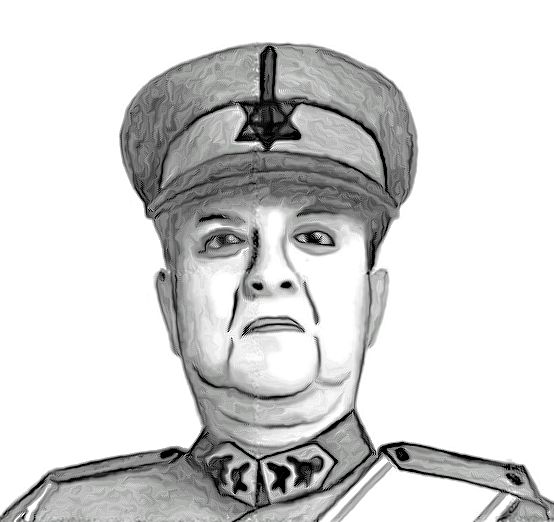
Abb.: Entmachtet: Gyanendra Bir Bikram Shah Dev (ज्ञानेन्द्र वीर विक्रम
शाहदेव)
[Bildquelle: Duvilar / Wikipedia. -- GNU FDLicense]
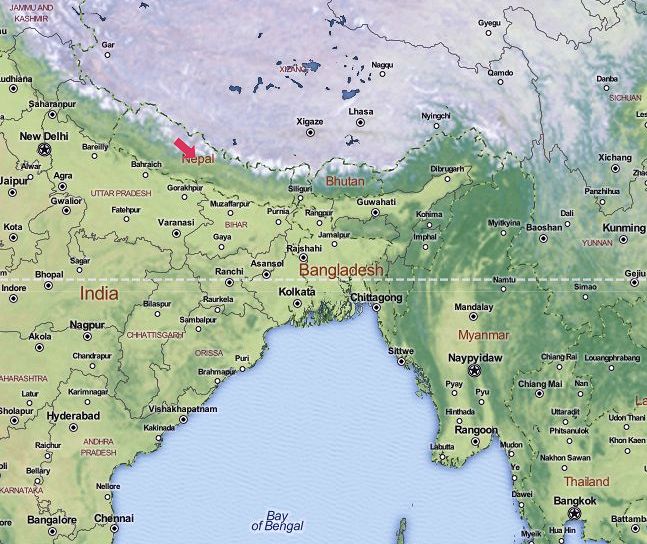
Abb.: Lage von Nepal
[Bildquelle: OpenStreetMap. --
Creative
Commons Lizenz (Namensnennung, share alike)]
2006-05-19
Die Armee braucht drei Stunden, um zwei Lehrerinnen
zu befreien, die im Dorf Guijingruepo, Provinz Narathiwat (นราธิวาส),
als Geiseln gehalten werden. Eine der Geiseln, Juling Pongkunmul (จูหลิง
ปงกันมูล, 1979 - 2007) wurde von Dörflern so sehr geschlagen, dass ihr Hirn
geschädigt wurde und im Koma liegt. Sie stirbt an den Folgen 2007. Sie wird
zum emotionalen Symbol für die wilde Gewalt in den südlichsten Provinzen.
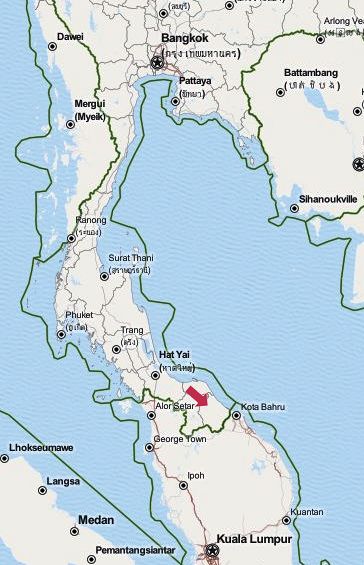
Abb.: Lage der Provinz Narathiwat (นราธิวาส)
[Bildquelle: OpenStreetMap. --
Creative
Commons Lizenz (Namensnennung, share alike)]
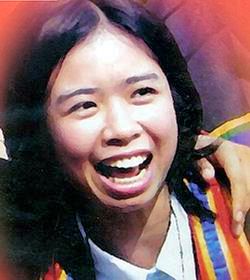
Abb.: Juling Pongkunmul (จูหลิง ปงกันมูล)
[Bildquelle: th.Wikipedia. -- Fair use]
2006-05-20
Bangkok Post:
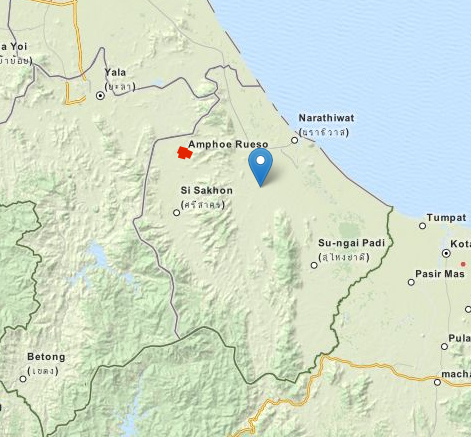
Abb.: Lage von Ra-ngae [ระแงะ]
und Rueso [รือเสาะ]
[Bildquelle: OpenStreetMap. --
Creative
Commons Lizenz (Namensnennung, share alike)]
| "Police
have arrested the wife of a suspected militant in connection with
the gruesome kidnapping and beating of two teachers yesterday.
Officials said they arrested Karima Masah Leh, 15, wife of Muhammad
Sapaeing Mueri, at a house in Rangae District [ระแงะ].
She has been charged with instigating villagers to seize two female
teachers to back demands for the release of her husband and another
man, Abdul Karim Matae, who were detained yesterday morning. Mueri
and Matae are being questioned over the murder of two marines
earlier this year at a train station in Rueso District [รือเสาะ].
Mrs. Leh is believed to be deeply involved in
yesterday's incident where two Buddhist teachers were singled out,
taken captive in the schoolhouse, held in a room, and beaten by a
group of men with sticks and fists.
The teachers were rushed to the hospital,
with one of them being in critical condition."
[Zitiert in:
Anderson, Wanni W. (Wanni Wibulswasdi) <1937 - >: Mapping Thai Muslims
: community dynamics and change on the Andaman Coast. -- Chiang Mai : Silkworm,
2010. -- 185 S. : Ill. ; 21 cm. -- ISBN 9789749511923. -- S. 118. -- Fair use]
|
2006-05-21
Tod des Filmemachers Cherd Songsri (เชิด
ทรงศรี, geb 1931)
| "Cherd Songsri (Thai: เชิด ทรงศรี, September 20,
1931 – May 21, 2006) was a Thai film director, screenwriter and film producer. A
maker of period films that sought to introduce international audiences to his
vision of Thai culture, his best-known work is the 1977 romance film Plae Kao
(แผลเก่า,The Scar), which earned more box-office receipts than any Thai film
before it. It won a prize at the 1981 Three Continents Festival in Nantes,
France.
Biography
Cherd was born in Nakhon Si Thammarat Province (นครศรีธรรมราช). He was
trained as a maker of nang talung (หนังตะลุง)
shadow puppets, which were fashioned
out of animal skins. He was also a school teacher in Uttaradit Province (อุตรดิตถ์) and then
became an editor of publications for the Express Transportation Organization of
Thailand. From there, he became an editor of the Movie and TV Weekly
magazine of Lak Muang Daily newspaper. He wrote articles and short
stories, as well as scripts for radio and television programs.
Norah (โนห์รา) in 1966 was his first film. He handled all
aspects of its production, from script writing, to securing financing and
shooting the picture. It was a method of work that he retained throughout his
entire career. Another film was the comedy, Poh-pla-lai (พ่อปลาไหล, starring Sombat
Metanee (สมบัติ เมทะนี,
1937 - ). Both were the most successful Thai films of the 16-mm era.
Cherd studied filmmaking in the late 1960s at the
University of California Los Angeles, and trained under director Walter Doniger
at Burbank Studios.
His stay in the United States made him reflect on Thai
culture and upon his return to Thailand, he established his own production
company, Cherdchai, and set about making films that would present his concept of
"Thainess" – idealized Thai values and culture of bygone years – to
international audiences, making him the first Thai director to make films with
international audiences in mind.
Films from this period include Khwam Rak (ความรัก,
1973) and
Pho Kai Chae (พ่อไก่แจ้, 1975) and his most ambitious film, Plae Kao (แผลเก่า,
The
Scar) in 1977, starring Sorapong Chatree (สรพงษ์
ชาตรี, 1950 - ) and Nantana Ngaograjang.
The story of a tragic romance between two peasants in
rural Thailand, Plae Kao was the biggest box-office hit up until that
time in Thailand. It shared the Golden Montgolfiere at the Nantes Three
Continents Festival with Eles Não Usam Black-Tie by Brazilian director
Leon Hirszman. It was also voted as one of the world's 360 classic movies by the
Museum of the Moving Image in London, Sight & Sound magazine and film
directors and critics worldwide in 1998. The Scar was remade in 2002 as
Kwan-Riam (ขวัญเรียม).
Some Thai critics said Cherd was promoting a stereotypical
image of Thailand.
"When I produced Plae Chow, I used the slogan 'We
must show Thai traditional style to the world'," Cherd told the Thai website
Movieseer. "This produced a great deal of negative sentiment towards the
picture, because some people believe that this is not a topic to be shown on
film. I am a stubborn person though, and once I set my mind to including this in
my films, well it's been in every film I have ever made. The press is always
asking me when I will make a contemporary film, but now, no one is asking."
His subsequent films followed the same pattern as Plae
Kao – romantic tragedies set against a backdrop of historical, rural
Thailand. Among his other works are Puen Pang (เพื่อนแพง,
1987), about two sisters
in love with the same man; Muen and Rid (อำแดงเหมือนกับนายริด,
1994), a true story from Rama
IV-era Siam about a woman who petitioned King Mongkut to make equal rights for
women; and Tawipob (ทวิภพ, 1990), the first film adaptation of a novel by Thommayanti
(ทมยันตี, 1937 -
), about a modern-day socialite who time travels back to Rama V-era
Siam and becomes involved in the political and diplomatic intrigue of the day.
Cherd directed and produced a total of 18 films. His last
film, Khang Lang Phap (ข้างหลังภาพ, Behind the Painting) in 2001 was based on
the classic Thai novel by Kulap Saipradit (กุหลาบ
สายประดิษฐ์, 1905 - 1974). It was a remake of a 1970s film by
another veteran Thai director, Piak Poster.
In addition to filmmaking, Cherd was an active attendee of
major international film festivals, such as Cannes, Tokyo and Hong Kong.
Among projects that he had hoped to make were a
biographical film of Thai statesman Pridi Phanomyong (ปรีดี
พนมยงค์, 1900 - 1983) as well as a movie that "tells
the truth" about King Mongkut and Anna Leonowens of The King and I and
Anna and the King fame, films that are banned in Thailand because of their
portrayal of the king.
He battled cancer the last four years of his life, writing
the book, Bantuek (?) Kab Kwam-tai (นั่งคุยกับความตาย,
A Diary of Death). He died at
Ramathibodi Hospital in Bangkok.
Cherd was secretive about his age, saying he had stopped
counting his birthdays at age 28. But in an obituary, The Nation reported
he had been born in 1931.
Filmography
- Norah (โนห์รา, 1966)
- Mekala (เมขลา, 1967)
- Aka-taranee (อกธรณี, 1968)
- Phayasok (พญาโศก, 1969)
- Lampoo (ลำพู, 1970)
- Kon Jai Bod (คนใจบอด, 1971)
- Poh-pla-lai (พ่อปลาไหล, A Light in the Dark, 1972)
- Khwam Rak (ความรัก,The Love, 1974)
- Pho Kai Chae (พ่อไก่แจ้, 1976)
- Plae Kao (แผลเก่า,
The Scar) (1977)
- Leud Suphan (เลือดสุพรรณ, 1979)
- Poh Pla Lai (พ่อปลาไหล, 35mm remake, 1981)
- Puen Pang (เพื่อนแพง, 1983)
- Ploy Talay (พลอยทะเล, The Gem from the Deep,
1987)
- Tawipob (ทวิภพ, Another World, 1990)
- The Tree of Life (คน-ผู้ถามหาตนเอง, 1992)
- Southern Winds (1993)
- Amdaeng Muen kab nai Rid (อำแดงเหมือนกับนายริด, Muen and Rid)
(1994)
- Reun Mayura (เรือนมยุรา, House of the Peacock,
1996)
- Khang lang phap (ข้างหลังภาพ, Behind the Painting)
(2001)"
[Quelle:
http://en.wikipedia.org/wiki/Cherd_Songsri. -- Zugriff am
2012-06-06]
|
2006-05-23 - 2006-09-19

59. Kabinett: Thaksin (ทักษิณ) III
2006-05-23
Es erscheint:
Editorial: No more room for incompetence.
-- In: The Nation <Bangkok>. -- 2006-05-23
"The Fourth Army [อาคารส่วนที่
4] must be thoroughly revamped and
depoliticised if the war on Islamic insurgents is to be won
Juling Pangamoon [จูหลิง ปงกันมูล, 1979 -
2007], the 24-year-old schoolteacher who was brutally beaten by a
frenzied mob in Friday's hostage drama in Narathiwat's [นราธิวาส]
Rangae district [ระแงะ],
has had hero status thrust upon her by a guilt-ridden society. She
lies in a hospital bed in a coma from which she may never regain
consciousness, when all she probably wanted to do was to lead a
normal life and perform her duty as a humble schoolteacher to the
best of her ability.
The last thought that
crossed her mind while being repeatedly beaten and kicked by her
merciless captors must have been one of hopelessness on realising
that no one would come to her rescue in her most desperate hour of
need.
The armed forces once
again brought shame upon themselves with their unsoldier-like
vacillation and, perhaps, even cowardice, in a hostage situation
that called for decisive leadership, prompt action and even the
ultimate sacrifice, if it came to that.
Army Commander-in-Chief
Sonthi Boonyaratklin [สนธิ บุณยรัตกลิน, 1946 -
] had to publicly express deep regret and
apologise to the families of Juling and the other teacher assaulted
for the Fourth Army's failure to rescue them, as the Army had ample
time and manpower to conduct a rescue operation during the teachers'
two-hour ordeal.
Rescuing hostages held by
a mostly unarmed mob should not be too difficult a task for a small,
well-trained Army unit to carry out with minimal or no casualties.
It is disturbing to learn that a sizeable Army patrol unit was on
standby in the proximity of the school where the two teachers were
held and tortured. They waited, doing nothing, for instructions from
higher-ups that never came and the requested reinforcement from a
nearby Army installation that took two hours to travel a distance
that should have taken them half an hour. By the time they arrived
the mob had dispersed after beating Juling and her colleague, who
sustained less serious injuries.
It is shocking to learn
that even at this advanced stage in the fight against Islamic
militants/separatist insurgents in the deep South, which covers
predominantly Muslim Pattani [ปัตตานี],
Narathiwat [นราธิวาส]
and Yala [ยะลา]
provinces, the Fourth Army continues to be weighed down by weak
leadership, incompetence, poor morale and lack of preparedness to
deal with emergencies like hostage situations, let alone the
readiness or the will to engage insurgents.
It may well be true that
the reluctance to use force even in hostage situations, where it is
justifiable in a rescue attempt, has something to do with the
atrocity committed by the Fourth Army in which 78 Muslim protesters
died of suffocation after being tied up and crammed into crowded
transport vehicles. The Army has yet to be brought to account for
the incident, which took place in October 2004 following a riot in
Narathiwat's Tak Bai district [ตากใบ].
Instead of being haunted by this past mistake, the Fourth Army must
own up to it and punish the personnel responsible for the brutality
so that it can turn over a new leaf and become an effective
professional fighting force that strictly adheres to respect for
human rights.
But there are plenty of
lessons that the Fourth Army commanders, whose responsibility it is
to combat Islamic insurgents in the deep South, could have learned
but obviously have not.
After all, the current war
between the government and Islamic insurgents that has killed more
than 1,000 people in the past two years was sparked by a daring raid
in January 2004 on an Army installation of battalion strength by
almost 100 insurgents. The battalion was overrun, four soldiers were
killed and the arms depot ransacked. The insurgents got away with
hundreds of automatic rifles.
The position of Fourth
Army commander has changed hands three times since then - a span of
less than two-and-a-half years. Prime Minister Thaksin Shinawatra
has kept former and current Fourth Army commanders on a short leash,
which explains why, instead of being allowed to discharge their
duties in a professional manner, they must always wait for
instructions from their political masters at Government House.
Without a thorough revamp of the Fourth Army leadership and dramatic
improvement in its battle readiness, the Army will be fighting a
losing war against the Islamic insurgents."
[Quelle:
http://www.nationmultimedia.com/2006/05/23/opinion/opinion_30004665.php.
-- Zugriff am 2016-03-16. -- Fair use] |
2006-05-30 - 2009-02-12

Michael Hayden (1945 - ) ist Direktor des CIA.

Abb.: Michael Hayden, 2006
[Bildquelle: CIA / Wikipedia. -- Public domain]
2006-06
Kwanchai Phraiphana (ขวัญชัย
ไพรพนา) in einem Community Radio in Udon
Thani (อุดรธานี):
"These people [chasing Thaksin away] must
be burnt, using used car tires, kill them, go to surround their
houses or shops. (Kwanchai Phraiphana, Khluen Muanchon Samphan
Radio, June 2006)
Kwanchai Phraiphana [ขวัญชัย
ไพรพนา] and a community radio station in Udon Thani [อุดรธานี]
fiercely supported Thaksin. Kwanchai mobilized people to break up
PAD’s [People's Alliance for Democracy -
พันธมิตรประชาชนเพื่อประชาธิปไตย; aka. Gelbhemden - เสื้อเหลือง]
attempt to stage a rally in the province. He sent out application
forms for people to become members of the "Love Udon Thani People’s
Forum." He organized parties to travel to Bangkok, Laos and Dubai to
meet and give moral support to Thaksin.
Kwanchai was a native of Suphanburi [สุพรรณบุรี].
After completing elementary education, he traveled around to seek
his fortune. He worked as a comedian with a country music band, and
was in the troupe of a famous singer Sayan Sanya [สายัณห์
สัญญา, 1953 - 2013] when he was at the height of his career.
Later he ran a country music program on a popular Udon Thani radio
station, playing Sayan Sanya songs interspersed with advertising.
When the PAD started their demonstrations against Thaksin in 2005,
he gave support to Thaksin through the radio and helped to found the
Love Udon Thani People’s Forum.
Kwanchai moved closely with the MPs, local
politicians, senior bureaucrats and police, and business figures in
Udon. Through his morning-time radio show, he helped to construct
Udon as a "capital" of the Red Shirts by persistently attacking and
issuing threats against businessmen and officials who openly opposed
Thaksin. An online newspaper reported that he incited people to
surround the house and gold shop of the PAD leader in the town. When
PAD attempted to hold a rally in the province, Kwanchai and others
led a group of some thousand people to break up the rally, resulting
in 22 people being injured, two seriously. On other occasions he led
groups to blockade an attempt by two PAD leaders to hold an anti-Thaksin
rally in Udon, and an attempt by Udon PAD leaders to hold a press
conference in Bangkok. After the 2006 coup he lay low in Laos for a
time, before returning to help organize pro-Thaksin demonstrations
in Bangkok. He joined the Red Shirt demonstrations against the
Abhisit government both in April 2009 and in April—May 2010.
Like other local Red Shirt leaders, Kwanchai
claimed to have a special relationship with Thaksin: he could talk
to Thaksin directly on the phone, or ring his secretary or
relatives. Such claims enhanced Kwanchai’s image in the locality,
but also provoked opposition. Kwanchai also angered people by
claiming that he had personally provided 20 million baht to buy land
and build a center for the Love Udon Thani Peoples Forum whereas
others claimed the money had come from a fund-raising dinner. Local
groups attacked Kwanchai over this and other issues on online media.
Some time after the 2006 coup, certain
villages in the northeast declared themselves as "Red Shirt
villages. " The movement gathered momentum over 2010—11, and by June
2011 there were reported to be over 320 such villages in the
provinces of Udon Thani and Khon Kaen [ขอนแก่น]
alone. Kwanchai disagreed with the idea of Red Shirt villages on
grounds that the reputation of the Red Shirts would be damaged by
association with drugs and other illegal activities in these
villages. Kwanchai was increasingly in conflict with other Red Shirt
groups in the province, including his earlier supporters.
After the Yingluck government was installed
in July 2011, the Red Shirts adopted a more conciliatory stance. On
the occasion of the King’s birthday in December 2011, a leading Red
Shirt composed a song for the King, and several Red Shirt leaders
made a recording at the Asia Update studios in Imperial Lat Phrao,
with Thaksin joining the singing by phone. Kwanchai joined this
trend, leading a group of 999 Red Shirts from 20 provinces entering
the monkhood to make merit for the King’s seventh cycle. Kwanchai
announced on this occasion, "I as a royally sponsored monk will
adhere to the thamma and pray for His Majesty every day. "
Tensions returned, however, when opponents began street
demonstrations in Bangkok in October 2013 aimed at bringing down the
Yingluck government. On January 23, 2014, Kwanchai Praipana was shot
and injured in the shoulder and leg. A day earlier, he had
criticized an official who claimed the "men in black" that provoked
violence during the 2010 protests were foreign militia, and had
offered a reward of 300, 000 baht (about US$17, 000) for anyone who
could capture Suthep Thaugsuban [สุเทพ
เทือกสุบรรณ, 1949 - ], the leader of the anti-Yingluck street
protests."
[Quelle: Ukrist Pathmanand [อุกฤษฏ์
ปัทมานันท์]. -- In:
Unequal Thailand : aspects of income, wealth and
power / ed. by Pasuk Phongpaichit [ผาสุก พงษ์ไพจิตร,
1946 - ] and Chris Baker [1948 - ]. -- Singapore: NUS, 20116. -- 186 S. :
Ill. ; 23 cm. -- ISBN 978-981-4722-00-1. -- Originaltitel: สู่สังคมไทยเสมอหน้า
(2014). -- S. 154ff. -- Faire
use] |
2006-06-01
Premiere des Films Noo Hin: The Movie (หนูหิ่น
เดอะ มูฟวี่) von Komgrit Triwimol (คมกฤษ ตรีวิมล, 1973 - )
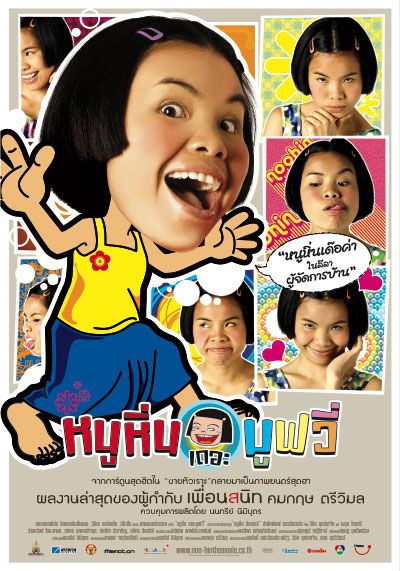
Abb.: Plakat
[Bildquelle: Wikipedia. -- Fair use]
|
"Noo Hin: The Movie (Thai:
หนูหิ่น เดอะ มูฟวี่)
is a 2006 comedy film based on a popular Thai comic book and graphic novel
series about a plucky domestic worker from Isan (อีสาน)
who's working for an upper class
family in Bangkok. It was directed by Komgrit Triwimol (คมกฤษ ตรีวิมล, 1973 - ) and co-produced by Nonzee
Nimibutr (นนทรีย์
นิมิบุตร, 1962 - ) with a screenplay by Kongdej Jaturanarasamee
(คงเดช จาตุรันต์รัศมี,
1972 - ).
Plot
Noo Hin (หนูหิ่น)is a young woman living in Ubon Ratchathani
(อุบลราชธานี) in
Northeast Thailand, and as the story opens, she is hunting for something to eat,
and she spots a lizard (an animated character), which she chases throughout the
countryside, causing a stampede of water buffalo and disrupting a village fair.
Noo Hin, it seems, is a constant troublemaker in the
village, which as is typical for Isan is poor, with few prospects for jobs or a
productive rice crop. Because Noo Hin is essentially useless, she must be sent
to Bangkok to earn money in a factory.
Her departure at the railway station is a cause for
celebration. Even the village band turns out to add to festivities.
As she rides on the train, Noo Hin imagines getting a job
in a glamorous factory, making trendy bags, T-shirts and shoes. Her fantasy is
acted out in a musical song-and-dance number. But at the employment agency, all
that's left is a job in a rat-trap factory, which is horrifying to Noo Hin.
But as luck has it, an attractive, tall and large-breasted
young woman strides into the agency looking for a new maid, and Noo Hin gets the
job.
The young woman's name is Milk (มิลค์), which Noo Hin thinks is
funny for some reason.
Noo Hin has troubles adapting to the city right from the
start. She has never used a seatbelt in a car before. She is given some insect
spray to get rid of bugs in her room. Its odor is pleasing, so she sprays so
much that she faints from the fumes.
She also can't understand why Milk and her older sister,
Som-O (ส้มโอ) (Pomelo), are so obsessed with their appearance. Som-O is especially
concerned, and is constantly exercising, using a piece of equipment or a
vibrating belt she hopes will melt away any fat that might be on her waistline.
Noo Hin is further mystified by the behavior of urban women, who fight over
items in sales bins at Siam Center (สยามเซ็นเตอร์) and use whitening cream to make their
underarms sparkle.
The house is bigger than the provincial government
building back home, but the resourceful Noo Hin settles in, wearing dust-mops on
her feet, a head-dress of feather dusters and twirling a broom as she whips
things into shape during another song-and-dance number.
Noo Hin also has time for romance, meeting Tong
(ทอง), who she
sees at the house next door, working in the garden. She strikes up a friendship
with him and makes him her special som tam (ຕໍາສົ້ມ/ส้มตำ). She is disappointed to find out
later, however, that he is actually the son of the home's owners, and not a
gardener from Isan.
With the housework in order and the family happy, Noo Hin
sets her sights on her next project – making Milk and Som-O famous. So Noo Hin
secretly enters both the girls in a "super model" contest, an idea that Milk and
Som-O are angry about at first, but their social-climbing mother soon warms up
to it.
At the contest, the girls catch the eye of a French
designer's assistant, much to the dismay of jealous supermodel Sonia (โชเนีย). But the
event is marred when Noo Hin catches a young man snapping mobile phone camera
pictures of Milk in her dressing room. Noo Hin accuses the man, but he turns out
to be the son of an influential member of society (a hi-so, in Thai slang), and
the case is swept under the rug and Noo Hin forced to apologize.
Still, both Milk and Som-O are sought after by the French
designer, and as the sisters are being driven to another modeling appointment,
they are kidnapped and held in a love hotel. Noo Hin, meanwhile, is spirited
away to a sweatshop factory where Isan women are forced to sew stuffed animals
under the supervision of men in black to the beat of a DJ playing techno.
Eventually, Noo Hin is able to charm one of the guards (who
turns out to be an Isan native) and mount a rescue of the enslaved factory
workers, while neighbor Tong tracks down Milk's and Som-O's whereabouts. They
make it to the modelling engagement in time, only to be confronted by supermodel
Sonia, who it turns out was the mastermind of the kidnapping. She is further
exposed in front of the fashion designer, when it is revealed that she wears
silicone falsies.
Milk and Som-O are then chosen to be the lead models for a
new line of clothes by the French designer, which it turn out, have been
inspired by Noo Hin's indigenous wardrobe. They are to be flown to France for
further assignments, and Noo Hin will go along with them, likely stirring up
trouble wherever she goes.
Cast
- Rungrawan Tonahongsa (รุ้งลาวัลย์
โทนะหงษา, 1979 - ) as Noo Hin (หนูหิ่น)
- Kochakorn Suppakarnkitjakul (??)
(ธัญยกันต์ ธนกิตติ์ธนานนท์, 1986 - ) as Milk (มิลค์)
- Panisa Buacharoen (ปาณิศา
บัวเจริญ, 1982 - ) as Som-O (ส้มโอ)
- Adisorn Insee (อดิศร อินทรีย์) as Tong
(ทอง)
- Nahatai Lekbumrung (ณหทัย
เล็กบำรุง) as Sonia (โชเนีย)
Origins
Created around 1994 by cartoonist Padung Kraisri
(ผดุง ไกรศรี), Noo Hin is
a loyal, hard-working domestic worker from Ubon Ratchathani (where Padung
Kraisri also hails from). The character first appeared in the Banlue Sarn
(บรรลือสาส์น)
company’s monthly comic book Cartoon Maha Sanook
(การ์ตูนมหาสนุก), In 2004, Noo Hin was
spun off into her own series of graphic novels (called "pocket book" in
Thailand), Noo Hin Inter, a black-and-white publication that sells for 12
baht and the full-color Noo Hin in the City, which sells for 50 baht.
They are published by Vithita Animation.[2]
Noo Hin’s name in her northeastern Thai dialect suggests a
bad smell. She is short with a square face and flat nose – in complete contrast
to her employer, Milk, who is tall, with a round face, pointed nose, and light
skin, with a name that suggests whiteness and purity.
The humorous situations are usually slapstick in nature
have mostly have to do with Noo Hin's ignorance of modern, urban life. But Noo
Hin always prevails, thanks to her traditional, rural wisdom and resourcefulness.
If she has a superpower, it's an ability to make a delicious som tam and wield
her pungent fish sauce (น้ำปลา) as a secret weapon.
In addition, both Milk and her older sister, Som-O
(Pomelo), have exaggerated breasts, which is similar to characters in Japanese
manga (漫画), but the
Noo Hin
comics are not
pornographic nor do they contain violence or sexual innuendo.
Actresses Kochakorn Suppakarnkitjakul and Panisa
Buacharoen, who portrayed Milk and Som-O, respectively, wore silicone falsies to
boost up their breast sizes, but some fans of the comic complained that the
character's breasts weren't prominent enough, compared to the characters in the
comic.
Reception
The movie was received poorly by audiences and critics in
Thailand. Distributor Sahamongkol Film International hoped to earn 80 million
baht. But after a strong opening weekend in which it earned 22 million baht, it
left cinemas after earning just 51.8 million. The movie was budgeted at 40
million baht. This was despite the movie being based on a popular comic, having
a director who had directed two hit films (Komgrit Triwimol who co-directed
Fan Chan
(แฟนฉัน, 2003) and his solo debut Dear Dakanda
(เพื่อนสนิท, 2005)
and a well-known screenwriter (Kongdej Jaturanrasamee), and produced by an
influential filmmaker, Nonzee Nimibutr. A lack of cohesion in the storytelling
and inexperienced actors were cited the main reasons for the disappointing
results.[3]
Soundtrack
A soundtrack album of music from film was released by Sony
BMG Music Entertainment (Thailand). It includes mor lam (หมอลำ) and pop songs sung by
popular singer-actress Janet Kiew (เจเน็ท เขียว) and composed for the film by Kongdej
Jaturanrasamee (คงเดช
จาตุรันต์รัศมี, 1972 - ), as well as tracks by the movie's leading actress Rungrawan
Tonahongsa (รุ้งลาวัลย์ โทนะหงษา, 1979 - ) and Tata Young (ทาทา
ยัง, 1980 -
."
[Quelle:
http://en.wikipedia.org/wiki/Noo_Hin:_The_Movie.
-- Zugriff am 2013-03-24]
|
2006-06-01
Premiere des Films Ruk Jung (รักจัง)
von Haeman Chatemee (เหมันต์ เชตมี)
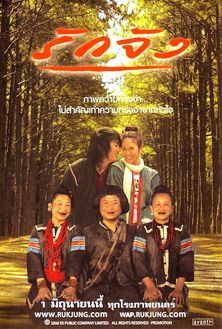
Abb.: Plakat
[Bildquelle: Wikipedia. -- Fair use]
|
"Ruk Jung (Thai:
รักจัง; RTGS: Rak
Chang; English title The Memory; literal translation, "So Much Love") is
a 2006 Thai romantic-comedy film directed by Haeman Chatemee
(เหมันต์ เชตมี) and starring "Film"
Ratchaphoom Tokongsup ("ฟิล์ม" ฐภูมิ โตคงทรัพย์, 1984 - ) and Paula Taylor (พอลล่า
เทเลอร์, 1983 - ).
Plot
Superstar singer Film (ฟิล์ม) is involved in a car accident in the
rural, remote mountain forests of northern Thailand. He is rescued by some hill
tribe people, but because he has amnesia, he can't remember who he is. A paparazza named Jaa
(จ๋า) has followed Film. Before the accident, Film and Jaa were
enemies, but now he thinks that she is someone he might have loved in his past
life brought back to him by the legendary fireflies.
Cast
- Ratchaphoom Tokongsup (รัฐภูมิ
โตคงทรัพย์, 1984 - ) as Film (ฟิล์ม)
- Paula Taylor (พอลล่า
เทเลอร์, 1983 - ) as Jaa
(จ๋า)
- Duangrudee Boonbumroong (ดวงฤดี
บุญบำรุง) as Aaloo (อาลู่)
- Somphong Kunapratom (สมพงษ์
คุนาประถม, 1978 - ) as Lawsoo (ลอซู)
- Khwannapa Reuangsri (ดวงฤดี
บุญบำรุง) as Aalaa (อาล่า)
Awards
- 2007 Thailand National Film Association Awards
(รางวัลภาพยนตร์แห่งชาติ สุพรรณหงส์) – Best
cinematography2
[Quelle:
http://en.wikipedia.org/wiki/Ruk_Jung. -- Zugriff am 2013-03-24]
|
2006-06-01
Matichon Raiwan (มติชนรายวัน)
prägt den Neologismus ตุลาการภิวัตน์ (judicialization) für
die neue "Mode", Politik durch Gerichte entscheiden zu lassen.
2006-06-05


Die Verteidigungsminister der USA und Vietnams beraten in Hanoi über den
Ausbau der militärischen Beziehungen beider Länder. Sie unterzeichnen ein
Abkommen über den Austausch medizinischen Personals und Sprachschulung.
US-Verteidigungsminister Donald Rumsfeld dementiert, dass die USA in Vietnam
eine Militärbasis errichten möchten.
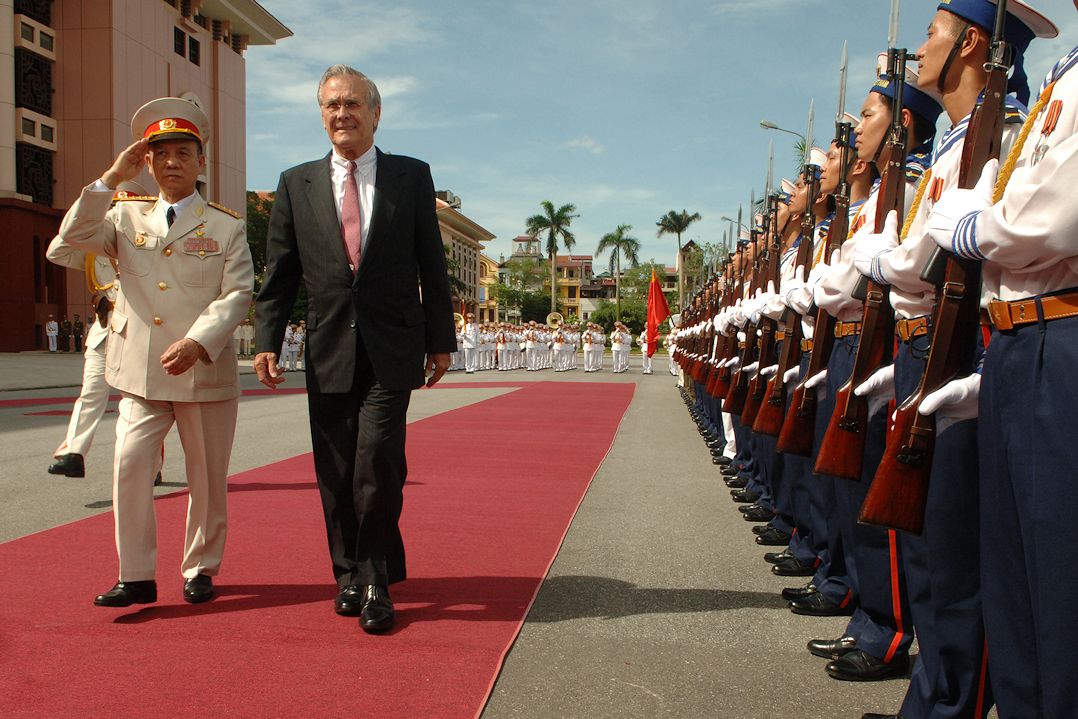
Abb.: US-Verteidigungsminister Donald Rumsfeld mit Verteidigungsminister
Phạm Văn Trà, Hanoi, 2006-06-05
[Bildquelle: Petty Officer 1st Class Chad J. McNeeley / US Navy / Wikimedia.
-- Public domain]
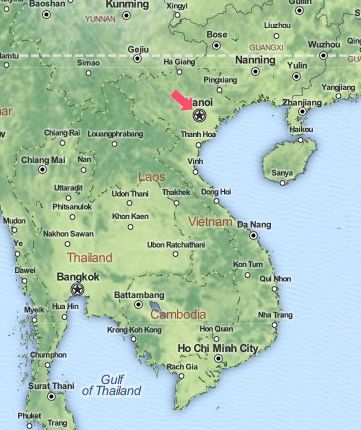
Abb.: Lage von Hanoi (Vietnam)
[Bildquelle: OpenStreetMap. --
Creative
Commons Lizenz (Namensnennung, share alike)]
2006-06-08
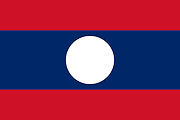
Der Generalsekretär der Laotischen Revolutionären Volkspartei (ພັກປະຊາຊົນປະຕິວັດລາວ),
Choummaly Sayasone (ຈູມມະລີ
ໄຊຍະສອນ, 1936 - ) wird Präsident von
Laos. Bouasone Bouphavanh (บัวสอน บุบผาวัน, 1954 - ) wird
(bis 2010-12-23) Premierminister.
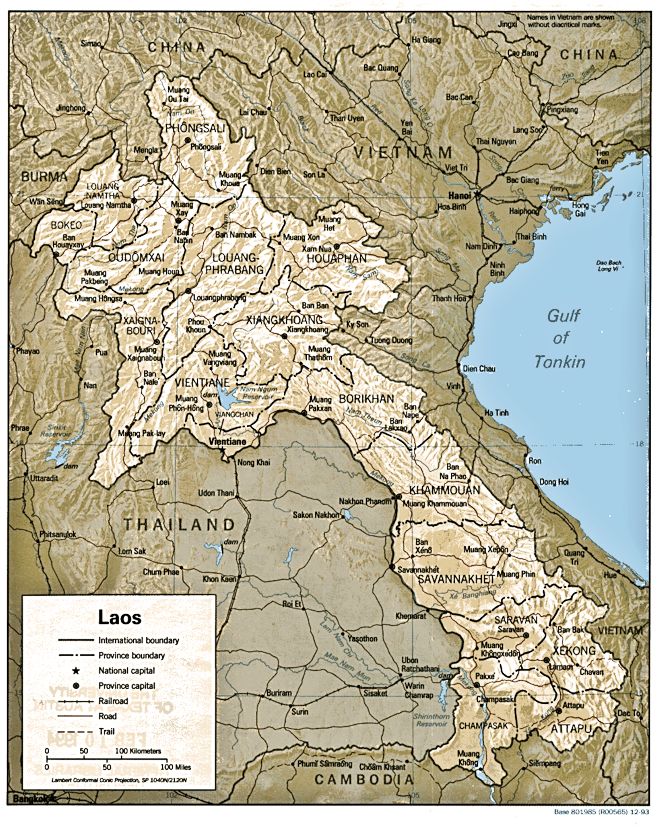
Abb.: Laos
[Bildquelle: CIA. -- Public domain]
,
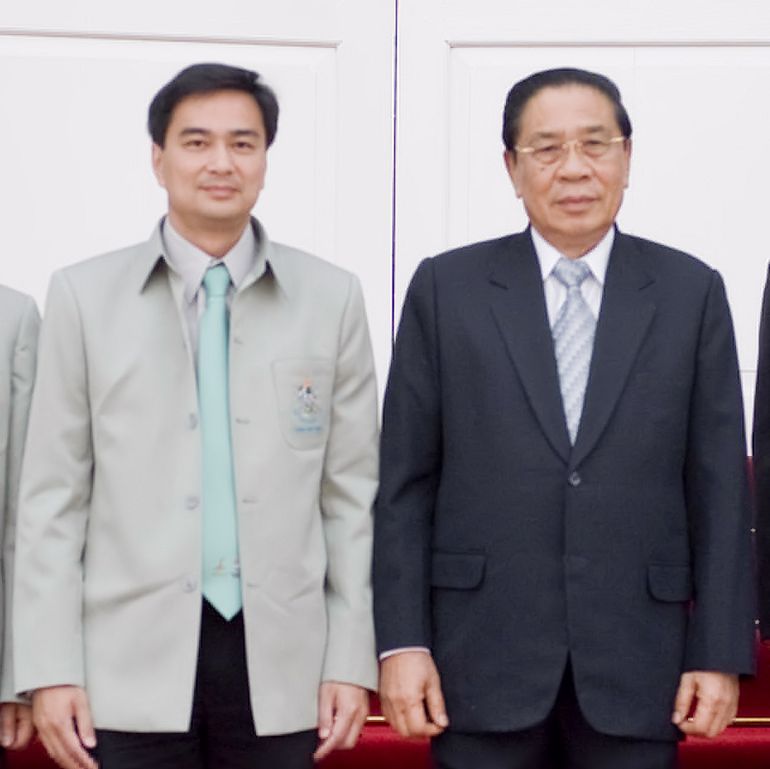
Abb.: Choummaly Sayasone (ຈູມມະລີ
ໄຊຍະສອນ) (rechts) mit
Ministerpräsident Abhisit (อภิสิทธิ์
เวชชาชีวะ),
2009-12-09
[Bildquelle: The Official Site of The Prime Minister of Thailand
Photo by พีรพัฒน์ วิมลรังครัตน์. --
http://www.flickr.com/photos/40561337@N07/4174905510/. -- Zugriff am
2012-01-22. --
Creative Commons Lizenz (Namensnennung)]
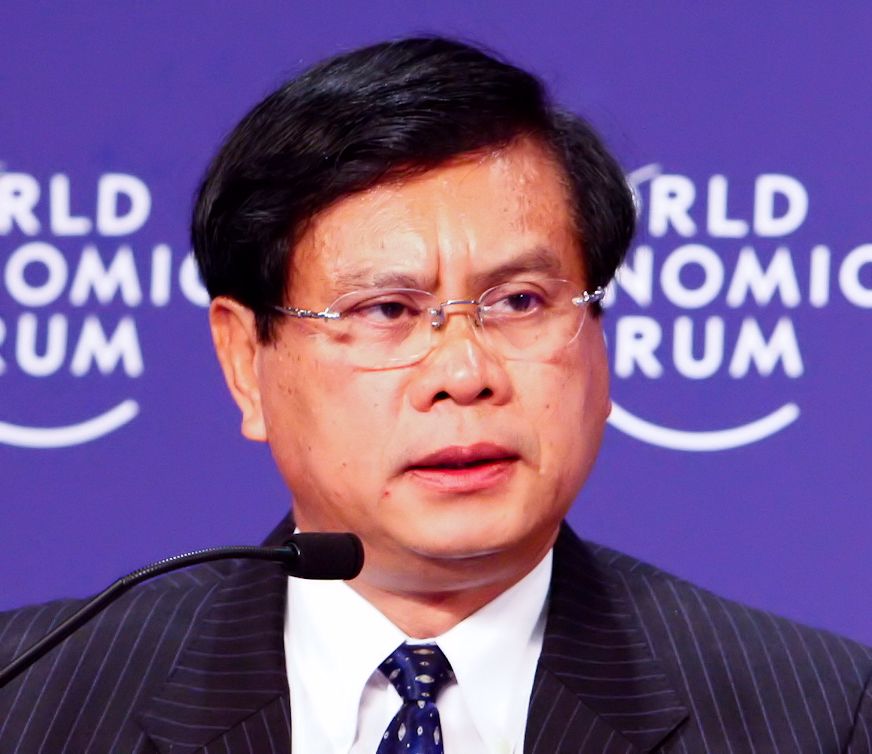
Abb.: Bouasone Bouphavanh (บัวสอน บุบผาวัน), 2010
[Bildquelle: World Economic Forum / Ms. Sikarin Thanachaiary. --
http://www.flickr.com/photos/worldeconomicforum/4673685459/. -- Zugriff
am 2012-01-22. --
Creative
Commons Lizenz (Namensnennung, share alike)]
2006-06-09

60jähriges Krönungsjubiläum des Königs. Es kommt
Hochadel aus 25 Ländern, darunter 13 Monarchen, vier königliche Gattinnen, 6
Kronprinzen. Hunderttausende jubeln dem König zu.
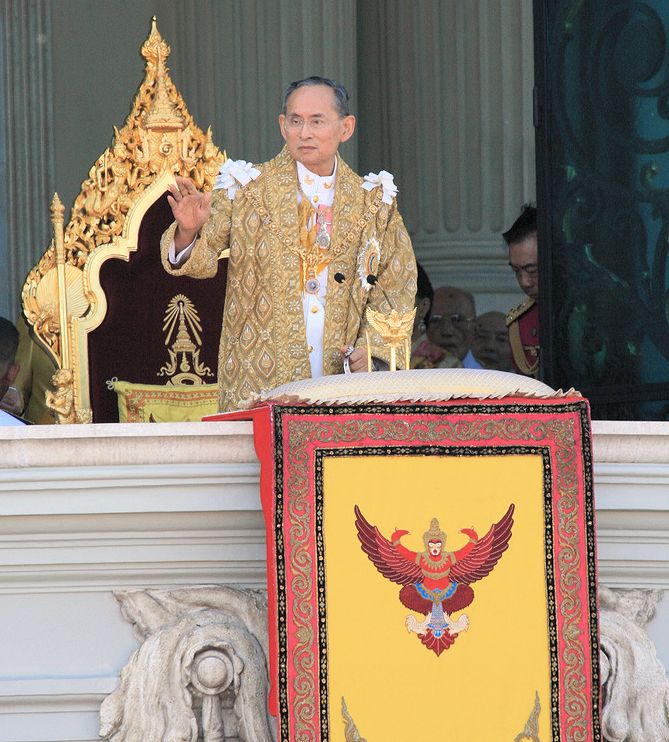
Abb.: Seine Majestät, 2007-12-05
[Bildquelle: boonkumnoun. --
http://www.flickr.com/photos/7385747@N03/2787197730/. -- Zugriff am
2012-01-08. --
Creative Commons Lizenz (Namensnennung)]
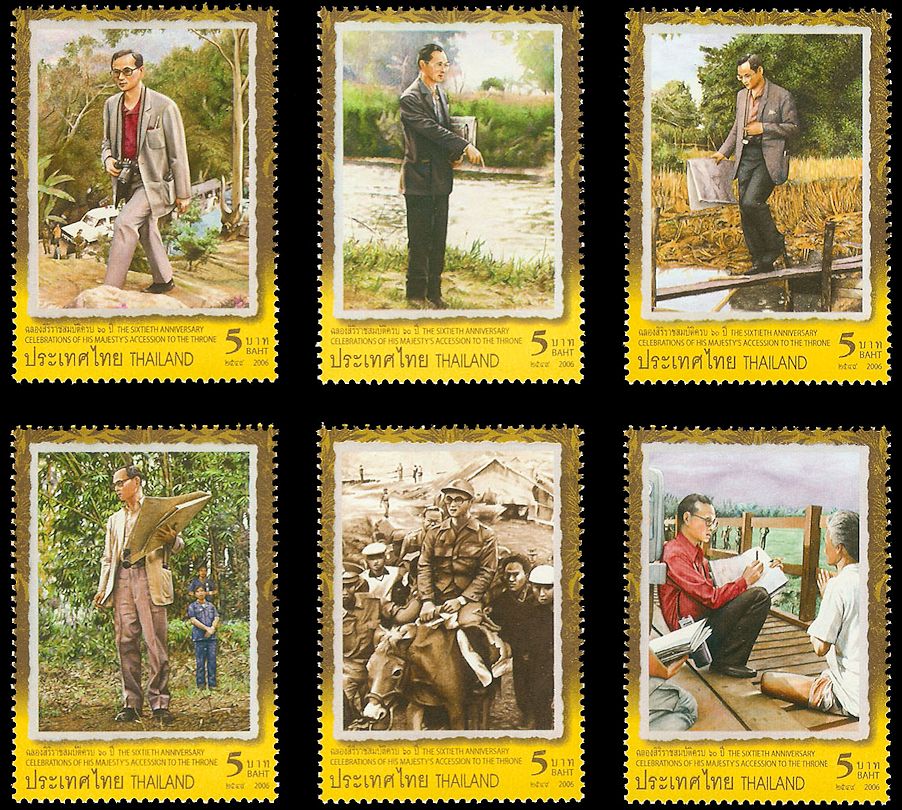
Abb.: Briefmarkenserie zum 60. Thronjubiläum, 2006
[Bildquelle: Tom Marshall. --
http://www.flickr.com/photos/atomdocs/4291510643/in/photostream/. --
Zugriff am 2012-03-14. --
Creative
Commons Lizenz (Namensnennung, share alike)]
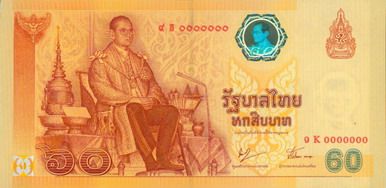
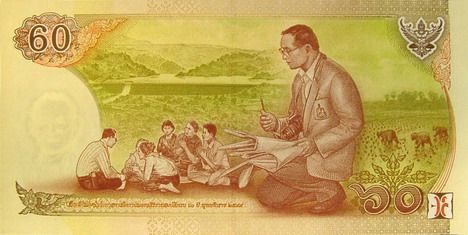
Abb.: 60-Baht-Schein zum Thronjubiläum 2006
[Bildquelle: th.Wikipedia]
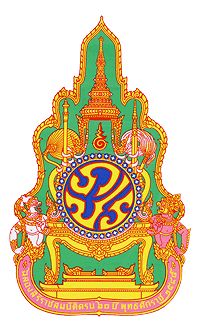
Abb.: Königliches Emblem zum 60. Thronjubiläum
| "The Royal Ceremonial Emblem on the 60th
Anniversary of His Majesty the King's Accession to the Throne. There
are soft yellow on the Thai letters Bhor Por Ror. The yellow color
of the letters is the color of His Majesty's day of birth and a gold
color has been a line around with mixing between blue and gold
background. Also there are diamonds around that mean a man of
learning, poet laureate and famous craftsman. Therefore king seems
to be one diamond of Thai people that mean the top of precious stone.
His Majesty the King's initials, placed under
the Royal Crown There are 5 symbols, a crown, a chaisri royal sword,
a king’s walking stick, his fan, his shoes that mean Anniversary of
His Majesty the King's Accession to the Throne, below The Royal
Ceremonial Emblem on the 60th Anniversary of His Majesty the King's
Accession have been on pink silk and on the right has a monkey, on
the left has a garuda in the end of it.
All of The Royal Ceremonial Emblems have to
be mixing between green and gold color that mean power and fertile."
[Quelle:
http://www.rama9art.org/artisan/emblem/rce6.html. -- Zugriff am
2013-01-14] |
Festprogramm:
| Date |
Time |
Ceremony |
Place |
| Thursday, 8 June |
17.00 hours |
The merit making royal ceremony in dedication to the royal
ancestors |
Amarin Winitchai Throne Hall (พระที่นั่งอมรินทรวินิจฉัยมไหสูรยพิมาน) |
| Friday, 9 June |
09.00–17.00 hours |
The letting of the public paying of homage to the royal
ancestors |
Phra Thep Bidon Hall, Wat Phra Si Rattanasatsadaram (วัดพระศรีรัตนศาสดาราม) |
| 10.00 hours |
The homage paying royal ceremony in dedication to the royal
ancestors |
Anantasamakhom Throne Hall (พระที่นั่งอนันตสมาคม) |
| HM The King Bhumibol Adulyadej and HM The Queen Sirikit holding
the grand audience |
Balcony of Anantasamakhom Throne Hall |
| Saturday, 10 June |
17.00 hours |
The 60th Year on Throne Anniversary Royal Celebrations:
- The establishment of ecclesiastical ranks
- The religious ceremonies
- The throne celebrating walking ceremony
|
Amarin Winitchai Throne Hall |
| Monday, 12 June |
16.00 hours |
HM The King Bhumibol Adulyadej and HM The Queen Sirikit, as well
as members of the royal household, welcoming the visiting monarchs |
Anantasamakhom Throne Hall |
| 18.30 hours |
The monarchs inspecting the Royal Projects Exhibition and the
Royal Barge Procession (กระบวนพยุหยาตราชลมารค) |
The Royal Thai Navy's Auditorium, and Ratchanawikasapha (Royal
Thai Navy Hall) |
| Tuesday, 13 June |
19.30 hours |
Royal Banquet |
Borommaratchasathit Maholan Hall, Grand Palace (พระบรมมหาราชวัง) |
[Quelle:
http://en.wikipedia.org/wiki/60th_Anniversary_Celebrations_of_Bhumibol_Adulyadej%27s_Accession.
-- Zugriff am 2012-06-05]
Aus der adeligen Gästeliste:
- Japan: Kaiser Akihito (明仁,
1933 - ) und Kaiserin Michiko (皇后美智子,
1934 - )
- Kambodscha: König Norodom Sihamoni (នរោត្តម
សីហមុនី, 1953 -)
- Malaysia: Raja Permaisuri AgongTuanku Fauziah
binti Tengku Abdul Rashid (1946 - ) und Yang di-Pertuan Agong Tuanku
Syed Sirajuddin ibni Tuanku Syed Putra Jamalullail (1943 - )
- Brunei: Sultan Haji Hassanal Bolkiah Mu'izzaddin
Waddaulah ibni Al-Marhum Sultan Haji Omar Ali Saifuddien Sa'adul Khairi
Waddien (1946 - ) und Saleha Mohamed Alam (1946 - )
- Schweden König Carl XVI Gustaf (Carl Gustaf
Folke Hubertus, 1946 - ) und Königin Silvia Renate, geb Sommerlath (1943
- )
- Jordanien: Abdullah II ibn al-Hussein (
عبد الله الثاني بن الحسين) (1962 -
)
- Swaziland: König Mswati III (1968 - ) und eine
seiner 13 Gattinnen (Prinzessin Inkhosikati N.N.)
- Lesotho: König Letsie III(1963 - ) und Königin 'Masenate
Mohato Seeiso (1976 - )
- Kuwait: Emir Sabah IV Ahmad Al-Jaber Al-Sabah (الشيخ
صباح الأحمد الجابر الصباح ) (1929 - )
- Qatar: Emir Hamad bin Khalifa Al Thani (
الشيخ حمد بن خليفة آل ثاني) (1952
- ) und Sheikha Mozah bint Nasser Al Missned (
موزا بنت ناصر المسند) (1959 - )
- Bhutan: Kronprinz Jigme Khesar Namgyel Wangchuck
( འཇིགས་མེད་གེ་སར་རྣམ་རྒྱལ་དབང་ཕྱུག་,
1980 -)
- Belgien: Kronprinz :
Philippe Léopold Louis Marie
/ Filip(s) Leopold Lodewijk Maria
(1960 - ) und Prinzessin Mathilde Marie Christiane Ghislaine d'Udekem
d'Acoz (1973 - )
- Niederlande: Kronprinz Willem-Alexander Claus
George Ferdinand, Prins van Oranje-Nassau, Jonkheer van Amsberg (1967 -
) und Prinzessin Máxima, Prinses van Oranje-Nassau, mevrouw van Amsberg
(1971 - )
- Norwegen: Kronprinz Haakon Magnus (1973 - ) und
Kronrinzessin Mette-Marit (1973 - )
- Abu Dhabi: Kronprinz Mohammed bin Zayed bin
Sultan Al Nahyan ( محمد بن زايد بن سلطان
آل نهيان) (1961 - )
- Tonga: Kronprinz Siaosi Tāufaʻāhau
Manumataongo Tukuʻaho Tupou (1948 - 2012)
- Oman: Prinz Sayyid Shibab bin Tariq Taimour Al
Said
- Monaco: Prinz Albert II Alexandre Louis
Pierre Grimaldi (1958 - )
- Liechtenstein: Erbprinz Alois Philipp Maria von
und zu Liechtenstein, Graf zu Rietberg (1968 - )
- Marokko: Königliche Gemahlin Lalla Salma (الأميرة
للا سلمى) (1978)
- Spanien: Reina Consorte Sofía de Grecia y
Dinamarca (1938 - )
- Dänemark: Königlicher Gemahl Henri Marie Jean
André de Laborde de Monpezat (1934 - )
- Luxemburg: Großherzog Henri Albert Gabriel Félix
Marie Guillaume vu Lëtzebuerg (1955 - )
- Großbritannien und Commonwealth: Prince Andrew,
Duke of York (1960 - )
- Bahrein: Khalifa bin Salman Al Khalifa (خليفة
بن سلمان آل خليفة) (1935 - )
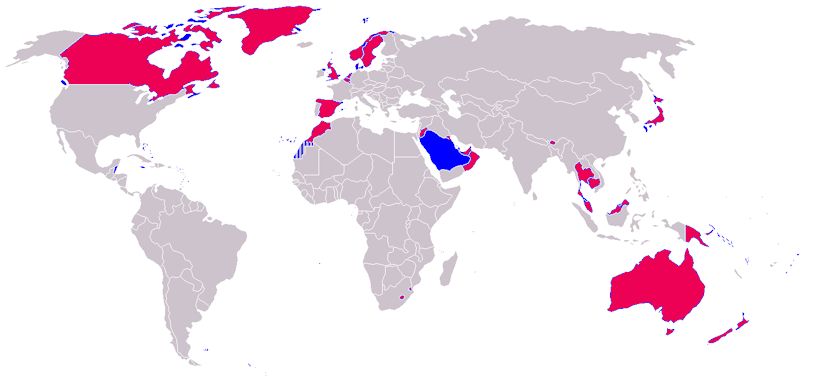
Abb.: Bei den Feierlichkeiten vertretene Monarchien (Kleinststaaten sind
nicht eingezeichnet)
[Bildquelle: Zntrip / Wikimedia. -- GNU FDLicense]
Run auf gelbe T-Shirts. Sie kosten bis zu 600 Baht.
Das Handelsministerium droht Wucherern mit Haft bis zu 7 Jahren.
2006-06-09

In einem vertraulichen Telegramm beschreibt der
US-Botschafter Ralph “Skip” Boyce (1952 - ) die Feierlichkeiten:
"The multi-day gala offered dramatic and often
times moving evidence of the nation’s respect and adoration for its
monarch... While the Thai people’s respect and reverence for the 78 year
old monarch is often cited, the weekend’s celebration was a rare
occasion to see — and feel — the depths of this sentiment in person. In
contrast to the tens of thousands who have rallied against and in
support of the Thaksin government, the King’s public address on Friday
at [the] throne hall inspired an estimated one million Thai to brave the
mid-day sun to listen to their “father” speak... Much of the audience
had camped out since the evening before... All local television stations
carried the same live feed of each event,
which featured crowd shots
of attendees alternately crying and smiling. Late night television
shifted to cover the opening of the World Cup, but even this event was
colored by the King's celebration: a newspaper cartoon explained that
most Thai people were cheering for Brazil because the Brazilians wear
yellow uniforms."
"In a shot heavy
with unintentional meaning on Friday, the television broadcast showed
the unpopular Crown Prince reading a message of congratulations to the
King, who was seated on the royal balcony above the Prince. Just visible
behind the King, however, was the smiling face of Princess Sirindhorn [มหาจักรีสิรินธร,
1955 - ] – the widely respected “intellectual
heir” of the monarch – chatting with her sisters and trying to take a
picture of the adoring crowd below. The physical distance between the
King and his legal heir far below, and his beloved daughter just behind
him, captured the internal family dynamic — and the future of the
monarchy — quite nicely."
"Prime
Minister Thaksin was front and center for much of the festivities:
greeting foreign guests, and reading a congratulatory message for the
King on behalf of the caretaker government. In an unfortunate bit of
timing, the television camera covering the opening ceremony on Friday
panned on the PM just as he was checking his watch. Aside from this
minor gaffe – not mentioned in the newspapers, yet – the PM's personal
perspective on the celebration remains unclear. Thaksin recently told
the Ambassador that his own popularity in the countryside is seen by the
palace as threatening to the King’s popular standing. After this
weekend’s massive, unprecedented display of public adoration for the
monarch, however, one hopes that Thaksin has a firm enough grasp of
reality to reconsider this idea."
[WikiLeaks, zitiert in:
Marshall, Andrew MacGregor <1971 - >: #thaihistory
: Thailand's moment of truth ; a secret history of 21st century Siam. -- o.O. :
zenjournalist, 2011.] |
2006-06-09

Anlässlich der Jubiläumsfeierlichkeiten
veröffentlicht das Information Center The Sixtieth Anniversary Celebrations
of His Majesty's Accession to the Throne The Government Public Relations
Department vielerlei, u.a.:
"Ten
Guiding Principles to Follow in the Royal Footsteps
Since his accession to
the throne in 1946, 60 years ago this year, His Majesty the King
has firmly adhered to the Ten Guiding Principles for a King,
defined as the virtues of a righteous ruler. Thus, all royal
activities are meant to bring maximum benefits to the people,
and peace and happiness to the land.
The Ten Guiding
Principles for a King are:
Dana - giving help to those who need help
Sila – self conduct
Paricaga – giving up something of lesser use
Ajava – straightness
Maddava – gentleness
Tapa – perseverance
Akkodha – non anger
Avihimsa – not causing injury
Khanti – endurance
Avirodhana – not going wrong
 His
Majesty sets himself as a model in following strictly the Ten
Guiding Principles for a King. The Office of the Civil Service
Commission has compiled the principles adhered to by His Majesty
the King for government officials to follow in their capacity as
the ones who serve the king, and for people of all professions
and all walks of life to follow in the royal footsteps. His
Majesty sets himself as a model in following strictly the Ten
Guiding Principles for a King. The Office of the Civil Service
Commission has compiled the principles adhered to by His Majesty
the King for government officials to follow in their capacity as
the ones who serve the king, and for people of all professions
and all walks of life to follow in the royal footsteps.
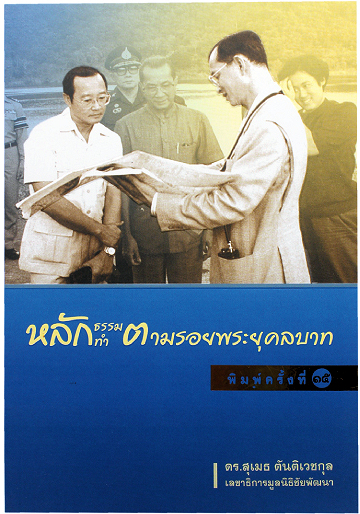
Abb.: Einbandtitel
A close aide to His
Majesty, Dr. Sumeth Tantivejkul [สุเมธ ตันติเวชกุล, 1939 - ],
Secretary-General of the Chaipattana Foundation
[มูลนิธิชัยพัฒนา],
enunciated the ten principles in the book “Dhamma to Observe in the
Royal Footsteps” [หลักธรรม หลักทำ ตามรอยพระยุคลบาท. -- 2549 [=
2006]. -- 35 S.] as follows:
- Firstly, working as
an enlightened, with recognized accomplishment
His Majesty emphasizes “knowledge” or enlightenment in all
undertakings. He seeks information through all means before
implementing any project, studying from documents, persons, and
organizations. He carries out the project when thorough studies
are made. This can be emanated in all undertakings.
- Secondly,
perseverance, determination, upholding Dhamma, and the right
path
Throughout the past 60 years of his reign, His Majesty the King
upholds righteousness above everything else. He also perseveres
to overcome various obstacles. His Majesty once remarked that
generally, the society would be structured as a pyramid, with
the king on top. But in the Thai society, that pyramid was
upside down and the king found himself at the bottom instead.
Dr. Sumeth remarked in the book “Dhamma to Observe in the Royal
Footsteps” that “Therefore, when it comes to perseverance,
just keep your eyes on His Majesty the King and follow his
examples.”
- Thirdly, modesty,
simplicity and economizing
The familiar royal portrait for the Thai people is that of His
Majesty in simple attire, with a camera slung around his neck,
documents in his hands, bending down to hear the tales of woes
from his subjects, discussing solutions to the problems. He is
always seated among his people at the same level, not above
them.
- Fourthly, upholding
the interest of the majority
Throughout the past 60 years, His Majesty the King has always
upheld public interest, working tirelessly in remote areas. Dr.
Sumeth said in the book “Dhamma to Observe in the Royal
Footsteps” that: “ I once humbly asked His Majesty for his
blessing, telling him that it was my birthday. His Majesty gave
this blessing: “May you be in good health, so that you could be
of help to others. May you enjoy working, and may you get full
satisfaction from the success achieved.”
- Fifthly, opening to
others’ views and respecting opinions that differ from ours.
In the same book, Dr. Sumeth related that “On his royal
birthday anniversary in 2003, His Majesty the King warned all
sides to consult with one another, listening to other people’s
views, while stating one’s own reasons. Consideration should
then be given to all those reasons, to see which one is more
acceptable. When agreed, all arguments should stop, and
implementation then starts. Especially, whatever we do, we
should think of our “home,” that is, the country, this land of
the Thais, the most.”
- Sixthly,
determination and studiousness
His Majesty the King is steadfast in his undertakings, working
with no weekends, no days or nights. He also excels in various
areas of interest, such as music, sports, agriculture and
others. Office holders, government officials in particular,
should work diligently and with public interest as the ultimate
aim.
- Seventhly, honesty
and gratitude
His Majesty is a true model of a grateful son, to his mother,
and to the land. He has also shown gratitude to all contributing
factors to the country’s stability and progress and has
emphasized this essential value in human life in his royal
addresses.
- Eighthly,
self-reliance, lending support to good and competent persons
Self-reliance, or sufficiency economy, has been defined as the
middle path, and simple life, an important economic theory
granted by His Majesty the King to the Thai people to counter
hardship after the economic collapse. Dr. Sumeth said in the
book “Dhamma to Observe in the Royal Footsteps” that:
“Regarding sufficiency economy, His Majesty the King said that
the key word is “sufficiency”. Each and every one has to define
the level of sufficiency for him- or herself, and to uphold that
standard.”
- Ninthly, love and
care for the people
His Majesty the King loves his people, and works for them. He
once told Dr. Sumeth that what he had been doing were royal
duties. Therefore, government officials who claim to be in the
royal service, must serve His Majesty by means of alleviating
his burden, in the love of the people, and working for the
people.
- Tenthly, kind
concerns for one another
In the mentioned book, Dr. Sumeth quoted His Majesty the King as
saying that “Do you know how the Thai nation survived all the
events? It is because the Thais still “give” to one another.”
The Thai family institution remains strong. The ties extend to
community and the society at large. Government officials still
serve the people, and everyone stands ready to lend a helping
hand to others. Such situation is rarely found elsewhere in the
world."
His Majesty King Bhumibol
Adulyadej has set himself as a model in all aspects. It has been
pointed out that the society would thrive in peace and harmony if
all members observe the ten principles in royal footsteps."
|
2006-06-10

Agence France-Press (AFP) zitiert die 39jährige Yupa
Yimyoh:
| "Yupa Yimyoh, 39, said
she wanted to see Bhumibol again, having last seen the king and
Queen Sirikit in her rural hometown 10 years ago.
"I feel like their
majesties are not ordinary people. Their skin looks like gold, and
when they left the building to see people outside, the sunshine
suddenly disappeared and we felt more comfortable after waiting
outdoors for a long time to see them," she recalled. " |
2006-06-10
Die Joe Louis Theatre Troupe (หุ่นละครเล็ก
(โจหลุยส์) - Hun Lakorn Lek (Joe Louis), jetzt: Nattayasala Hun
Lakorn Lek (Joe Louis) - นาฏยศาลาหุ่นละครเล็ก (โจหลุยส์))
gewinnt beim 10th World Festival of Puppet Art in Prag (Tschechien) den
Preis für die beste traditionelle Aufführung.
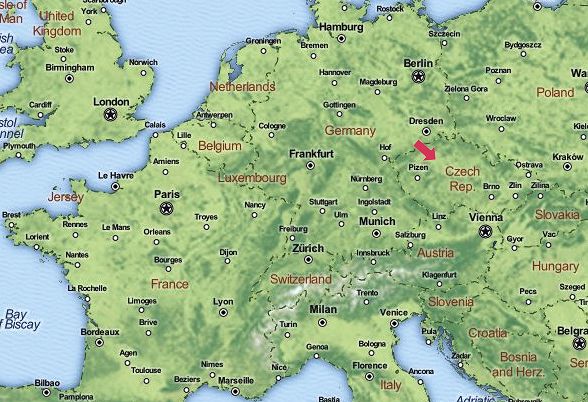
Abb.: Lage von Prag (Tschechien)
[Bildquelle: OpenStreetMap. --
Creative
Commons Lizenz (Namensnennung, share alike)]
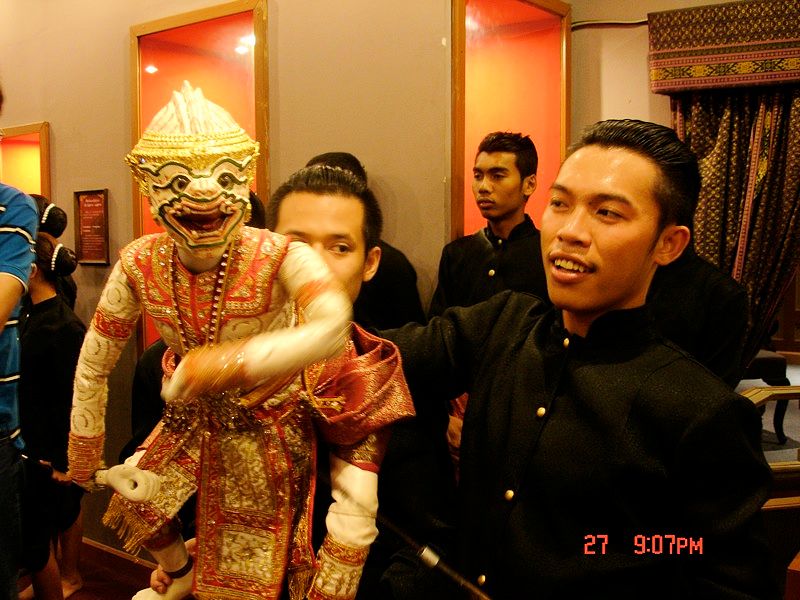
Abb.: Hanuman, Thai Puppet Theatre Joe Louis -
นาฏยศาลาหุ่นละครเล็ก (โจหลุยส์), 2007
[Bildquelle: Jose Luis Olivares. --
http://www.flickr.com/photos/jogs6000/2167071115/. -- Zugriff am
2012-01-08. --
Creative Commons Lizenz (Namensnennung, keine kommerzielle Nutzung,
share alike)]
2006-06-12


The Christian Science Monitor (USA): The King and
Thai / von Simon Montalake
| "But,
while King Bhumibol's public appearances grow fewer, his cult of
personality is undiminished. Elsewhere, this might be called
propaganda. But Thais universally see it differently. "The king does
everything for us. He really loves Thailand and his citizens," waxes
Anavach Ongvasith [อนวัช องค์วาสิฎฐ์],
an executive at Major Cineplex.
Last year, Major Cineplex asked director Rashane
Limtrakul [ราเชนทร์ ลิ้มตระกูล, 1968 - ] to produce a new
presidential salute. His lavish minute-plus film is about a Buddhist
king rescued from stormy seas by a goddess. "I wanted to make people
remember why you stand up [for the king at theaters]," he explains.
Instead of ending on the customary image of the king, the film shows
the royal family, with the crown prince in a prominent position.
A subtle way of preparing
moviegoers for the inevitable royal succession? No, says Mr.
Anavach: "We try to remind people to love the royal family. It's not
only the king.""
|
2006-06-15
Terroristen lassen an verschiedenen Orten der
südlichsten Provinzen gleichzeitig 50 Bomben explodieren. Dabei werden
mindesten drei Personen getötet und sehr viele verletzt.
2006-06-19
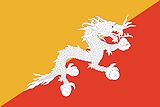
Der Kronprinz Bhutans, Jigme Khesar Namgyel Wangchuk
(འཇིགས་མེད་གེ་སར་རྣམ་རྒྱལ་དབང་ཕྱུག་,
1980 - ), bezaubert die Thai-Frauen. Der Prinz kam nach Thailand zu
den Feierlichkeiten des 60jährigen Kronjubiläums des Königs.
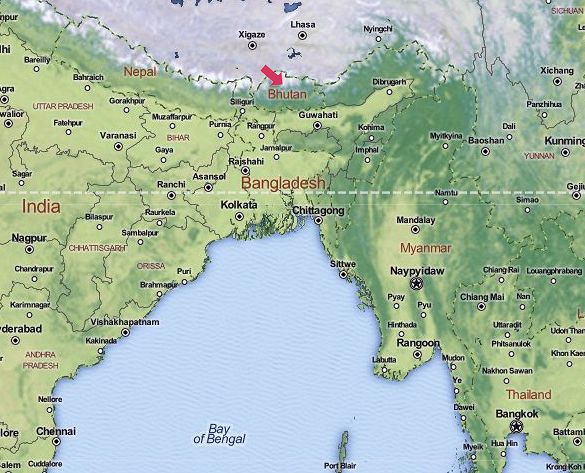
Abb.: Lage von Bhutan
[Bildquelle: OpenStreetMap. --
Creative
Commons Lizenz (Namensnennung, share alike)]
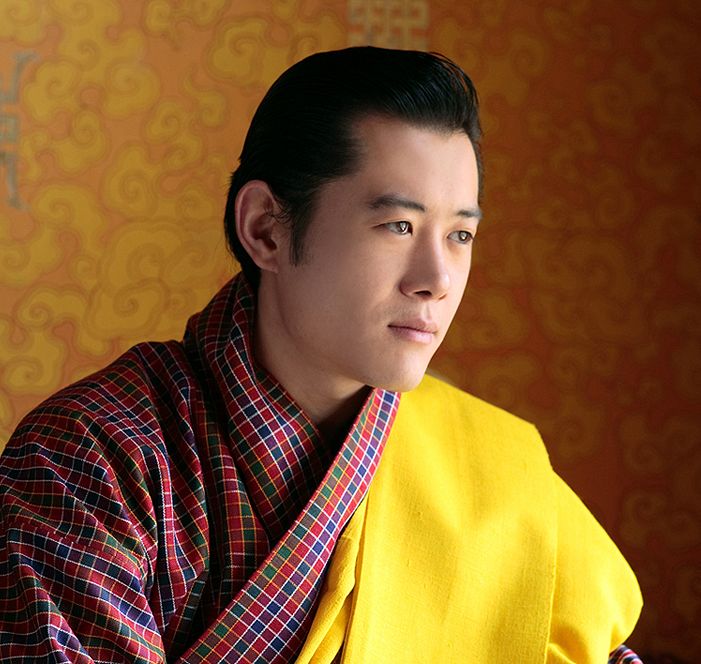
Abb.: Lässt Thailands Frauenherzen höher schlagen: Jigme Khesar Namgyel
Wangchuk (འཇིགས་མེད་གེ་སར་རྣམ་རྒྱལ་དབང་ཕྱུག)
[Bildquelle: Royal Family of Bhutan /Wikimedia. --
Creative
Commons Lizenz (Namensnennung, share alike)]
2006-06-20

Seine Majestät, der König erhält aus der Hand seiner Majestät, König Carl
XVI. Gustaf Folke Hubertus Bernadotte von Schweden, Ehrenpräsident der World
Scout Foundation, den "Bronze Wolf for outstanding services to the
Scout Movement".
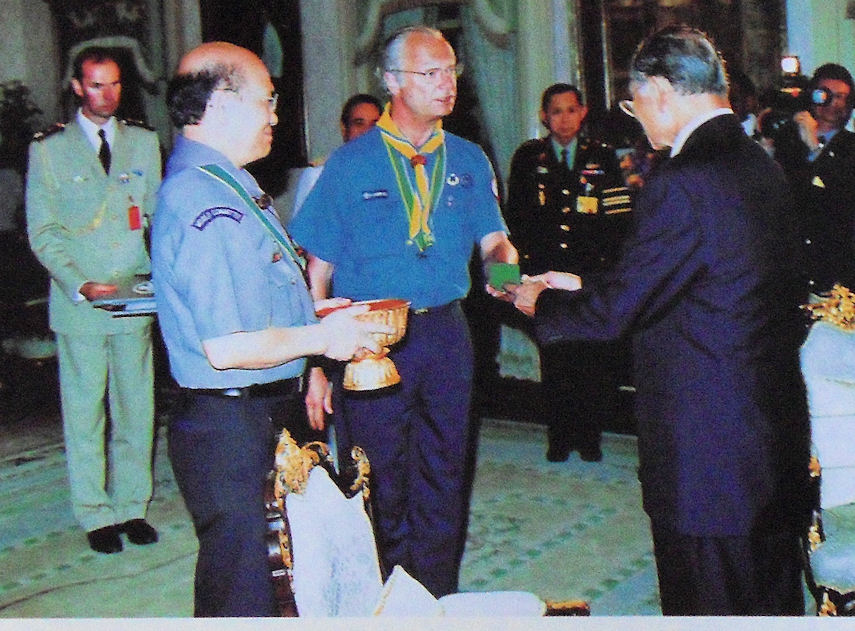
Abb.: Seine Majestät, König Carl XVI. Gustaf Folke Hubertus Bernadotte von
Schweden, überreicht Seiner Majestät,
พระบาทสมเด็จพระปรมินทรมหาภูมิพลอดุลยเดช สยามินทราธิราช บรมนาถบพิตร, den
Bronze Wolf, 2006-06-20
2006-06-25
Es erscheint:
Prem disagrees with proposed use of Malay as
official language. -- In: The Nation <Bangkok>. -- 2006-06-25
"President of the Privy Council [คณะองคมนตรีไทย]
General Prem Tinsulanonda [เปรม
ติณสูลานนท์, 1920 - ]
Sunday said he disagreed with a
suggestion made by the now defunct National Reconciliation
Commission (NRC) [คณะกรรมการอิสระเพื่อความสมานฉันท์แห่งชาติ
(กอส.)] to have Malay
as an additional working language in the deep South.
"We cannot accept that
[proposal] as we are Thai. The country is Thai and the language
is Thai. So we have to make efforts to learn Thai and [everyone
should have a uniform] command with the rest of the Kingdom," he
said.
Prem who was the
architects of a anti-violent policy in the South during his term as
prime minister from 1980 to 1988, was in Pattani Sunday to meet
religious and community leaders as well as Muslim youths as part of
a programme to bring peace to the area.
"We have to be proud
to be Thai and have the Thai language as the sole national
language,"
Prem told locals at the
gathering.
The NRC, chaired by former
prime minister Anand Panyarachun [อานันท์
ปันยารชุน, 1932 -
], had proposed in its final report that was
submitted to government on June 5 that using Malay as a working
language could help to reconcile people in the region, the majority
of whom are ethnic Malay.
The commission also
proposed that the army to install an "unarmed unit" to use peaceful
methods to contain violence and pursue "dialogue" with militants
that had sparked a wave of violence since the start of 2004."
[Quelle:
http://www.nationmultimedia.com/2006/06/25/headlines/headlines_30007268.php.
-- Zugriff am 2016-03-16. -- Fair use] |
2006-06-26
Premiere des Films Khan Kluay (ก้านกล้วย)
von Kantana Animation (กันตนา แอนิเมชั่น). Es ist
der erste computer-animierte 3-D Thai-Film.
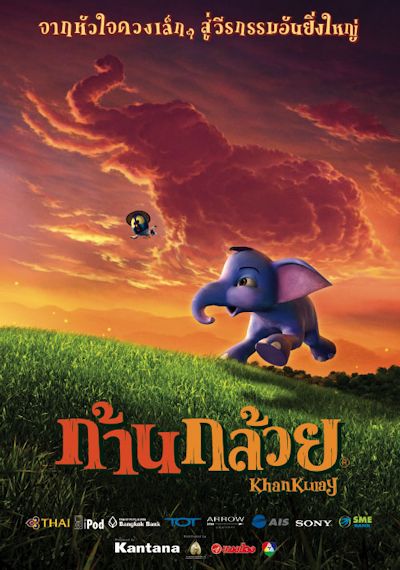
Abb.: Plakat
[Bildquelle: Wikipedia. -- Fair use]
| "Khan Kluay (Thai:
ก้านกล้วย; RTGS:
Kan Kluai; pronounced [kâːn
klûai]) is a 2006 Thai computer-animated feature film set during
Ayutthaya-era (อาณาจักรอยุธยา) Siam about an elephant who wanders away from his mother and
eventually becomes the war elephant for King Naresuan (สมเด็จพระนเรศวรมหาราช). It is based on "Chao
Praya Prab Hongsawadee" (เจ้าพระยาปราบหงสาวดี) by Ariya Jintapanichkarn.
It was officially released as Jumbo in
India and The Blue Elephant in the United States.
There is a sequel to this movie, known as "Khan Kluay
2" This movie is about Khan
Kluay's two elephant children, another attack by the Hongsawadi (Burmese),
and struggling whether to live with his wife or fight the Burmese.
Plot
When Khan Kluay is born, his grandmother notes that his
back is "gently sloped like a banana stalk...I suppose that is what I should
name you: 'Khan Kluay'". Khan Kluay is Thai for "banana stalk".
As a young elephant, Khan Kluay is taunted by the
other elephants because he is fatherless. Naturally, Khan Kluay is curious
about his father, and he's told that his father is a war elephant for the
king.
Because of this, Khan Kluay wants to find his father.
As he was still a young elephant, he wanders off to begin his search. He is
soon captured by a Burmese raiding party. In trying to escape from the
Burmese camp, the young elephant is befriended by a Siamese boy prince,
Naresuan, who has been ransomed to the Burmese. Naresuan has the ability to
calm Khan Kluay into thinking clearly, and Khan Kluay makes his escape.
A weakened Khan Kluay then comes upon a village where
humans and elephants are working together. He is befriended by a young
female elephant, Chaba-Kaew, but is then chained up until he is tamed. Khan
Kluay soon learns to value the humans who have captured him. Under the
training of a wise, old mahout, he becomes bigger and stronger.
A local warlord comes around annually to collect taxes
from the village, and his taxes have become greedier and heavier each year.
The village rebels, and with the humans and elephants working together, the
warlord and his beasts are defeated.
The call then goes out from the king of Siam for
elephants. Khan Kluay is taken to the palace. There, he is seen by his
mother, who calls out to him. Khan Kluay goes wild in trying to break free
from his chains to meet his mother. Naresuan notices this, and remembers
that he is Khan Kluay from his boyhood. The king is able to calm Khan Kluay,
and from then on Khan Kluay serves as the personal war elephant of the king.
In battle, Khan Kluay meets a giant Burmese war
elephant with fiery eyes, who was responsible for the death of Khan Kluay's
father, and due to this, Khan Kluay gets a chance to acquit himself in
battle for the glory of the Siamese kingdom, and to take his revenge.
In the end, Khan Kluay avenges for his father and
kills the Burmese elephant. After that, Khan Kluay is released to the wild
to spend the rest of his life with his loved ones, until the Burmese
return...
Voice
cast
Production
Khan Kluay is directed by Kompin Kemgumnird (คมภิญญ์
เข็มกำเนิด, 1965 - ), an
animator who had worked on the Disney features as The Lion King,
Atlantis: The Lost Empire, and Tarzan, and Blue Sky Studios'
Ice Age.
Produced by Kantana Animation
(กันตนา แอนิเมชั่น), it was the first Thai
3-D animated feature film to be released, and was also the first animated
Thai feature to be released since 1979's The Adventure of Sudsakorn (สุดสาคร),
a cel-animated film by Payut Ngaokrachang (ปยุต
เงากระจ่าง, 1929 - 2010).
Khan Kluay took three years to make and cost
150 million baht (about $3.9 million USD).
Release
Khan Kluay was released in Thai cinemas on May 18,
2006. It was the highest-grossing Thai film of 2006, taking in approximately
91 million baht at the box office.
The movie was shown to an audience of Asian elephants
and their mahouts in an outdoor screening in Ayutthaya Province on June 6,
2006.
It was released in September 2008 on DVD in the United
States as The Blue Elephant.
Indian production company Percept Picture Company
bought the rights to the film and released a Hindi-language version,
Jumbo, on December 25, 2008. Indian actor Akshay Kumar provided the
voice for the main character, Jumbo.[3]
Festivals
and awards
- 2006 Thailand National Film Association Awards
(รางวัลภาพยนตร์แห่งชาติ สุพรรณหงส์ หรือ
รางวัลภาพยนตร์แห่งชาติ)
- Best picture
- Best script
- Best score
- Best sound recording
- 2006 Golden Doll Awards
- Best score
- Best sound recording
- 2006 Bangkok Critics Assembly
- 2006 Starpics Awards
- 2006 Star Entertainment Awards
- 2006 Animadrid, International Animation Festival,
Spain
- 2007 Sprockets Toronto International Film
Festival for Children
- 2007 Golden Elephant International Children's
Film Festival
American
releaseThe film was released in the US on
September 2, 2008, under the Jim Henson Company and The Weinstein Company
name. Like other foreign animated films like My Neighbor Totoro, Kiki's
Delivery Service and many others, this was released as a direct to video
film. The film was also renamed The Blue Elephant for its American
release. The film was also redubbed with celebrity voice overs, including
Martin Short, Miranda Cosgrove, and Carl Reiner.
Indian
releaseThe film released in India on
December 25, 2008, under the banner of The Percept Picture Company. It was
renamed Jumbo, and was redubbed with a voice cast inclusive of Akshay
Kumar (अक्षय कुमार), and Rajpal Yadav
(राजपाल यादव).
Malaysian
releaseThe film's sequel, Khan Kluay II is
named as Jumbo Gajah Biru and it is distributed and dubbed by Astro
Entertainment Sdn. Bhd. It premiered in Malaysian cinemas on March 11, 2010.
Television
seriesAn animated television series, The
Adventures of Khan Kluay, has been created by Kantana Animation Studio
and is broadcast on BBTV Channel 7 (สถานีโทรทัศน์สีกองทัพบกช่อง
7)."
[Quelle:
http://en.wikipedia.org/wiki/Khan_Kluay. -- Zugriff am
2012-01-08] |
2006-06-27

Das Parlament Vietnams wählt Nguyễn Minh Triết (1942 - ) zum
Staatspräsidenten. Dieser bestimmt dann Nguyễn Tấn Dũng (1949 - ) zum
Premierminister.
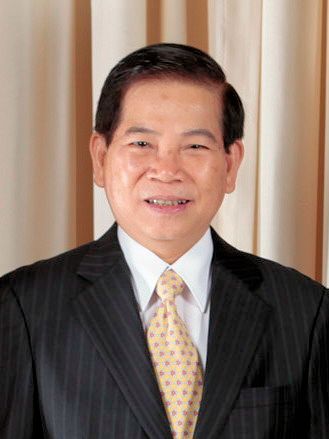
Abb.: Nguyễn Minh Triết
[Bildquelle: Official White House Photo by Lawrence Jackson / Wikipedia. --
Public domain]
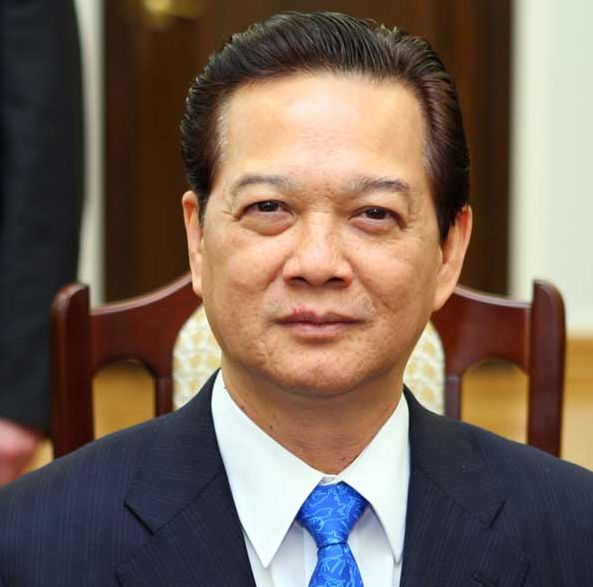
Abb.: Nguyễn Tấn Dũng, 2007
[Bildquelle: Senat RP / Polish Senate / Wikipedia. -- GNU FDLicense]
Verwendete Ressourcen
ausführlich:
http://www.payer.de/thailandchronik/ressourcen.htm
Zu Chronik 2006 / B. E. 2549. --
3. Juli bis Dezember
































 จาบจ้วงราชา
จาบจ้วงราชา 































































 His
Majesty sets himself as a model in following strictly the Ten
Guiding Principles for a King. The Office of the Civil Service
Commission has compiled the principles adhered to by His Majesty
the King for government officials to follow in their capacity as
the ones who serve the king, and for people of all professions
and all walks of life to follow in the royal footsteps.
His
Majesty sets himself as a model in following strictly the Ten
Guiding Principles for a King. The Office of the Civil Service
Commission has compiled the principles adhered to by His Majesty
the King for government officials to follow in their capacity as
the ones who serve the king, and for people of all professions
and all walks of life to follow in the royal footsteps. 









